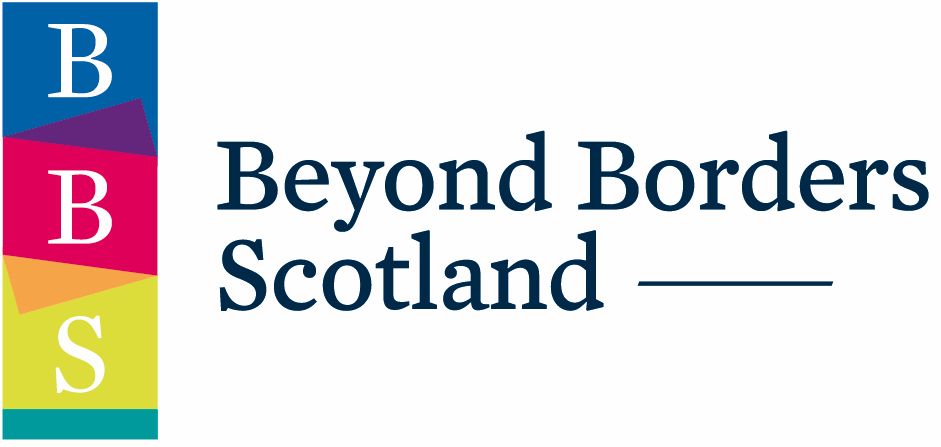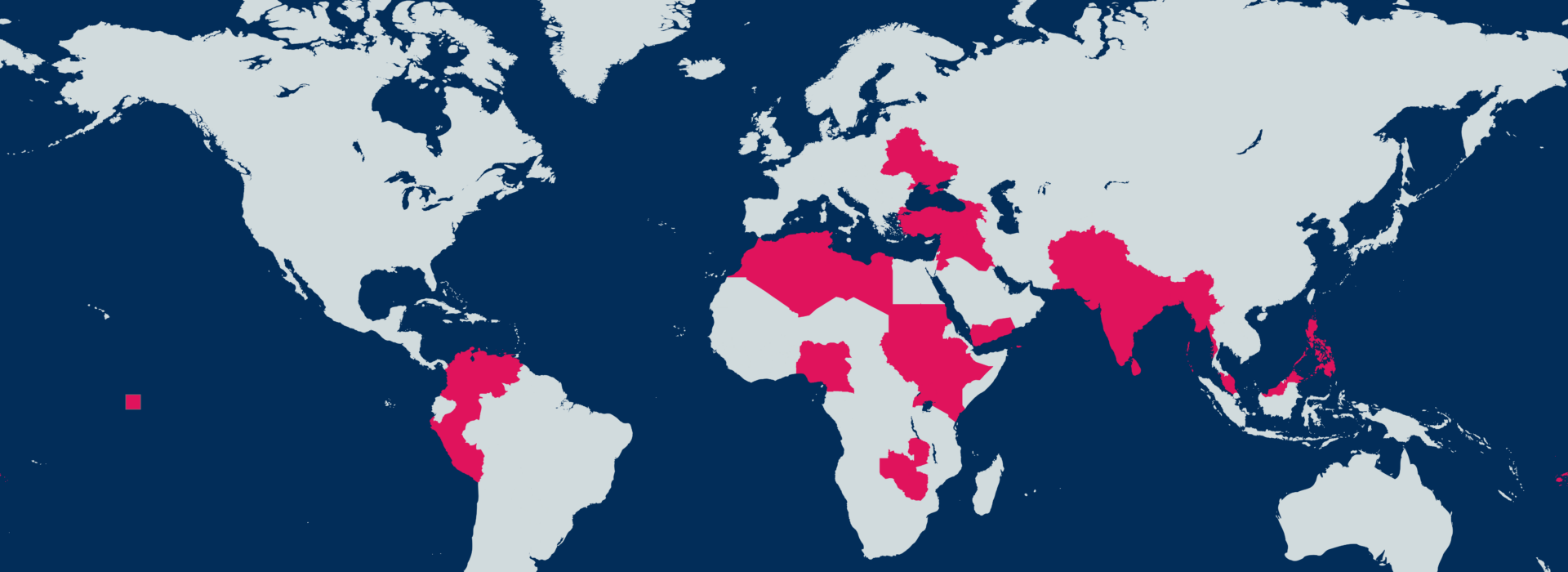
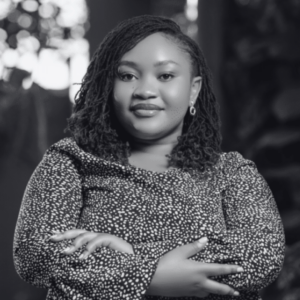
Memory Tapela Banda
Memory Tapela Banda, is a 25 year old dynamic young leader and humanitarian, is blazing a trail in the promotion of peace, security, and human rights in Zambia. From her work as the founder of The Zambian Albinism Matters Organization (ZAMO), to her advocacy for the rights of people with disabilities as a SADC youth parliamentarian, Memory has demonstrated a deep commitment to creating a more equal and just society.
She earned a diploma as a Mathematics Teacher and is currently furthering her studies in the University of Zambia. She is certified in Conflict management, Youth Peace and Security, Public management and Governance, Public Policy, Diplomacy and International Relations and Disability advocacy. As an award-winning human rights defender and child safety expert, Memory has championed the rights of children,girls and women with disabilities and other marginalised communities. Her efforts to plan educational events and awareness campaigns that highlight the potential of people with disabilities have fostered empathy and promoted a more inclusive society. Memory’s vision is to empower marginalised voices and groups, ensuring that they receive quality education, access to resources, and the support they need to thrive.
In addition to her work as a SADC youth parliamentarian, Memory is also a member of the United Network Of Young Peace Builder (UNOY) ,Global Partnership For Education (GPE) Youth Leader and the country representative Director for Social Gender Protection at the Africa Union for Persons with Albinism (AUPA). Memory’s dedication to human rights and peacebuilding is motivated by her own experiences as a young woman in Zambia. She has encountered challenges and hardships, including sexual harassment and threats, but these obstacles have only strengthened her resolve to create a more peaceful and just world. As a leader, Memory is committed to using her voice and platform to advocate for the rights and dignity of all people, especially those who are marginalised and vulnerable. Her work is a testament to the power of determination and resilience in the face of adversity.
As she continues to make strides in her field, Memory remains dedicated to her mission of advancing peace, security, and human rights in Zambia and beyond.
Participant in: October 2024 Fellowship: Peacebuilding and Women’s Meaningful Participation in Peacebuilding Processes
Safa Al-Humaidi
Safa Al-Humaidi brings firsthand experience of the challenges women face in traditional, conflict-affected communities. Her childhood was marked by violence and the struggle for basic rights, including education. After overcoming family resistance, she became the first in her family to attend university, earning her Bachelors in Computer Science from the University of Modern Science, despite enduring an arranged marriage and significant personal loss.
Safa’s journey led her to work with UNICEF during the 2015 conflict, where she currently works as a Programme Assistant at the Sana’a Field Office. In her work, she witnessed the disproportionate impact of war on women and children. These experiences deepened her understanding of the vital role women play in community resilience and peace-building. She is passionate about advocating for policies that empower women in conflict resolution processes.
Participant in: October 2024 Fellowship: Peacebuilding and Women’s Meaningful Participation in Peacebuilding Processes
Alba Purroy
Alba Purroy, is a Venezuelan social activist and peacebuilder. Her focus is on supporting the strengthening of Venezuelan women at grassroots level to promote their representation where decisions are taken, and their contribution to conflict resolution, reconciliation and reconstruction of social fabric. She is currently a team member of the United States Institute of Peace, Nonviolent Action group as part of the Synergizing Nonviolent Action and Peacebuilding (SNAP) facilitator network in Venezuela. She has created a special seven-part Women Peace and Security curriculum tailored to the Venezuelan context. They conducted a train-the-trainers workshop in April 2023, developing 12 WPS trainings achieving around 240 women in 6 different regions across Venezuela.
Alba has been trained with the International Center for Nonviolent Conflict (ICNC), with the United States Institute of Peace (USIP) and with the Center for Justice and Peacebuilding (CJP) of Mennonite University in Virginia US on issues of Nonviolent Strategic Action, Peacebuilding and Conflict Resolution. More recently, she received a Professional Development Certificate in Peace and Conflict Resolution from Chulalongkorn University in Thailand as a part of Rotary Peace fellowship award. She was awarded last May with the John Lewis Peace fellowship from the United States Institute of Peace.
Participant in: October 2024 Fellowship: Peacebuilding and Women’s Meaningful Participation in Peacebuilding Processes
Sahar Ammar
Sahar Ammar is a Program Officer at Swisspeace and a mediation practitioner with a primary focus on the MENA region. She supports local peacebuilding initiatives, including women-led coalitions and women mediators, by offering capacity-building in mediation, negotiation, dealing with the past, and providing strategic thematic advice to key local actors. Additionally, Sahar collaborates with UN agencies to foster inclusive consultations and dialogue, particularly engaging women and marginalised groups from conflict-affected areas.
Before joining Swisspeace, Sahar worked with the Centre for Humanitarian Dialogue (HD Centre) as a mediation practitioner specialising in the MENA region. She has facilitated and supported a wide range of multi-track negotiation processes, including high-level Track One negotiations on political power-sharing and ceasefire agreements. Sahar has also facilitated mediation and dialogue processes with women across diverse political divides.
Participant in: October 2024 Fellowship: Peacebuilding and Women’s Meaningful Participation in Peacebuilding Processes
Danyah Ghazi
Danyah Ghazi is a skilled individual with over five years of experience as a Project Support Assistant with UNDP Syria. Her work with UNDP includes work on the Context Sensitivity Team (CST), Social and Environmental Safeguards, the Early Recovery and Livelihood Sector, and the Japan Donor Focal Point Team. Danyah’s experience covers a range of areas including administrative support, gender and conflict sensitivity, and early recovery. She has also done translation work with Mashrou Wa Nabqa and Insticitif Partners. Danyah holds a bachelor’s degree in Translation and Interpretation from the University of Damascus.
Danyah’s work experience focuses on conflict and gender sensitive project implementation, early recovery and peacebuilding, and accountability to affected populations.
Participant in: October 2024 Fellowship: Peacebuilding and Women’s Meaningful Participation in Peacebuilding Processes
Fatma Alahmad
Fatma Alahmad is a humanitarian professional and researcher specialising in women’s empowerment, peacebuilding, and conflict resolution in Syria. She currently works with Dar and INSIGHT TRACK Research and Consulting. As a Project Manager and Researcher, she has led numerous initiatives focused on gender dynamics, community leadership, and enhancing women’s participation in decision-making processes. Fatma’s work includes conducting needs assessments, developing strategies for women’s involvement in peacebuilding, and empowering activists through projects like the Agora Project and the Voices of Women Initiative. With extensive experience in conflict zones and a deep commitment to UNSCR 1325, she advocates for gender-responsive governance and sustainable peace. She has worked in various regions of Syria, each under different forms of control, allowing her to navigate complex political and social dynamics in those areas. She holds a Bachelor’s degree in Architecture from Aleppo University and is studying for her Master’s in Post-War/Disaster Reconstruction and Rehabilitation at Ankara Yildirim Bayezid University.
Participant in: October 2024 Fellowship: Peacebuilding and Women’s Meaningful Participation in Peacebuilding Processes
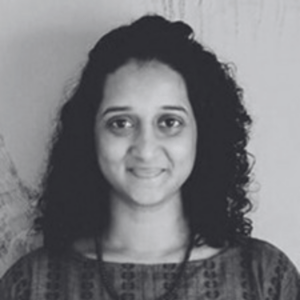
Lihini Warnika Ratwatte
Lihini Ratwatte is an independent researcher and a gender/development practitioner based in Sri Lanka. She is presently the Gender Specialist at the United Nations’ Development Programme (UNDP) Country office in Sri Lanka. Lihini’s work in the development sector ranges from research, policy analysis and advocacy to the practical applications of gender, peace, and security.
Drawing from her professional expertise, Lihini’s research focuses on the intersectional development priorities for conflict-affected women within the broader mandate of the Women, Peace, and Security agenda (UNSCR 1325). Her extensive experience in the development sector allows her to bring an applied lens to this research. In doing so, she examines how UNSCR 1325 can be used to better support women heads of households and conflict affected women. While her research is primarily based in Sri Lanka, she also examines the regional and global implications of UNSCR 1325 and its localised implementation.
Lihini has published her research on gender, peace, and security in several academic blogs and journals including the Journal of International Women’s Studies (JIWS) hosted by Bridgewater State University. She has presented her research on the intersections of gender and peace at international conferences hosted at the Office for National Unity and Reconciliation (ONUR)
in Sri Lanka; the Leiden University (Hague Campus) in the Netherlands; and the University of Lisbon in Portugal. Lihini is also a ‘Salzburg Global Fellow’ at the Asia Peace Innovators’ Forum of the Salzburg Global Seminar (Austria), where she engages with young peace practitioners across Asia.
Lihini holds a Bachelor of Arts (BA) in International Studies, Communications and Gender Studies from Monash University Malaysia (2014); a Master of Arts (MA) in Global Diplomacy from SOAS – University of London, UK (2017), and a Master of Business Administration (MBA) from Cardiff Metropolitan University, UK (2023).
Participant in: October 2024 Fellowship: Peacebuilding and Women’s Meaningful Participation in Peacebuilding Processes
Jamila-Aisha Sanguila
Jamila-Aisha P. Sanguila is a local peacebuilder with more than twenty years of experience in gender advocacy, community engagement, and education on the history of Mindanao in areas affected by conflict, especially in Mindanao, Philippines. Raised amidst conflict and displacement, including the all-out war in March 2000 and the armed conflict in 2008 in her hometown, she was motivated to collaborate with other survivors and commit to peacebuilding and the empowerment of women. Her interreligious background further strengthens her dedication to culturally sensitive and community-focused peacebuilding efforts.
Her work is dedicated to promoting the Women, Peace, and Security (WPS) agenda across academia, grassroots initiatives, and international platforms. As a former faculty member at Mindanao State University-Main campus and a project manager for the Transitional Justice and Reconciliation Commission under the Comprehensive Agreement on the Bangsamoro, Jamila has woven Mindanao history, interreligious dialogue, peace education, and transitional justice into the fabric of academic discourse. In parallel, she has spearheaded grassroots movements to mitigate conflict and advance gender equality.
In 2018, she founded the Women Empowered to Act for Dialogue and Peace (WE Act), an organisation committed to aiding communities affected by the 2017 Marawi siege. Her leadership has steered WE Act towards enhancing the involvement of women in peace initiatives, promoting dialogue, and facilitating trauma-informed sessions, showcasing her profound dedication to empowering women and local peacebuilders. She is committed to creating innovative approaches for gender-inclusive policies, encouraging women’s participation in peace processes, and strengthening community-led efforts in Mindanao and elsewhere.
Jamila’s engagement with international platforms, such as the Salzburg Global Seminar’s Asia Peace Innovators Forum funded by The Nippon Foundation, has expanded her peacebuilding perspective. Consequently, she has spearheaded initiatives like the Kababaihan Kapit-bisig para sa Kapayapaan in the Bangsamoro Autonomous Region in Muslim Mindanao (K-BARMM) and “Peace to Peacebuilders (P2P): Strengthening Peacebuilders’ Resilience in Crisis Situations” throughout Asia. Additionally, she is a co-creator of the Peace Starts Here campaign, which supports and encourages locally-led peacebuilding efforts globally.
Jamila has earned a master’s degree in Gender and Peace Building from the UN-Mandated University for Peace in Costa Rica, as well as a master’s degree in History (CAR) from Mindanao State University-Main campus in the Philippines.
Participant in: October 2024 Fellowship: Peacebuilding and Women’s Meaningful Participation in Peacebuilding Processes
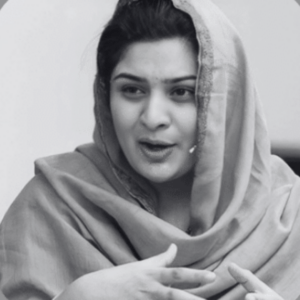
Hadiqa Bashir
Hadiqa Bashir is a 22-year-old activist and feminist from Swat Valley, Pakistan, recognized for her advocacy in girls’ education, human rights, and peacebuilding. She is a survivor of child marriage and has made a significant impact by raising awareness about the struggles of girls and women in conflict-affected regions, particularly in areas once under Taliban control. Hadiqa’s leadership is evident in the historic girls-led peace walk in Swat, which challenged the Taliban’s restrictions on girls’ education, sending a powerful message of resilience. Her efforts have been acknowledged globally, earning her a place as a United Nations SDG Young Leader in 2020.
As the Founder and Executive Director of Girls United for Human Rights (GUHR), Hadiqa’s work focuses on empowering young women in peace and conflict resolution, especially through the “Girls’ Role in Conflict Resolution” campaign. She actively promotes women’s inclusion in peace processes, particularly in regions like Khyber Pakhtunkhwa, where extremism remains a threat. Her work reflects her commitment to ensuring that women’s voices are integral to global peace and security dialogues, pushing for lasting solutions in conflict zones worldwide.
Participant in: October 2024 Fellowship: Peacebuilding and Women’s Meaningful Participation in Peacebuilding Processes
Esther George
Esther George is a committed gender and peacebuilding advocate. She actively engages with local authorities, community leaders, and civil society organisations to promote peacebuilding efforts, with a focus on enhancing women and youth participation in conflict resolution and mediation. She is the Local Government focal point for the Kaduna State Women Mediators Network by Rule of Law and Empowerment Initiative. Her project is focused on Strengthening State and Local Level Peace Architecture for Peacebuilding and Prevention in Kaduna and Katsina State. She holds a Bachelor’s degree from Nasarawa State University and is currently studying for her Masters in International Relations.
She contributes to the development and implementation of community-driven solutions to improve access to justice and protection for marginalised communities. She works on programmatic design and implementation of the Women, Peace, and Security (WPS) agenda in local Communities.
Participant in: October 2024 Fellowship: Peacebuilding and Women’s Meaningful Participation in Peacebuilding Processes
Khin Thet San
Khin Thet San is a peace, justice, and human rights educator with a background in promoting good governance and democracy. Originally from Myanmar, Khin pursued an M.A. in Human Rights and Cultural Diversity at the University of Essex, funded by the Open Society Foundation. Prior to this, she worked extensively with international NGOs, local NGOs, and civil society organisations in Myanmar, focusing on peacebuilding, justice, and human rights initiatives. Her work involved collaborating with grassroots communities to promote conflict resolution, transitional justice, and human rights education in regions affected by violence and oppression. With the support of CARA, she secured a fellowship at SOAS, University of London, and is now pursuing a PhD at Goldsmiths, University of London. Her PHd research is titled Religious Nationalism and the Notion of Human Rights in Myanmar.
In addition to her academic work, Khin volunteers as an educator, teaching Peace and Conflict Studies, Political Science, and International Human Rights Law to young people in Myanmar who have been deprived of education due to military repression. She also provides education on gender, human rights, and women’s leadership to Buddhist nuns, empowering them to take on more active roles in their communities. Her research focuses on human rights violations and the fight for democracy in Myanmar, contributing to global efforts to raise awareness and document abuses under the military regime.
Participant in: October 2024 Fellowship: Peacebuilding and Women’s Meaningful Participation in Peacebuilding Processes
Tara Mohammed Abdalla
As the Director of the Labor and Vocational Training Directorate in Halabja, Kurdistan, Tara Mohammed Abdalla has dedicated her efforts to empowering women and youth in a region heavily impacted by conflict. Recently, she worked on a project with the GIZ organisation, where they successfully employed 26 out of 38 women who completed three distinct vocational training courses. These programs are designed to equip women with essential skills for the job market, supporting their financial independence and contributing to community recovery. Her role also involves managing partnerships with over 50 local businesses and NGOs to align our training programs with local job demands and ensure successful job placements.
In addition to vocational training, she has led initiatives to support women entrepreneurs through grants, mentorship, and business development resources. This experience has given her a deep understanding of the challenges and opportunities for women in conflict zones.
Participant in: October 2024 Fellowship: Peacebuilding and Women’s Meaningful Participation in Peacebuilding Processes
Catalina Gil Pinzón
Catalina Gil Pinzón is a Latina woman with over 12 years of experience in program management in the peacebuilding and security fields. Catalina’s work spans various areas, including drug and security policies, police reform, youth violence prevention, innovative memory processes with victims of conflict, and disarmament, demobilisation, and reintegration of ex-combatants (DDR). Her work emphasises exploring new narratives and incorporating gender perspectives as a way of driving change towards diversity and inclusion in these sectors. She has collaborated and been part of teams within the Colombian government, international foundations, civil society organisations, and multilateral organisations.
Additionally, Catalina independently leads and promotes initiatives to facilitate strategic spaces for dialogue, promoting new voices and leadership (especially of women) and approaches to security. These efforts aim to counteract the resurgence of militarised and punitive perspectives in Latin America, thereby supporting and strengthening democratic and pluralistic approaches to governance in the region. She regularly contributes opinion articles on drug policy, security and gender to various national and international media outlets. She writes frequently for El País and has also been published in El Espectador, Washington Post en Español, and Agenda Pública.
Participant in: October 2024 Fellowship: Peacebuilding and Women’s Meaningful Participation in Peacebuilding Processes
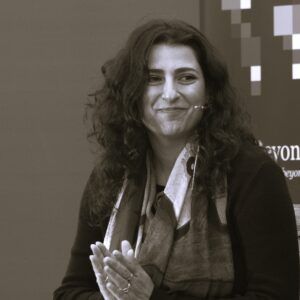
Sonya Armaghanyan
Sonya Armaghanyan is a humanitarian worker, community engagement specialist, and a theatre practitioner. Her work focuses on creating spaces of encounter and humanising ‘the other’ by exploring the world from the point of view of the collective and of cultural richness. She is currently working with the Mental Health and Psychological Support Programme for the UN International Organisation for Migration (IOM) and is based in L’viv, Western Ukraine. In the past five years she has worked across programmes focusing on the areas of peacebuilding, social cohesion, and community-based mental health and psychosocial support.
Sonya specialises in theatre and storytelling and, as part of her work, she uses art-based approaches as a process for community engagement and facilitation of a space where affected communities can share their thoughts and express their feelings in times of crises, regain sense of normalcy, re-establish their sense of belonging, explore their collective identity and strengthen their communal social links. Sonya is the recipient of the Swiss Humanitarian Award 2018 for her research paper “Theatre as Psychosocial Approach in Humanitarian Settings.” She is a Fellow with the Laboratory for Global Performance and Politics at Georgetown University. In 2023, Sonya was nominated for the Gilder/Coigney International Theatre Award.
Participant in: August 2024 Fellowship: The Arts as a Tool for Peacebuilding
Kseniya Angelova
Kseniya ‘Xisha’ Angelova is a Belarusian artist. Since 2021, she has pursued the project ‘Belarusian Martyrology.’ Initially it was Xisha’s attempt to take the baton from the artist who was brutally murdered in his courtyard in Minsk. His portrait was the first she painted. Then the list began to grow. She is an icon painter. Since she has been painting, Xisha thinks of a deep attention that should not end. Paying attention to prisoners is not only a desire to support the prisoners and their families, but also to pay attention to the mountainous repression in the centre of Europe. If she remains silent, she will be betraying something important to her and to those behind bars.
Xisha only has time to paint portraits, and she doesn’t feel it is an artistic sacrifice. She can’t accept conformism in art, it’s like an untruth, it closes her off to the perception of such art, which seeks its own benefits or adapts itself.
Participant in: August 2024 Fellowship: The Arts as a Tool for Peacebuilding
Diksha Poddar
Diksha Poddar holds over 10 years experience working at the praxis of grassroots peacebuilding, gender and development in South Asia. She is currently a Research Scholar at the Centre for South Asian Studies, School of International Studies at Jawaharlal Nehru University, New Delhi, where she is studying the processes of narrativization around youth, peacebuilding and arts in South Asia for her PhD thesis. Diksha is associated with WISCOMP (Women in Security, Conflict Management and Peace), an initiative of the Foundation for Universal Responsibility of His Holiness the Dalai Lama, New Delhi, as a Consultant. At WISCOMP, she engages with their initiatives on women, peace and security in South Asia and youth countering violent extremism where she designs and facilitates workshops and discussions with women and youth in conflict through art. Currently, she is leading an award program on women building peace at the grassroots in South Asia. As a scholar-practitioner, Diksha explores creative solutions to peacebuilding with women and youth at its core and, therefore, uses innovative methodologies to produce creative outputs in the form of online portals, webpages, coffee-table compendiums and multimedia presentations. Diksha has also published widely on issues of women, youth, peace and security.
Participant in: August 2024 Fellowship: The Arts as a Tool for Peacebuilding
Insha Qayoom Shah
Insha Qayoom Shah is a dedicated advocate for women’s involvement in peacebuilding and conflict resolution, with a particular focus on conflict zones such as her home region of Kashmir. She actively works with the Umran Green Perspective Foundation, where she implements initiatives to empower women and foster community resilience through art and creative expression. Insha’s academic background further supports her dedication to this cause. She is pursuing my PhD research which examines the marginalisation of women in classical myths, especially in the context of mythological battles. This in-depth research has sparked a significant interest in the intersection of women and conflict, providing valuable insights that she applies to contemporary issues in my region.
In addition to her academic and professional work, Insha writes poetry that revolves around the struggles and resilience of women, particularly those in conflict zones. Furthermore, she is working on an independent research paper which explores the survival strategies employed by women amid conflict, focusing on how creative endeavours such as needlework, weaving, painting, and writing help them cope with trauma. She also writes for Feminism in India, an intersectional feminist media platform, to highlight specific challenges confronting women in India and Kashmir, leveraging her platform to draw attention to their hardships and strength. Additionally, Insha assists her artist father in organising exhibitions and collaborating with him to create paintings on women-related issues. Given his language barrier, they look for opportunities to underscore the value of art as a survival tactic in combat settings. They often work together on the same canvas to produce meaningful art. Insha firmly believes in the transformative power of artistic expressions as tools for peacebuilding, justice, and gender equality. Art serves as both a psychological retreat and a practical strategy for survival and empowerment, transforming suffering into resilience.
Participant in: August 2024 Fellowship: The Arts as a Tool for Peacebuilding
Aeiman Rafiq
Aeiman Rafiq is a clinical psychology resident scholar and mental health practitioner (focussing on art and play therapy) from Kashmir. As a survivor of conflict, she is passionate about how story-telling and arts can allow people to narrate conflict, speak their pain, and create a sense of belonging and community. Aeiman is currently studying for a masters in clinical psychology, at the Institute of Mental Health and Neurosciences through which she is providing individual therapy to clinical populations and play-based therapies to children in conflict. She has previous clinical experience from organisations such as FindHope, Headstreams, and working at the Government Medical College in Srinagar, Kashmir.
Aeiman has used art in various forms such as painting, story-telling, body-kinaesthetic as well as her own poetry to speak about conflict, its manifestation in psychological functions, and how art can be used as a tool for liberation.
Participant in: August 2024 Fellowship: The Arts as a Tool for Peacebuilding
Eman Taweel
Eman Taweel has extensive experience in humanitarian and development sectors. She is currently a Community Engagement Officer for the UN’s International Organisation for Migration (IOM) in Libya. She is also the founder of Nafs Mental Health Awareness Arts Project. Prior to this, she has worked at a range of organisations for development and media across Libya and focussing on Libya, including Amideast Tunisia for their Libya projects, and Moomken For Awareness and Media. She holds a Master’s Degree in International Development from the University of East Anglia and is a Chevening Scholar and MEPI Student Leader Alumni.
Eman works, also, as a consultant in the development field advising on peace-building and community work. Having experienced ongoing conflict and worked in displacement camps, she has a direct insight into the challenges women face in such circumstances, and she draws inspiration from them to amplify their voices on a broader scale.
Participant in: August 2024 Fellowship: The Arts as a Tool for Peacebuilding
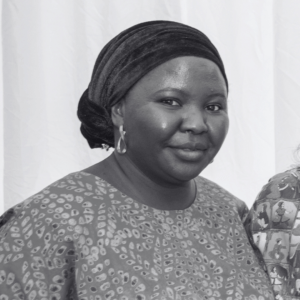
Rabi Adamu Musa
Rabi Adamu Musa has extensive experience as a legal advisor, chief executive, and monitoring and evaluation officer who has advocated for the rights of women and girls, and indigenous communities, throughout Nigeria. She is the founder and CEO of The Mcrissar Foundation for Women and Girls. Based in Southern Kaduna, Nigeria, the Mcrissar Foundation was formed in 2020 and creates safe spaces for young women and girls affected by violence, while fostering harmony between communities through cultural exchange and art projects. She is also the co-founder of the African Young Women Advancement Initiative.
Rabi has collaborated closely with government and civil society organisations in Nigeria to foster peaceful coexistence between indigenous communities, advocate for meaningful political participation of young women, and champion safe spaces for victims of gender-based violence and sexual harassment. She has been a strong proponent for providing free menstrual products to girls aged 12-16 across Nigeria’s North West.
Participant in: August 2024 Fellowship: The Arts as a Tool for Peacebuilding
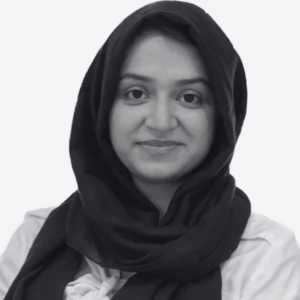
Kashmala Susan Syeda
Kashmala Syeda is an accomplished lawyer, producer, and human rights advocate with a notable track record of championing marginalised communities and advancing social justice. With an LLB (Hons) from the International Islamic University Islamabad and extensive training in documentary filmmaking from the University of Southern California, she blends legal expertise with creative storytelling to drive impactful change.
As the founder of AAIN Foundation, Kashmala has worked tirelessly for the rights of women, youth, children, and transgender individuals, focusing on bridging the gap between justice and marginalised communities. Her legal practice since 2018 has been centred on advocating for fundamental rights and representing clients in district and High courts. Her commitment to human rights is further underscored by her life membership in the Human Rights Commission of Pakistan.
Kashmala’s documentary work vividly portrays the struggles of underrepresented groups, addressing critical issues such as statelessness, forced conversions, climate-induced migration, and the plight of refugees. Notable projects include “Bhashaili – A Drift,” “The Losing Side,” “Naatari,” and “The Colors of Smog.” Her films have been pivotal in raising awareness and driving conversations on these pressing issues.
Her role as a consultant for UNDP Somalia on gender-based violence and various productions further demonstrates her capability to intertwine legal and advocacy work while using the art of documentary filmmaking. Her work for these organisations often focuses on documenting and promoting the rights of vulnerable populations.
In recognition of her contributions, Kashmala has been selected for prestigious global programs. These experiences have enriched her understanding of international human rights frameworks and advocacy strategies. Additionally, Kashmala’s films had screenings and discussions on climate change at the University of Zurich, Switzerland, on statelessness in London, UK showcasing her commitment to addressing local and global challenges.
Participant in: August 2024 Fellowship: The Arts as a Tool for Peacebuilding
Alaa Alsewid
Alaa Alsewid is originally from Syria, and she joined the humanitarian field 10 years ago when she was just 16 years old in 2011 – right when the crisis in her country began. Alaa began volunteering with an NGO to help internally displaced people who fled their homes to seek shelter in schools at that time – they provided food, clothes, and basic education to children. Alaa was really keen to make a difference in her own community, especially in the lives of other young people who had huge ambitions and goals. So she began organising social events to help provide them with opportunities – for example, she led a team of 41 volunteers to organise Startup Weekend Homs, a 54-hour long event where would-be entrepreneurs from all corners of Syria gathered to pitch their businesses. Alaa has also organised a series of TEDx talks! Alaa’s diverse work history includes roles at IFRC as a Communication Delegate (X-media) and an internship with UNHCR’s Social Media Unit. She is currently a Communication Officer with the International Federation of Red Cross and Red Crescent Societies.
Participant in: August 2024 Fellowship: The Arts as a Tool for Peacebuilding
Zain Quaiter
Zain Quaiter grew up surrounded by art, and has used art academically and personally to navigate her identity and experiences of displacement. She is currently the International Programmes Manager for Asia and the Middle East at The King’s Trust International. She recently completed a Masters in Development Studies, where she focussed on two projects, one on memory and collective healing through story-telling, and another on identity and dislocation through painting, using her own body as a canvas. In 2017, she participated in the Arts4Change event in India, where she wrote a song with other fellows about body-image and being a woman.
While in Syria, Zain used art to build community and create a safe space for young people, especially young women. She has also used song to reflect on her experiences and emotions throughout displacement and personal growth, using song-writing as a storytelling tool to regain agency over her memory and story.
Participant in: August 2024 Fellowship: The Arts as a Tool for Peacebuilding
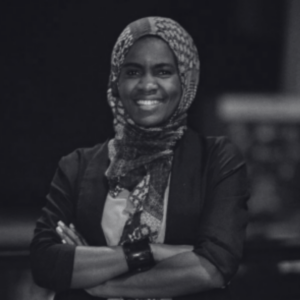
Rashida Namulondo
Rashida Namulondo is the founder of The Sophie Muwanika Institute of art for change, a non-profit organisation that uses theatre for peace building, healing and rehabilitation for victims of trauma. Rashida is also a theatre-practitioner, actress and award-winning performance poet. Over the past eight years, she has dedicated herself to using the arts to promote peace and reconciliation in post conflict communities and communities vulnerable to conflict in Uganda. She is dedicated to building the capacity of communities in using performing arts to advocate for peace, foster collective healing and collective engagement against violent extremism. Examples of her work with the Sophie Muwanika Institute of Art for Change include the ‘Schools Theatre Festival for Peace’ and ‘Our Voices Arts Community Project.’
Participant in: August 2024 Fellowship: The Arts as a Tool for Peacebuilding
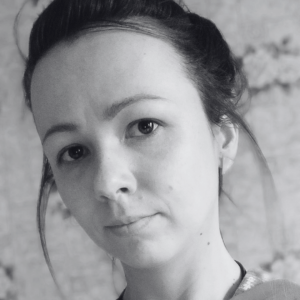
Sofiia Runova
Sofiia Runova is an illustrator, graphic story-teller, and designer from Ukraine. She has a wealth of experience creating graphic novels on topics related to war, conflict, and refugees as well as working in collaboration with journalists and citizens to help them express and share their stories. In 2023,
In 2023 as an Artist and Designer Sofiia participated in the project “To tell OUR story”, organised by “Libereco – Partnership for human rights”, “East SOS” and “Gustav Stresemann Institut in Niedersachsen e.V.”. One of the project results is a graphic novel that tells 16 stories of young adults from Iran, Irak, Syria, Ukraine and Afghanistan who faced refuge due to war. She illustrated their stories trying to make them as individual as she could, in close cooperation with authors. Main aim of the project was to give them space to tell their stories and to raise awareness around refugees, wars and armed conflicts.
In 2022 Sofiia also participated in “Even in the darkness there is a light” project curated by Pictoric – Ukrainian illustrators club. Project is a collaboration between illustrators and citizens, and tells stories of people who “give their peaceful lives to fight against the war”. In 2020 as an Artist and Designer she worked on a project “From Conflict to Dialogue”, held by “Libereco – Partnership for human rights” and “East SOS”, one of the results of which is a graphic novel “I can!” by Dr. Imke Hansen, that provides knowledge on trauma, stress management, dialogue and conflict management. In 2017 as an Artist and Designer she worked on a graphic novel project ‘Crossroads: Nine stories on war and violence’ by multiple authors, organised by ‘Libereco – Partnership for human rights,’ ‘EUCCI’ and ‘Justice for peace in Donbass.’
Sofiia is also pondering on a topic of Russian aggression in Ukraine in her personal illustrations, in such a way documenting my own experience, as well as illustrating news from the media or stories from people she met.
Participant in: August 2024 Fellowship: The Arts as a Tool for Peacebuilding
Mariam Al-Dhubhani
Mariam Al-Dhubhani is an award-winning Yemeni-Russian journalist, filmmaker, curator, and educator based in the MENA region. Her passion for media began during the 2011 Arab uprisings, where she co-founded her first media production. As a two-time TEDx speaker and a pioneer in using virtual reality to highlight stories from Yemen, Mariam strives to counter the stereotyping of the region in mainstream media and promote equality in humanity. She holds a Bachelor’s degree in Journalism and Strategic Communication from Northwestern University and a Post Graduate Diploma in Museum and Gallery Practice from University College London. Her films have received numerous accolades, including the Most Promising Filmmaker award at the Toronto Arab Film Festival in 2019 for her film, In The Middle. Mariam has provided mentorship and training to support young filmmakers in conflict areas, including Yemen, Libya, and Iraq. She has also served as a jury member for film grants and festivals in the US, Canada, and Yemen. In addition, she has collaborated with several UN agencies to produce and train young journalists on immersive reality in storytelling. Currently, Mariam is working on her feature debut, Let’s Play Soldiers, highlighted at prestigious film festivals and markets such as Cannes, IDFA, and HotDocs.
Participant in: August 2024 Fellowship: The Arts as a Tool for Peacebuilding
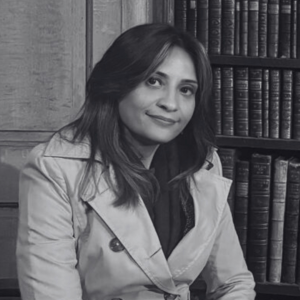
Ranya Al-Jaberi
Ranya Al-Jaberi has ten years of experience in safeguarding, GBV and Protection, focusing on addressing the complex challenges arising from the intersection of the climate crisis and conflict in vulnerable regions. Throughout her career, she has passionately championed the causes of gender equality and environmental sustainability, principles that have consistently guided her work. Her extensive background involves work in conflict-affected areas, allowing her to understand these communities’ intricate web of challenges deeply. She has observed firsthand the disproportionate impact of climate change on vulnerable populations, exacerbating conflicts, disrupting lives, and displacing communities, particularly women and children. With a master’s degree in Humanitarian Action and a commitment to continuous learning, Al-Jaberi possesses the knowledge and skills to navigate the intricate relationship between climate change, gender dynamics, and conflict. Her practical experience with organisations like UNICEF and the Danish Refugee Council has equipped her with insights into the effects of climate change on vulnerable populations, reinforcing her belief in the necessity of integrating climate considerations into emergency and development programmes. Al-Jaberi is dedicated to empowering communities to thrive despite the climate crisis’s obstacles.
Participant in: March 2024 Fellowship: Climate Change, Gender, and Conflict
Sofiia Shevchuk
Sofiia Shevchuk is a founder of an educational and consultancy platform VONA, dedicated to the topics of climate, gender and security; she also serves as an independent researcher, trainer, facilitator and a podcast host (e.g. #VONATalks, WIIS Brussels Voices, etc.). Through building connections, in-depth research, and facilitation of discussions Shevchuk aims to contribute to a more equal, climate-just, and peaceful world. Prior to becoming an independent consultant Shevchuk worked as a researcher with the European Parliament, NATO Parliamentary Assembly and the German Marshall Fund. She also studied at the College of Europe, Bruges; and University of Ghent.
Participant in: March 2024 Fellowship: Climate Change, Gender, and Conflict
Arij Soussi
Arij Soussi is a medical doctor and civil society activist from Tunisia. She focuses on conflict resolution and advocating for the rights of minorities and women. She shaped her peacebuilding and advocacy skills through a range of training programs like Young Mediterranean Voices, where she not only developed her debate skills but also served as a debate trainer for two years. In 2020, she got selected to participate in the MEPI student leaders program at Georgetown University, an opportunity that allowed her to organise the Living Library, an event that enables minorities and women to bravely voice their experiences and speak up against discrimination. She also participated in the Generation Change Exchange Program with His Holiness the Dalai Lama in 2022 and the Strategic Project Design and Implementation Program in 2023, organised by the United States Institute of Peace. Her concern for climate change grew bigger when she noticed that it was fueling political conflict and widening the gap to achieving gender equality in Tunisia and the MENA region. Through her engagement with Opinion Makers, a program organised by the Munathara Initiative, she took part in live TV debates and radio talks where she debated topics related to climate justice and women’s rights in Tunisia. She is also working with Dare organisation on “Golden Words,” a project that aims to empower Tunisian women and girls and creates a safe space for them to share their thoughts, concerns, and recommendations regarding the challenges that they encounter, particularly amidst the climate crisis.
Participant in: March 2024 Fellowship: Climate Change, Gender, and Conflict
Ola Badran
Ola Badran works in conflict sensitivity and gender equality, with a rich background in project management and analysis, notably at UNDP and before that in the private sector. Badran’s work, heavily focused on integrating gender perspectives in conflict zones, showcases her dedication to gender equality and peacebuilding initiatives. Her academic achievements, including a soon-to-be-finalized Master’s in International Cooperation Finance and Development and an MBA, complement her practical experience. Badran is committed to addressing gender and climate crises in conflict settings. Her experience in Syria, especially in water access and social cohesion, reflects her capacity and eagerness to contribute to the fellowship’s goals. Badran’s vision is to leverage this platform to advance her advocacy in peacebuilding, conflict resolution, and climate resilience.
Participant in: March 2024 Fellowship: Climate Change, Gender, and Conflict
Tasneem SiedAhmed
Tasneem SiedAhmed, a dedicated individual with a multifaceted career, has ventured across diverse roles encompassing research, advocacy, and humanitarian efforts aimed at addressing critical issues within Sudan. Currently she works in a research project aimed to study the Environmental Impacts of Sudan War while simultaneously serving as a Loss and Damage Negotiator in Sudan, broadening her understanding of international climate diplomacy. Her last role in Sudan before the conflict was as a Project Researcher at the Darfur Land Project for SALAAMEDIA Peace and Development NGO. Here, Tasneem spearheaded stakeholder mapping, conducted thorough desk reviews on land issues in Darfur, and designed advocacy campaigns targeting housing and land-related concerns in the region with focusing on its gender aspects. Her diverse journey encompassed pivotal roles with esteemed organisations like MSF, where she helped manage complex emergency response projects, monitored humanitarian contexts, reported on key developments, and actively engaged in human rights monitoring efforts. Additionally, Tasneem’s involvement in various grassroots initiatives, COVID-19 response programs, and community-driven campaigns underscores her steadfast commitment to social welfare, human rights advocacy, and community .
Participant in: March 2024 Fellowship: Climate Change, Gender, and Conflict
Ayessa Tin
Ayessa Tin is currently the Programme Analyst for the Women, Peace and Security programme of the United Nations Entity for Gender Equality and the Empowerment of Women (UN Women) in the Philippines. She co-leads the program on Women Mediation and facilitates training sessions for women to build skills on conflict resolution and leads the drafting of the Bangsamoro Mediation Agenda for UN Women supported by the network of women mediators in the Bangsamoro Autonomous Region of Muslim Mindanao (BARMM). Her work in UN Women has also allowed her to support the development of the 2023-2028 BARMM Regional Action Plan on Women, Peace and Security which for the first time, surfaces the confluence of gender, conflict, and the climate crisis in the WPS discourse in the region at a policy level. In line with the implementation of the Government of the Philippines – Moro Islamic Liberation Front (GPH-MILF) Peace Agreement, Tin previously served as focal person for the program on the management of Small Arms and Light Weapons with the Office of the Presidential Adviser on the Peace Process during her work there from 2020-2021. Tin has consistently worked on peacebuilding initiatives since 2012 in the conflict-affected communities of Sarangani Province, Philippines and through freelance and volunteer work with local and international organisations in South Central Mindanao and later in the Bangsamoro Region. She also has a six-year professional background on public policy and local legislation. Tin is a Cum Laude graduate of Political Science in 2012 and holds a Master’s degree in Public Administration major in Public Policy under the In-Country Scholarship Program of Australia Awards. In 2023, she became a Salzburg Global Fellow for the second cohort of the Asia Peace Innovators Forum in Salzburg, Austria.
Participant in: March 2024 Fellowship: Climate Change, Gender, and Conflict
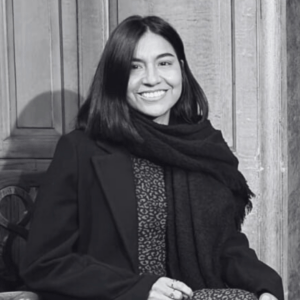
Emily Quispe Ponce de León
Emily Quispe is a professional in Forestry Sciences from the National Agrarian University La Molina in Peru. She has complemented her education with academic internships in Spain and Italy, focusing on Social Innovation, Territorial Capital and Local Development. Her dedication to promoting inclusion and female leadership has led her to work with vulnerable women in urban environments, contributing to the development of district-level gender and climate change political agendas. Currently, she is immersed in projects implementing resilient practices for women in coastal and Amazonian communities, fostering economic growth through bio-businesses and other initiatives that strengthen their role in resource sustainability. Quispe strongly believes that achieving gender equality and active women’s participation requires a comprehensive approach encompassing conflict resolution and the construction of more equitable societies.
Participant in: March 2024 Fellowship: Climate Change, Gender, and Conflict
Urooj
Urooj belongs to Gilgit-Baltistan, often described as a region at the crossroads of South Asia and Central Asia since it is located between the borders of India, Pakistan, China, and Afghanistan. Spanning across almost 73,000 square km in the extreme north of Pakistan, Gilgit-Baltistan is home to the Hindukush, the Himalayas, and the Karakoram mountain ranges, and is one of the most vulnerable regions on the planet, both in terms of the effects of climate change and its political status. Urooj is currently working in the climate space as an environmental, social and governance (ESG) consultant for a hospitality and property management company. She has a MSc in Social and Cultural Anthropology from University College London, where she wrote her dissertation titled “People Changing Climate Changing People: Perceptions of Climate Change, its Impacts, and Indigenous Responses in Gilgit-Baltistan, Pakistan”. She also holds an MA in Islamic Studies and Humanities from the Institute of Ismaili Studies London. She is interested in climate advocacy, climate policy and climate justice in relation to indigenous and mountain communities and displacements. She has experience in social research and evaluation, specialising in climate change and climate action research, demonstrating a commitment to addressing environmental and social challenges through community service.
Participant in: March 2024 Fellowship: Climate Change, Gender, and Conflict
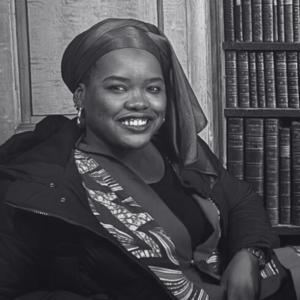
Yakaka Mandara
Yakaka Mandara holds a wealth of experience in conflict resolution, peacebuilding, and community empowerment. As the Project Manager for the Reconciliation and Reintegration Unit at UNDP, she has played a pivotal role in leading and overseeing a multifaceted portfolio dedicated to promoting peacebuilding, reconciliation, and the reintegration of communities affected by conflict and displacement. Her dedication to promoting peace, fostering social harmony, gender equality and empowering vulnerable populations has been a consistent thread throughout her career. With a proven track record in reconciliation, reintegration, protection, and gender equality, Mandara actively contributed to positive change in conflict-affected regions. She recognizes the nuances and sensitivities involved in reintegration processes, honing her ability to navigate cultural differences and historical traumas to build bridges and foster trust between conflicted parties. She led a team in implementing various activities which includes but not limited to livelihood support, social cohesion activities, mental health and psychosocial support. Understanding the significance of community-based initiatives, Mandara actively engaged with local communities and key stakeholders, fostering ownership and sustainability. As a team leader, she prioritised mentorship and capacity building, empowering multidisciplinary teams to reach their full potential. She encouraged Government partners and implemented a gender lens when conducting needs assessment and providing support in local communities. Mandara’s previous roles include Acting Head of the Unit for the Reintegration and Social Cohesion Unit (UNDP), Restoring Family Links Assistant (ICRC), and Community Engagement Analyst (UNDP).
Participant in: March 2024 Fellowship: Climate Change, Gender, and Conflict
Prativa Khanal
Prativa Khanal is a human rights lawyer possessing a master’s degree in law and certification as a Peace and Conflict Consultant from the Academy for Conflict Transformation/Forum Civil Peace Service in Germany. She has amassed extensive experience collaborating with civil society organisations, donors, government entities, UN agencies, and victims of human rights violations across international, regional, national, and grassroots levels. Khanal’s work has spanned diverse conflict, fragile, and humanitarian settings in the Asia-Pacific, Sub-Saharan Africa, Eastern Europe, and the South Caucasus region. At present, Khanal is working at the Max Planck Foundation for International Peace and the Rule of Law in Germany under the Somalia project to advance gender equality in the constitutional review and law-making process. Her previous roles include collaborations with esteemed international organisations dedicated to women’s rights and women, peace, and security, such as the Global Network of Women Peacebuilders (GNWP) in New York. Khanal has also served as an International Consultant – Women, Peace, and Security for UN Women in Bangladesh and Somalia. This diverse background has provided Khanal with a deep understanding and practical experience in addressing women, peace, and security issues, including climate change, in countries like Bangladesh, Georgia, Indonesia, Nepal, the Philippines, and Somalia.
Participant in: March 2024 Fellowship: Climate Change, Gender, and Conflict
Noor Esam Al-Khateeb
Noor Esam Al-Khateeb is a Women Protection and Empowerment (WPE) Senior Manager- Quality assurance and Partnership, working with the International Rescue committee (IRC). With 7 years of experience working in the humanitarian field in Iraq, her career focused mostly on gender equality, gender-based violence, protection of women, and empowerment programs. In her role, Al-Khateeb has actively supported the women-led organisation and the civil society organisations to promote women’s inclusion in peacebuilding and build the technical and organisational skills of women-led organisations, female peacebuilders, and peace networks to participate in peace processes. Al-Khateeb is passionate about women rights and always advocates for women and gender equality in all aspects especially with focusing on the current climate crises and durable solutions. Through her work, she has conducted several GBV assessments to find the linkages between the GBV and the climate challenges in Iraq.
Participant in: March 2024 Fellowship: Climate Change, Gender, and Conflict
Hind Abdulrahman
Hind Abdulrahman is a dedicated professional with over seven years of experience working with International Non-Governmental Organisations (INGOs), Non-Governmental Organisations (NGOs), and Civil Society Organizations (CSOs) in Iraq. Through her extensive career, she has gained a profound understanding of the complex social and political landscape in the country. Abdulrahman’s work involves programs focusing on women and Prevention of Violent Extremism in collaboration with civil society organisations across Iraq. Through the course of her work, she has observed the impact of climate change on the conflict situation in Iraq. The consequences, such as resource scarcity and displacement, have led to increased grievances, potentially rendering individuals especially women in Iraq more vulnerable to exploitation. Abdulrahman is particularly drawn to the program’s emphasis on the role of women in conflict and climate contexts, which perfectly aligns with her professional aspirations and personal dedication. Her interest in the Women in Conflict program reflects her commitment to Iraqi women’s rights and empowerment.
Participant in: March 2024 Fellowship: Climate Change, Gender, and Conflict
Nona Mamulashvili
Nona Mamulashvili is a former member of the Parliament of Georgia (2020-2023) and is currently a co-founder of the Gamziri civic platform in Georgia. She also serves as the chairwoman of the Caucasus Economic Policy Institute, a think tank that promotes structural change and institutional development through policy research and advocacy in the Caucasus and Central Asia. Simultaneously, Mamulashvili holds the positions of president of the Georgian Swiss Business Association and vice president of the Women’s Business Association. In 2023, she was a fellow at the Asia Global Institute in Hong Kong, as well as at the Middle East Institute (2019) and the Rumsfeld Foundation (2018) in Washington, D.C. Previously, Mamulashvili worked as the regional director for Pfizer, covering the Caucasus and Central Asian countries. She has extensive experience in the public sector, having served as the senior advisor to the President of Georgia from 2005 to 2007, and later as a political analyst at the Ministry of Foreign Affairs of Georgia. Mamulashvili obtained a bachelor’s degree in business administration from the International Black Sea University in Georgia, a master’s degree in diplomatic studies from the University of Westminster in the UK, and a PhD in international relations from the University of Sorbonne in France.
Participant in: March 2024 Fellowship: Climate Change, Gender, and Conflict
Justine Seruwaia Maravu
Justine Maravu currently works at Transcend Oceania as a Projects Officer primarily responsible for the Bread for the World funded regional Gender project on Engaging Men and Boys for the Prevention of Violence against Women and Girls. Her role expands to other projects on climate change and conflict, trauma awareness and healing due to her expertise and skills in peacebuilding. Previously, Maravu has worked for organisations such as Social Empowerment & Education Program (SEEP), DUA Project for Pacific Centre for Peacebuilding, and the Accountability & Monitoring Project Adventist Development & Relief Agency. Maravu has a deep interest in Community Peacebuilding and Development which led me to complete a Graduate Certificate in Peacebuilding and Leadership from Eastern Mennonite University, Virginia USA.
Participant in: March 2024 Fellowship: Climate Change, Gender, and Conflict
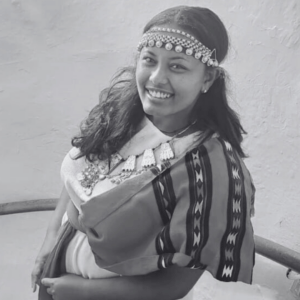
Mekides Berhanu Alemu
Growing up in Addis Ababa, Mekides Berhanu Alemu witnessed the transformative power of peacemaking firsthand through her grandfather, a community-respected mediator. His unwavering dedication to resolving conflict, from marital woes to social clashes, instilled in Alemu a deep aversion to discord and a burning desire for peace. This passion led her on an unconventional path. While five years in biomedical engineering weren’t her ultimate calling, the skills and knowledge she gained became a robust foundation for her true passion: contributing to peacebuilding. Fueled by an MBA that equipped her to tackle complex issues like mass migration and conflict, Alemu found her calling at a local civil society organisation, an organisation dedicated to human rights and good governance. There, she honed her skills and delved deeper into practical peacebuilding, spearheading in peace projects and demonstrating her exceptional talent for conflict resolution. This invaluable experience ultimately led to her prestigious appointment as a Young Women Mediation Ambassador for the Horn of Africa at IPHRD-Africa, where she now plays a crucial role in empowering young women and fostering lasting peace in a region. Today, Alemu channels her unwavering dedication through a local civil society organisation, fostering meaningful youth and women’s participation in peacebuilding. A vocal advocate for their inclusion in peace processes, she serves as a beacon of hope, a testament to the transformative power of unwavering dedication and the potential of peacemaking to shape a brighter future.
Participant in: March 2024 Fellowship: Climate Change, Gender, and Conflict
Minagano Kape Mukhtar
Minagano Kape is a South Sudanese peace builder, activist, and published poet with about a decade of experience in the fields of peace building, peace implementation monitoring, Women Peace and Security, program management, and support to dialogue processes. She has worked with civil society organisations, served in peace agreement implementation Boards andInternational Organizations. Kape currently works as a Peace and Political Affairs Officer at the Swiss Cooperation Office, in South Sudan.
Participant in: January 2024 Fellowship: Peacebuilding and Women’s Meaningful Participation in Peacebuilding Processes
Reham Mourshed
Reham Mourshed is a journalist, and communication specialist with over 7 years of experience in media, communication, graphic design. Her expertise is primarily built upon designing communication and media strategies and plans, managing social media platforms, managing websites, creating content (media reports, stories, and articles), graphic designing, taking and editing photos and videos, on the other hand, she has many published articles and a big interest in gender equality.
Participant in: January 2024 Fellowship: Peacebuilding and Women’s Meaningful Participation in Peacebuilding Processes
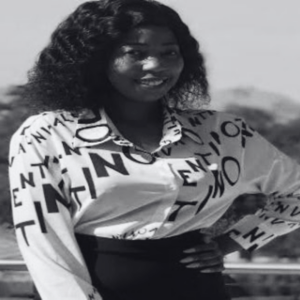
Trish Mutakura
Trish Mutakura pursued her master’s degree in International public administration in China and her Bachelor’s degree in Peace and Governance in Zimbabwe. She is currently working at Green Governance Zimbabwe Trust as the Monitoring and Evaluation officer. Green Governance Zimbabwe Trust (GGZT) is a non-governmental Organisation that was established in February 2019. Green Governance Zimbabwe Trust is a youth based Civil Society Organisation working in Zimbabwe to promote sustainable environmental management. The organisation is involved in community advocacy, policy lobbying, litigation and quality research designed to promote governance in the management of natural resources, biodiversity and their outliers. Mutakura has worked with 200 women from Marange and Chimanimani district of Zimbabwe improving their adaptive capacity to Climate Change by equipping them with skills and knowledge to pursue agroecology practices to sustain their farming reliant practices. These include skills on value addition, food storage and entrepreneurship in order for them to improve their food security and sustain their income base.
Participant in: January 2024 Fellowship: Peacebuilding and Women’s Meaningful Participation in Peacebuilding Processes
Soneni Gwizi
Ms. Soneni Gwizi is a Zimbabwean Physical Disabled Woman Advocate, IVLP Alumni, ADD Ambassador for Asia & Africa, a Disability + Women advocate, Speaker, Influencer, Feminist, Disability Mentor, holds multiple Media Awards on – various Disability Advocacy, Broadcasting & Human Rights Defender Champion & a Rotarian. She is passionately known as Flawsome. Ms. Gwizi was the first Woman with a Physical Disability to be TV Presenter for a Zimbabwe’s National TV Station – ZbcTV & Radio Presenter. Her belief is – Women with disabilities do normal things just like You! Her speaking experiences include the Zimbabwe International Trade, Disability Summit Zim 2018, the Hope & Salvation Ability Conference, Zimbabwe Women in Health, and the World Bank Amplifying the Voice & Spotlighting of Women & Girls with Disabilities in COVID-19 Response. In 2019, Gwizi was nominated for the Her Abilities Global Award, an international award dedicated to women with disabilities from across the continent who have exceptionally excelled in their line of work regardless of any human made barriers they face within.
Participant in: January 2024 Fellowship: Peacebuilding and Women’s Meaningful Participation in Peacebuilding Processes
Reham Al-Aghbari
Reham Al-Aghbari is a proud DAAD scholar with a master’s degree in Public Health. Currently, Reham is an External Projects Program Coordinator at Saint Andrew’s Refugee Services (StARS), Egypt. She works in developing the institutional capacity of refugee-led organisations in Egypt to derive quality services to the refugee community. Prior to working at StARS, Al-Aghbari worked as a program coordinator at Generations for Peace in Jordan. Al-Aghbari was inspired to know the relationship between health and conflict. She learned how to identify conflict in a community and how the quality of relationships (building acceptance, inclusion, and respect) plays a significant role in conflict transformation. Reham had the experience of implementing peace-building activities and vehicles (Sport for Peace, Art for Peace, and Advocacy for Peace). In her free time, Al-Aghbari can be found playing football, hiking, and crafting.
Participant in: January 2024 Fellowship: Peacebuilding and Women’s Meaningful Participation in Peacebuilding Processes
Thuria Ibrahim
Thuria Ibrahim is a dedicated humanitarian professional with a fervent commitment to advancing peace, social justice, and women’s rights. Armed with a Master’s degree in Human Rights and Development, she possesses the knowledge and skills essential for positively impacting the lives of vulnerable individuals, particularly women and girls. Ibrahim embarked on her humanitarian journey in 2012 as a peace pioneer, focusing on mitigating school conflict and violence prevalent in Jordan’s educational landscape. Through her research, she unveiled the profound connection between social and domestic violence, leading her to prioritise the rehabilitation of teachers and the creation of a violence-free community. In tandem with her role as a peace pioneer, Ibrahim serves as a national trainer with Y-peer, dedicating over a decade to supporting Syrian women in refugee camps. Her unwavering dedication has earned her widespread recognition. Having spent a decade in the humanitarian field, Thuria transitioned to a role as a Project Manager, currently working with youth in Jordan to impart knowledge on project management for peace, conflict, and emergency projects. She educates young people on conflict resolution, mediation, and other crucial skills to foster community peace. Thuria firmly believes that empowering women is integral to achieving enduring peace and social justice in the country.
Participant in: January 2024 Fellowship: Peacebuilding and Women’s Meaningful Participation in Peacebuilding Processes
Ndachem Abubakar
Ndachem Abubakar is a community engagement analyst with the UNDP in Maiduguri, Nigeria, Borno State, with over 10 years’ experience in conflict and post conflict context. Abubakar’s work focuses on the implementation of four portfolio projects, under these projects she conducts advocacy and dialogue sessions, with critical government stakeholders, community leaders and civil society, on community preparedness for reintegrating low-risk former Boko Haram associates into the community, to improve acceptance and reduce stigmatisation and rejection of former boko haram associates, enhance social cohesion, and peaceful coexistence in the community. She facilitates capacity-building trainings for Government, CSO, CBOS, people with special abilities, VSOs, and community leaders on community mobilisation, mediation, conflict prevention and reconciliation, early warning, role of women in peace processes, post conflict needs for women and young girls, women empowerment, youth engagement and their participation in peacebuilding initiatives, social cohesion. She provides technical support to government to operationalize national infrastructures for peace, ADR commissions, transitional and restorative justice mechanisms and ensure 60% women’s participation in all project implementation at the local and state level with critical stakeholders, in social cohesion, sustainable peacebuilding initiatives, and sustainable socioeconomic support, to consolidate peace in northeast Nigeria, ensuring the full participation of women, youth, and people with disabilities.
Participant in: January 2024 Fellowship: Peacebuilding and Women’s Meaningful Participation in Peacebuilding Processes
Shrishti Rana
Shrishti Rana is a scholar in International Relations and peace studies. She has written a book titled Nepal Votes for Peace, jointly with Nepal’s Chief Election Commissioner, published by the Cambridge University Press in 2013. The book focuses on the peacebuilding process in Nepal focusing on how its post-election process institutionalised socially inclusive democracy in Nepal. Rana has written for several international publications based in Australia, Canada, Denmark India, and the UK. She also has nearly fifteen years of experience in leadership positions in several international organisations.
Participant in: January 2024 Fellowship: Peacebuilding and Women’s Meaningful Participation in Peacebuilding Processes
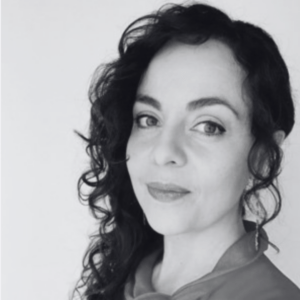
Maria Elisa Pinto-Garcia
Maria Elisa Pinto-Garcia lives in the intersection of creativity, art and peacebuilding. Being both a professional in government and international relations, and a singer and composer, art-based peacebuilding approaches have been at the core of her work and publications since 2008. Through the most important start-up competition in Colombia, she created in 2013 the new vision of Prolongar Foundation which since then has been one of the leading NGOs in the country in art-based strategies for peacebuilding. As the Executive Director of the organization from 2013 to 2022, she co-designed and delivered more than 20 creative projects including mobile museums, community murals, podcasts, and video projects to advance a culture of peace and raise awareness around violence and Human Rights violations in Colombia reaching 15.000+ people. She has designed and facilitated spaces for capacity building and community engagement for a variety of groups including conflict-affected victims and communities, guerrilla ex-combatants, veterans of war, campesinos, entrepreneurs and educators, reaching around 1000 people directly. Maria Elisa earned a Master’s Degree in Global Studies, with emphasis in Peace and Conflict Studies, from the Tokyo University of Foreign Studies for which she received a full scholarship from the Japan International Cooperation Agency (JICA). She has written a total of ten publications, including books and scholarly articles about art-based peacebuilding approaches. Currently, she is the Operations Lead of Reimagine Peacebuilding, a translocal community of 25 peacebuilders and activists around the world seeking to explore alternative futures for peace to build new systems. She is also the project manager and production coordinator of the award-wining Documentary INDIVISIBLES, the host of the podcast Encuentros Improbables (Unlikely Encounters in English), and the singer and composer of the Sonajero band.
Participant in: August 2023 Fellowship: The Arts as a Tool for Peacebuilding
Anushree Rai
Anushree Rai has 5+ years of experience working in the domain of policy formulation and analysis for multi sectoral development strategies, with a focus on education and gender equality policies. While working in the policy sphere, she also successfully engaged in government liaison, stakeholder management, project coordination, and research. Along with an elaborate experience as an Education Policy Analyst, Gender Researcher and Political Analyst, Rai has successfully conducted Monitoring and Evaluation (M&E) for international agencies. Her experience as a policy analyst and strategist was executed from the perspective of the government, academia and private organisations.
Participant in: January 2024 Fellowship: Peacebuilding and Women’s Meaningful Participation in Peacebuilding Processes
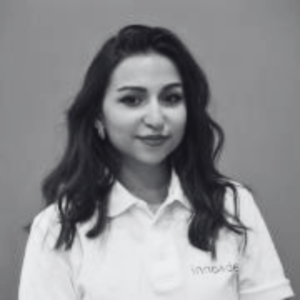
Zainab Almashref
From driving innovation and youth leadership to empowering communities and promoting anti-corruption initiatives, Zainab Almshref is a project management officer with the United Nations development Programme of Iraq for 4 Years with a passion for creating positive change in Iraq and Beyond. She holds a bachelor’s in Automated Engineering and she is currently an MBA candidate.
Participant in: January 2024 Fellowship: Peacebuilding and Women’s Meaningful Participation in Peacebuilding Processes
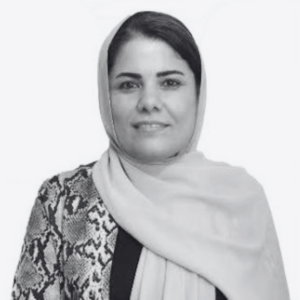
Shno Qane Qadar Salihi
Shno Qane Qadar Salihi is a 36-year-old individual hailing from Kirkuk Governorate, Iraq. She holds a Bachelor’s degree in Law from Kirkuk University and is proficient in Arabic, Kurdish and English Since 2015 Salihi has been actively contributing to society through various roles within Civil Society Organizations (CSOs). Her journey began with Handicap International, where she served as a Psychosocial Support Worker and later as a Physical Rehabilitation Project Officer, aiding individuals with disabilities in achieving their goals. Subsequently, Salihi joined Women for Women International (WFWI) as a GBV and Advocacy Trainer, focusing on empowering women economically and socially. Currently, Salihi is the Project Manager for Peace and Freedom Organization (PFO) under the JISRA project, aiming to promote religious freedom and belief, integral to human rights. Engaging in numerous human rights and gender equality conferences, she holds certificates in peace-building and human rights. Notably, she contributed to internal policies on gender equality for PFO and co-authored research shedding light on the challenges faced by women in Iraq, emphasising the need for equality, especially in the face of violence and limited rights. In essence, Salihi is dedicated to advancing human rights, gender equality, and social justice.
Participant in: January 2024 Fellowship: Peacebuilding and Women’s Meaningful Participation in Peacebuilding Processes
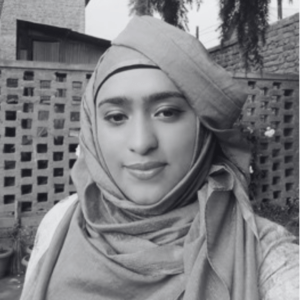
Badrunissa Bhat
I am Badrunissa Bhat, a research scholar and a Sufi artist affiliated with the Department of English and Shiekh ul Alam Centre for Multidisciplinary Studies at the University of Kashmir. I love unraveling the enigmatic realm of mysticism through my art and academic pursuits. From my earliest memories, the artistic and literary traditions of Kashmir have been ingrained in me. Growing up in this culturally rich land, I have developed a profound love for art and literature, a passion that would guide me on an extraordinary journey of self-discovery. The mystical traditions of Sufism that permeate the very fabric of Kashmiri society ignited a flame within me, compelling me to explore the depths of spirituality, peace, and conflict resolution. As a research scholar, I find solace and inspiration in the interplay between mysticism, literature, and conflict resolution. My doctoral studies at the University of Kashmir have provided me with a platform to explore the transformative power of literature infused with Sufi teachings. My creative expression doesn’t end with academic research alone. As a Sufi artist, I channel my emotions and beliefs onto the canvas, using vibrant colors and intricate patterns to convey messages of unity and compassion. My artwork, exhibited in renowned galleries, has garnered accolades for its ability to evoke introspection and foster dialogue. I firmly believe that art has the power to transcend boundaries and touch the deepest recesses of the human heart, making it an invaluable tool for promoting peace and conflict resolution. Additionally, my love for words finds its expression in the form of short stories and poems. Through evocative prose and soul-stirring verses, I aim to ignite a sense of empathy and interconnectedness among diverse audiences. Drawing inspiration from the mystical traditions of Sufism, my writings delve into themes of love, longing, and spiritual enlightenment, seeking to bridge divides and foster a universal understanding.
Participant in: August 2023 Fellowship: The Arts as a Tool for Peacebuilding
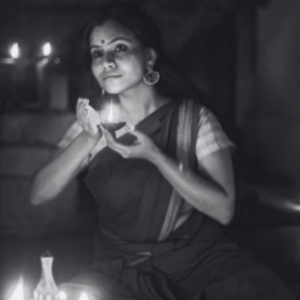
Anjali Krishnadas
Anjali Krishnadas is a versatile artist known for her mastery of Mohiniattam and Kathak dance forms, as well as her expertise in theater and choreography. She has made a significant impact on the cultural landscape with her passion for the arts and her dedication to promoting dance. Under the guidance of renowned dance guru Padma Bhushan Dr. Kanak Rele, Anjali began her dance journey, honing her skills in the graceful art of Mohiniattam. Inspired by the rich heritage of Indian folk dance, she furthered her understanding and proficiency in this vibrant form through training with esteemed artist Prashant Bhafalekar. Anjali’s thirst for artistic growth led her to pursue Kathak training under the tutelage of respected exponent Dr. Varada Pandit. Her commitment to continuous learning and exploration demonstrates her unwavering dedication to excellence in her craft. Together with Ponnu Sanjeev, Anjali Krishnadas founded Thudippu, a registered public trust based in Kerala, with the noble goal of popularizing dance across all sections of society. Thudippu is a socially committed initiative that seeks to uplift underprivileged groups and integrate them into the mainstream. Anjali recognizes dance’s transformative power to connect the body and mind, serving as a catalyst for self-discovery and personal growth. Thudippu has conducted numerous sessions in special schools, nurturing talents and providing platforms for individuals to shine. They have also organized orientation and demonstration classes in various government colleges and schools, spreading the beauty and essence of Indian classical dance. Notably, Thudippu’s workshop called Chuvadu aims to introduce the fundamentals of Indian Classical Dance to the transgender community, empowering them through dance.
Anjali Krishnadas and Thudippu have choreographed and performed several dance videos that address contemporary social issues, utilizing dance as a visual medium to convey powerful ideas inspired by everyday realities. Their creative endeavors have had a significant impact, raising awareness and provoking thought through the beauty of dance. Operating from Ernakulam, Kerala, Thudippu offers classical dance classes, enabling individuals from all walks of life to explore and embrace the art form. Additionally, they provide online sessions for Mohiniattam dance, making it accessible to a wider audience. Through Thudippu, Anjali Krishnadas opens doors of opportunity for all sections of society, empowering individuals to consider dance as a viable career option. Her efforts to make classical dance more accessible reflect a vision of a society where the arts play a central role in personal growth and cultural enrichment. Anjali Krishnadas; tireless dedication to her art, commitment to social upliftment, and artistic collaborations through Thudippu establish her as a luminary in the world of dance.
Participant in: August 2023 Fellowship: The Arts as a Tool for Peacebuilding
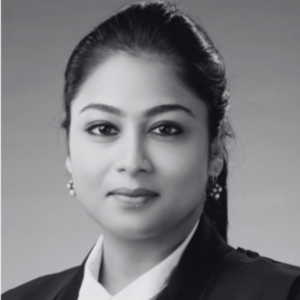
Mrinalini Majumdar
Mrinalini Majumdar is a practicing lawyer at the Calcutta High Court, the oldest High Court in India. She specialises in criminal and constitutional law, with focus on Human Rights. She has also been an empanelled counsel for the Union of India. An alumnus of Symbiosis Law School, she provides pro-bono legal advice to the Human Rights Law Network, a non-profit organisation founded to protect the fundamental human rights and civil liberties of India’s most marginalised and vulnerable communities. She has also developed ‘The Legal Awareness Program’, a weekly live telecast on DD Bangla, India’s state-owned bengali language television channel. An active participant of the #MeToo global movement, she works in litigation involving sex crimes & gender violence. She is involved in child counselling and trial preparation for child sexual abuse cases. She has also submitted the ‘Safe School Policy: Guidelines for Protection of Children from Sexual Abuse in Schools” for mandatory implementation across all schools in West Bengal, India under the Protection of Children Sexual Offences Act 2012 on being appointed as Amicus Curie. She has represented India in the prestigious International Visitors Leadership Program, USA working on Investigating and Prosecuting Human Rights Violations.
Her bar robe aside, Mrinalini is a trained Bharatnatyam dancer, specialising in Navanritya having performed nationally and internationally. She has a keen interest in literature, culture & politics. She is passionate about issues related to women empowerment and community building, all while striking a balance between the worlds of the Law and the Arts.
Participant in: August 2023 Fellowship: The Arts as a Tool for Peacebuilding
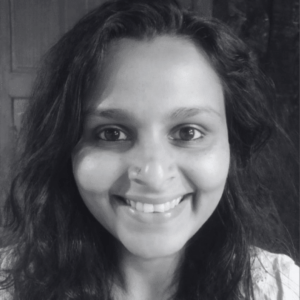
Arundathi Vishwanath
Arundathi Vishwanath works with people in their pursuit of reclaiming the utter joy of embodying their authentic-selves. With collectives, her focus is on nurturing safe & playful spaces, anchored in love, guided by intuition and driven by solidarity, to embark on collective transformative journeys. She is a trained Theatre of the Oppressed Facilitator, a Womb Medicine Woman & a psychotherapist with a focus on the Comprehensive Resource Model. Arundathi founded Kalaa Dhari: The Art of the Inner Revolution, in 2021. Kalaa Dhari engages in theatre & therapeutic practices with some of the most marginalized communities across India. She currently lives in a mud house by a forest on the mountainside in Himachal Pradesh, India.
Participant in: August 2023 Fellowship: The Arts as a Tool for Peacebuilding
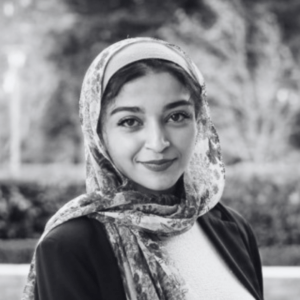
Zahra Al Hilaly
Zahra Al Hilaly is a voice for gender equality and believes storytelling is the greatest tool for change. A proud Palestinian and Iraqi woman, Zahra is committed to ensuring marginalized perspectives are amplified in traditionally exclusive spaces. Zahra comes with over seven years of experience working with young people to flourish inclusive change through our very culture, stories, and spirituality. She currently acts as the Chief Executive Officer for Oaktree Australia, the largest youth-run organisation in the country, where she focuses on empowering young people from the Asia and the Pacific region to become leaders in governance and policy. Zahra also works as a Global Consultant for Women Deliver, where she is working to create a youth-centred conference, utilising cultural practices to decolonize advocacy at the largest gender-equality conference in Kigali this year.
Zahra is currently a Duke University fellow, working on the intersection of climate justice and inter-cultural and inter-religious practices, particularly working with Australia’s rural, refugee community to create an inclusive movement. Beyond the gender space, Zahra has previously worked as an investigative journalist and currently holds a Bachelor of Law and a Bachelor of Communications. As a slam-poet and inclusion consultant focussing on decolonisation as a practice for creating equitable communities, Zahra has previously curated the Propel Youth Arts Festival as the Western Australia Ambassador, ensuring the voices of 600,000 young people are heard. Zahra sits on the boards of Missing Perspectives, an online newsroom for women, and the Australian Youth Climate Coalition, the largest climate-advocacy group in the country. In 2023, Zahra was also named the youngest-ever recipient of the Australian Women in Excellence Awards and in 2021, she was named the first-ever Young Asian-Australian of the Year.
Participant in: August 2023 Fellowship: The Arts as a Tool for Peacebuilding
Sonal Dhanani
Sonal Dhanani is an award-winning women peace builder, mental health advocate, creative professional, Neuro-Linguistic Programming (NLP) practitioner, and trauma-informed facilitator keen on promoting education, mental health initiatives and social action in Pakistan. Sonal was a member of Pakistan’s first National youth Council by Prime Minister Imran Khan. In 2015, after losing a loved one in a terrorist attack a community; Sonal realized the need of mental health recreational wellbeing in Pakistan and started an initiative called Parindey which focuses on countering and preventing violent extremism in Pakistan through artistic approach of introducing mental health and peacebuilding programs. Through this organization, Sonal is participating in the mainstream process of peace at the people-to-people level.
Sonal’s purpose of work and aim for peaceful Pakistan is to break down the stigma that surrounds speaking out about mental health issues and her work aims to make a significant difference in the world, changing perceptions about mental wellbeing. Sonal was the first one to introduce and take art and music therapy to vulnerable communities with the focus of providing a platform for youth to channelize their emotions in a positive way and counter-violence in society. She has participated in organizing literary seminars and events celebrating the work of artists and writers in promoting peace and harmony by harnessing the positive energies of expressive arts. She sees art as a uniting force between people irrespective of race, religion, caste, color, gender, ethnicity, or language.
Participant in: August 2023 Fellowship: The Arts as a Tool for Peacebuilding
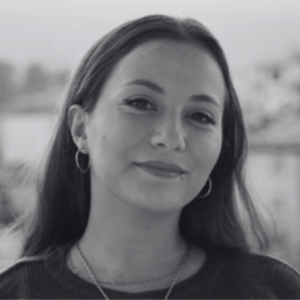
Shoushan Keshishian
Shoushan Keshishian is a specialist in post-war recovery and development. Originally from Beirut, Lebanon, she relocated to Armenia in 2020 to work in post-conflict Nagorno Karabakh. She is the Founding Director of Hub Artsakh, a co-working space and NGO based in Stepanakert. The mission of Hub Artsakh is to build human capital and resilience through fellowship programs, entrepreneurship incubators, informal education, and fostering collaboration. Shoushan is also the Co-founder and Director of the Sunrise Stepanakert Art Festival, an annual multimedia art festival that has taken place in post-war Nagorno Karabakh every summer since 2021. The festival brings together local and international artists through a rich programme that includes concerts, film screenings, workshops, and an exhibition. The overarching goal of the festival is to promote the practice of art/culture as a tool for post-war recovery. Sunrise Stepanakert aims to revitalize public spaces through cultural events, support arts and culture education, and link cultural heritage with contemporary art. Over the past three years of activity, the festival has highlighted the unique transformative impact of arts/culture in fragile post-conflict environments through increasing social cohesion and strengthening communities.
Participant in: August 2023 Fellowship: The Arts as a Tool for Peacebuilding
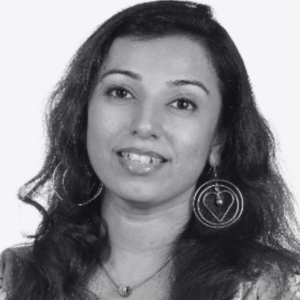
Hasini Haputhanthri
Best known as a development professional and arts manager, Hasini Haputhanthri collaborates with a global network of researchers and practitioners on peacebuilding, education, arts and heritage management. Her current focus is on reinventing museums as sites of inclusion, innovative pedagogy and civic engagement. Her publications include Archive of Memory: Reflections of 70 years of Independence, Cultural Fluency: A Transformative Agenda for Caring Communities, Museums, Memory and Identity Politics in Sri Lanka, and Shared Sanctity: Art and Architecture of Religious Confluence.
Initially trained as a sociologist at Delhi University India and Lund University Sweden, Hasini later specialised in Oral History and Museum Anthropology at Columbia University New York. She has worked with several international and local organisations on peacebuilding in Sri Lanka for the past 15 years, most notably with Deutsche Gesellschaft für Internationale Zusammenarbeit (GIZ) where she led the culture and conflict programme for 10 years. She has worked on cultural and educational policy issues as well as working with over 100 artists and art organisations in Sri Lanka. Her recent cross border collaboration ‘World Art and Memory Museum’ brings together curators and cultural activists from 7 different countries. She speaks regularly on social inclusion, culture and heritage management issues on a variety of international platforms.
Participant in: August 2023 Fellowship: The Arts as a Tool for Peacebuilding
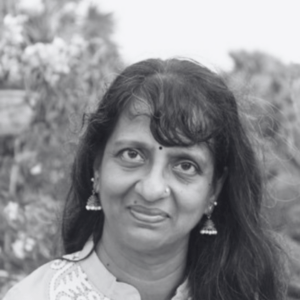
Vasuki Jeyasankar
Kamala Vasuki (Jeyasankar), born in 1966, in the North and living in the East of Sri Lanka, both the districts affected by the 3 decades of internal armed conflicts. Her own art practices started as a reflection of a young woman living in war. Her acquaintance with the theatre groups and women’s rights movements rooted her works conceptually on feminisms and expand her expressions through different mediums including theatre and songs. Her individual artworks comprise of paintings on the power of women and nature, cartoons to question the dual stands and the creation of divides and hatred based on gender, religion, ethnicity, caste and class and installations on common experiences of conflicts that connects women beyond their identities. Also she initiated collective art practices with women to raise collective voices and to express their experiences and memories. She believes in holding community art exhibitions and encourage the people to view and engage in discussions. She has been an integral part of women’s activist spaces for peace, non-violence and justice. She has mentored almost two generations of visual artists and others who are interested in all forms of artistic and literary work for social change and peace. She founded and sustaining many groups along with her friends including ‘Artists for non-violent living’, ‘Third eye’, a group of activists engaged in preserving local knowledge and skill ‘Padinikal’ an all women cultural group that was affiliated to the Suriya women’s Development Centre and Samathai the only all women parai drumming group in the island – the drum that is traditionally relegated to be played only by oppressed caste men and Samathai reclaims the traditional percussion art from a caste and gender perspective. She holds Master’s degree in Human Rights and Democratization from University of Sydney.
Participant in: August 2023 Fellowship: The Arts as a Tool for Peacebuilding
Ola Al Mamlouk
I’m Ola Al Mamlouk, a passionate filmmaker and drama facilitator. Combining art and social work, I empower youth and women through my work. Currently with Crooked House Theatre Company in Ireland, my films and workshops have garnered praise. I also champion women’s causes, directing productions and organizing impactful events. My goal is to create positive change through art, inspiring transformative outcomes and fostering collaborations.
Participant in: August 2023 Fellowship: The Arts as a Tool for Peacebuilding
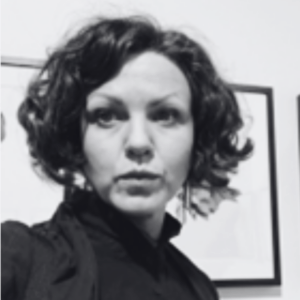
Lucy Nychai
Lucy Nychai is the Co-founder and project curator of Nazar Voitovich Art Residency (NVAIR), Curator of the international program of virtual art residencies Artist is Absent. Ukraine. Co founder and Project manager of NGO Congress of Culture Activists. Artist and researcher. Works with the topics of memory and commemoration, sustainable ecosystems, and site-specific projects, and studies ethical issues of digital art. Researches international practices of art residencies and their impact on local challenges and global cultural policies. Facilitator of the Active Citizens program of the British Council. Culture researcher in programme Meta City East (Luhansk and Donetsk region). For 2 years, she worked in a team of brand developers for communities in the so-called “grey zone” of Luhansk and Donetsk regions within the framework of the UN project. Ran the forced art residency program “Internal Elements” at NVAIR, a temporary shelter after the full-scale invasion of Russia in Ukraine. Managed the project “SOS. CAU” designed to support the community of Ukrainian digital artists in wartime. Curates the creative community of Ukrainian refugees in Hexham (Northern England) during of the curatorial residency program at D6: Culture in Transit. Panellist of discussion “Artist under Attack, political art”, Culture in Transit Conference, Boston, USA (IRL) 2022. Panellist of Conference ONE YEAR ON: Building Solidarity in the creative sector. Birmingham, UK (IRL) 2023.
Participant in: August 2023 Fellowship: The Arts as a Tool for Peacebuilding
Marta Trotsiuk
Marta Trotsiuk is the founder of Gallery 101 and the president of Ukrainian Gallerists Association. She is also an art curator which focuses on Ukrainian contemporary art. Since the full-scale war started she was actively involved in cultural diplomacy and cultural resistance projects. Some of the main initiatives related to the topic of the arts as a tool for peacebuilding are:
- Creation and moderation of a “Culture Against Aggression” group of more than 1600 cultural representatives. Community which works on the strategy and fast reaction of cultural resistance.
- Curation “Lviv Meets” program for adaptation of IDPs in the first months of the full-scale war.
- Charity art auctions to collect funds to support Museum Crisis Center
- International cultural exchange programs with Taiwan, Croatia and Poland to communicate and collaborate on art level.
- An author and a host of podcast “Culture Against Aggression” which has an aim to document Ukraine culture in times of war for future research and analysis. Also to raise important questions and find the best solution for peacebuilding and Ukrainian integration into the world’s culture.
- Many interviews, public speaking and conferences on the topics of the role of art and culture in the war.”
Participant in: August 2023 Fellowship: The Arts as a Tool for Peacebuilding
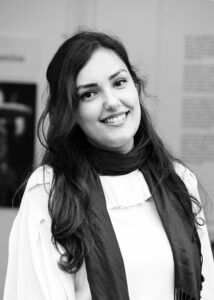
Thana Faroq
Thana Faroq is a Yemeni photographer, writer, and lecturer at the Royal Academy of Art in the Netherlands. She works with photography, texts, sound, and the physicality of the image itself as a way to respond to the changes that have been shaping and defining her life and sense of belonging both in Yemen and the Netherlands Thana’s positioning as a photographer is informed by her reflections on her subject matter, tuning in to other people’s lived experiences with which she continually grows familiar. She also increasingly seeks her own story in the frame. Her work mirrors her life and provides a visual echo of her voice as she gracefully negotiates themes of memory, migration, and intergenerational trauma. Thana has a unique approach to working with her subjects in that she regularly returns to them to continue sharing their journey. Many of these migrant, stateless individuals were with Thana during her transitional period. Amongst her honors, Thana was a recipient of the 2018 inaugural Open Society Foundation Fellowship and the 2019 Arab Documentary Fund supported by the Prince Claus Fund and Magnum Foundation. In 2020 She was selected by the British Journal of photography as “Ones to watch” Thana also the recipient winner of FotoWien photo book award 2022. Thana received her BA in Government and International Relations from Clark University, and MA Photography and Society at The Royal Academy of Art.
Participant in: August 2023 Fellowship: The Arts as a Tool for Peacebuilding
Nuha Damag
Nuha Damag is the Head of Strategy and Project Management for Gender Equality at AWAM Foundation for Development and Culture, with a master’s degree in finance and a bachelor’s degree in International Business Management. She is a passionate advocate for human rights and has dedicated the past 12 years of her life advocating for peace, democracy and gender quality in the MENA region, specifically Yemen, and worked with various organizations to promote gender equality and political inclusion, prevent violence against women, and establish sustainable peace. Since 2010, she has volunteered and worked with AWAM and other civil society organizations, whether on a full-time or part-time basis, on causes concerning democracy, good governance, peacebuilding and human rights in general, especially causes concerning the strengthening and attainment of youth and women’s rights in areas of armed conflict in Yemen. Nuha was fortunate to be part of AWAMs team and engage in initiatives and projects with organizations such as UN Women, Oxfam, Friedrich Ebert and many others. Nuha is a firm believer that peace and gender equality are not mutually exclusive. Women’s issues have major ramifications in the political, economic and social spheres, causing a wide range of adversities. Accordingly, she is determined to use her influence to guarantee that women around the world are treated with dignity and given the opportunity to realize their fullest potential and have their efforts benefit their societies.
Participant in: March 2023 Fellowship: Climate Change, Gender, and Conflict
Nour Barakeh
Through her scientific study, artistic work, and academic training in public policy, Nour Barakeh strives to understand society from different viewpoints and to communicate complex topics. Her M.A. in Public Administration from Central European University emphasized the Sustainable Developments Goals (SDGs) and environmental policies to mitigate climate change. Developing migration policies and combating human trafficking are also in scope.
With experience ranging from dance and theater to social work and journalism, she aims to support the establishment of sustainable educational projects focused on empowering people through raising awareness, and to counsel governments, NGOs and corporations on policies with a specific focus on the Sustainable Developments Goals. As a Global Citizen, she believes in proactively pursuing the necessary goal of peace.
She previously studied at the Higher Institute of Dramatic Arts in Damascus and graduated from the Faculty of Pharmacy at Damascus University. As a sought-after speaker on the SDGs, refugee, and migration issues, she has spoken on numerous high-profile panels highlighting young, female voices such as at European Forum Alpbach alongside former UN SG Ban Ki-moon and former Austrian President Heinz Fischer as well as at a UN High Level Political Forum on Sustainable Development among others. Nour Barakeh is also an Agents of Change Youth Fellow at Wilson Center.
Participant in: March 2023 Fellowship: Climate Change, Gender, and Conflict
Hala Alhaffar
Hala Alhaffar has completed a MSc degree in Global sustainable development at the University of Warwick. She had a joint scholarship (Chevening and Said Foundation) to study master’s degree in the UK (2021-2022). Additionally, she has over eight years of volunteering and social work experience in the environment and humanitarian fields. She established a social enterprise in 2019 (Green Treasure), which aims to increase environmental awareness through applying sorting and recycling waste projects in Syria and developing environmental workshops and training about climate change and recycling.
Participant in: March 2023 Fellowship: Climate Change, Gender, and Conflict
Samia Faisal
Samia Faisal is a young Energy Socioeconomic analyst and researcher in the development and human rights field from Sudan. Now, she is doing a master’s degree in Economics and policy of Energy and the Environment at University College London (UCL). Samia obtained her B.Eng. in Nuclear Engineering in 2016; after graduation, she served at the Sudan Atomic Energy Commission (SAEC) for two years. Since 2017, Samia has been working as a Development Officer at the Sudanese Women in Science Organization (SWSO), where she is advocating the participation of Sudanese females by raising public awareness about women’s rights, building women’s leadership capacity, and strengthening women’s economic development. In 2020, she joined the Regional Center for Renewable Energy and Energy Efficiency as a part of the Arab Program for Sustainable Energy Youth, where she worked under the Arab League flagship in Cairo, Egypt to support its members in developing their energy transition strategies. Ms. Faisal is an alumnus of the Mandela Washington Fellowship 2021, where she studied Public Management at the University of California Davis (UC Davis). Samia also served as a communication governance consultant for the Sudanese transitional government in 2021, where she supported governors’ communication offices with their strategies and development.
Participant in: March 2023 Fellowship: Climate Change, Gender, and Conflict
Walaa Ahmed
Walaa Ahmed is the Former Minister of Youth and Sports, Sudan’s Transitional Government. She was selected at the age of 33 as the youngest female minister in the history of Sudan, the first woman to hold the position of the minister of youth and sports and the youngest minister in the transitional council of ministers. Former Chairperson of the East and Central African Regional Advisory Board for the Mandela Washington Fellowship for young African Leaders. Walaa served in Public Sector, she was the first female mechanical engineer in Sudan’s Sugar Company’s workshop since its establishment, she also worked at Sudanese Standards and Metrology Organization. In addition to that she worked at Private Sector as Process Integration Specialist at DAL Group, Sudan’s Largest Conglomerate, the Civil Society, and as a Lecturer at Sudan University for Science and Technology. Walaa founded and led several initiatives in Sudan and across the African content, she was part of the peaceful revolution that overthrown the 30 years of dictatorship in Sudan. Walaa was selected among the 100 most influential young Africans in 2020 by Africa Youth Award and among the 100 most influential African women by Avance Media. Walaa is a mechanical Engineer with a MSc and DIC in Advanced Mechanical Engineering, Imperial College London.
Participant in: March 2023 Fellowship: Climate Change, Gender, and Conflict
Shatha Alowda
Shatha Alowda (Arabic – شذا العودة), was born and raised in Palestine, and currently works as Assistant Program Officer-Mercy Corps Global/ Middle East Programs’ Team, based in Washington, DC. She has 4+ years of working experience in managing and implementing developmental and humanitarian programs in Palestine. Shatha holds a graduate degree in Gender and Development Studies, and has worked on programs relevant to gender justice, documentation of human rights violations, psychosocial support for women and children, women socio-economic and political empowerment, and strengthening women-led cooperatives in Palestine. Shatha has also taken part in co-authoring and developing different publications; one of which is a research study that focused on assessing Palestinian women’s ownership of and access to land and productive resources. As part of her active engagement with the Palestinian civil society, she has taken a leading role in organizing and implementing advocacy campaigns calling for ending all forms of violence against women and girls. Shatha is passionate about addressing and transforming unjust social structures restricting women’s empowerment. In her free time, Shatha enjoys the outdoors by going on hiking trips, exploring the world of photography, and reading.
Participant in: March 2023 Fellowship: Climate Change, Gender, and Conflict
Hanadi Abu Taqa
Hanadi Abu Taqa is a Palestinian Humanitarian worker who has served for more than 19 years for UN agencies (UNDP, UNICEF, UNRWA) and INGOs (PUI, Save the children). Since 2018 she performs the role of Chief of Area Office for the North area of West Bank, being the first female staff appointed for this position in UNRWA history. Born in Nablus in northwest Bank she studied in Jordanian University with BA in School Counselling and mental health in 1994 and MSc in Political planning and development from Al-Najah University in Nablus in 2009.Hanadi has a long experience working with adolescents and women. She focuses on Gender perspective, making sure that gender needs are considered in emergency response plans and interventions during emergencies. Advocating for the women and children rights by highlighting issues related to their needs and making sure their voices are heard at a national and international level. Her current role involves coordinating and leading the assessments in any emergency situations in WB in the aftermath of military operations, to ensure identifications of needs for vulnerable and affected communities and work with relevant parties to respond and fill in the gaps.
Hanadi has strong interest in women empowerment and has managed women empowerment projects in the north to support the most vulnerable women and increase awareness around their rights and resources. Hanadi coordinates the running of UNRWA operations in the North of WB, an extremely tense area due to the frequent actions of the army and settlers, which endanger the refugee population. Hanadi has demonstrated a great ability to respond to humanitarian crisis, engaging the affected refugee communities and coordinating with humanitarian and civilian actors in the area. Hanadi has extensive experience in the humanitarian field of peace building, previous experience in GBV and child protection in humanitarian context. Hanadi has outstanding communication, coordination, and teamwork skills
Participant in: March 2023 Fellowship: Climate Change, Gender, and Conflict
Fiz Hassan
Fiz Hassan is a graduate student in Architecture at the University of Illinois at Urbana Champaign (UIUC), with a background in structural engineering. She is passionate about urban community development in light of sustainable interventions and environmental justice implementation. Fiz has been a Fulbright Scholar’ 16, EDF Climate Corps Fellow’ 22, UIC SISE Fellow’ 21 and worked on climate action planning & energy simulation projects throughout different fronts. Presently she is leading the university Design Team for the US Department of Energy hosted Solar Decathlon competition as a Project Manager, overseeing a group of approximately 35 members.
Participant in: March 2023 Fellowship: Climate Change, Gender, and Conflict
Durga Mohanakrishnan
Durga Mohanakrishnan is currently doing research on Disaster Risk Communication and Preparedness based on the two flood events which happened in India and Western Germany as a German Chancellor Research Fellow with Alexander von Humboldt Foundation and hosted by German Committee for Disaster Risk Reduction in Bonn, Germany. Before that Durga was working as the State lead for Goonj, a leading non-governmental organization, which undertakes disaster relief, humanitarian aid, and community development across India. After completing her Postgraduate in Rural Development in 2016, she joined a holistic village development project for 250 villages in rural Gujarat with the Commissionerate of Gujarat (Indian State govt office).
Durga also worked as a consultant for a Member of Parliament in Telangana state for multiple projects in the rural areas of the constituency. Durga has experience in working on rehabilitating disaster affected communities and supporting them in reviving their livelihoods. She has also worked closely in the relief operations extensively on the Kerala (Indian state) floods of 2018 and Covid response relief.
Participant in: March 2023 Fellowship: Climate Change, Gender, and Conflict
Disha Joshi
Disha Joshi is a young policy professional, with experience of working with top-most bureaucrats and politicians of India. She has completed her Master’s in Public Policy (MPP) from the O P Jindal Global University from Haryana, India. She is currently working with Government of India’s top Investment agency, Invest India as Policy Consultant. In her work as developmental professionals, she is focusing on advancing the participation of women by the means of policy reforms and adapting more gender conscious approach to governing. She has sampled some of the best practices in policy forums that advocate strengthening efforts by empowering women by redistribution of power and responsibility to enforce policy at grassroot level.
She is also a Director at a non-profit company called, Sankala foundation which is working on the mission to bring sustainable solutions for the emerging global issues affecting our world and create a space to determine, integrate and disseminate best practices to develop proactive models to achieve sustainable development goals (SDGs). With this organisation, she is planning to build a gender sensitive community approach that works primarily towards adapting sustainability practices to minimise the generational burden of climate change.
Participant in: March 2023 Fellowship: Climate Change, Gender, and Conflict
Fatema Jafari
Fatema Jafari is a women’s rights advocate and former councilwoman of Herat Provincial Council for more than 10 years, where she served on a number of committees related to women’s rights and human rights in Afghanistan. As a female representative in a country like Afghanistan which suffer from decades of conflict and recently climate change consequences, Fatema was involved with conflict management and peace building in different levels. As head of the family support committee for three years, she facilitated the creation of an umbrella group of roughly 80 women’s organizations to help coordinate their efforts. Previously she participated in four Loya Jirga Assemblies (national consultative councils) for peace and security issues from 2009–2019. Climate changes in Afghanistan exacerbated the conflicts in local and national levels and even increased violence against women. As a member of provincial council, Fatema monitored the process of peace building and advocate for better performance of governmental and non- governmental organization who worked in the field. As a result of years of working in the field she became well aware of different impact of climate changes on peace and conflict on vulnerable people like, women, children and minority groups.
Fatema attended prestigious fellowships that shaped her mindset such as the International Visitors Leadership Program on good governance (USA, 2012), Reagan Fascell Fellowship at National Endowment for Democracy and Maurice R. Greenberg World Fellowship at Yale University (2016) and as a result she wrote a book titled “Women political participation in Afghanistan”. Fatema is a frequent contributor to media programs and TV shows, speaking about women’s rights, Human rights and women’s political participation. In September 2019 she participated in high level peace negotiation training held by USIP for Afghan peace activists in Istanbul to support Afghan women at the negotiation table with Taliban. Fatema did a research about political corruption and its impact on women as policy leader fellow in European University Institute in 2019 and studied masters’ of peace, conflict and development in Bradford University in the UK in 2022.
Participant in: March 2023 Fellowship: Climate Change, Gender, and Conflict
Tamanna Hoq Riti
Tamanna Hoq Riti is a human rights and development activist whose work focuses on human rights advocacy, research, skill and knowledge development, networking, and stakeholder mobilisation. She has been working for a national human rights and legal aid organisation in Bangladesh since 2012. She is the Gender Focal point of her organisation which has enabled her to contribute to developing a gender-sensitive work environment. Her work responsibilities are to respond immediately to instances of human rights violations through mobilisation of the media and other stakeholders and advocating with the relevant authorities to uphold their human rights obligations. Additionally, she disseminates knowledge and information on gender equality, women’s rights, and current national and international human rights norms through developing knowledge materials and undertaking capacity building initiatives.
Ms. Tamanna has authored and published books and articles on a variety of contemporary human rights, gender, and social justice issues, including the UN Human Rights Mechanism, Bangladesh’s National Human Rights Commission, the Universal Periodic Review of the UN Human Rights Council, and other contemporary issues. She graduated from the University of Dhaka with a Bachelor’s and a Master’s degree in International Relations. She also participated in the International Training Programme on Sustainable Development and Human Rights law, organised by the Department of Law, University of Antwerp, Belgium. Ms. Tamanna wants to contribute to the establishment of a just, inclusive, and equitable society where human rights, gender equality, equity, non-discrimination, secularism, the rule of law, social justice, and democracy are respected and protected.
Participant in: November/December 2022 Fellowship: Peacebuilding and Women’s Meaningful Participation in Peacebuilding Processes
Noor Al-Naser
Noor Al-Naser is an Iraqi Programme Management Officer at the United Nations Office of Counter Terrorism – Parliamentary Engagement Programme in Doha, Qatar. Her role is to support the UNOCT programme in developing concept notes in support of national’s parliaments in the areas of counter-terrorism and the prevention of violent extremism. Prior to this, she was an Operations Analyst working with the United Nations Mine Action Service (UNMAS) in Iraq to support the management of explosive hazards clearance projects focusing on coordinating national mine action authorities’ clearance priorities and coordinating with the Iraqi Security Forces and mine action implementing partners in post-ISIS liberated areas. Noor is a Chevening and Geneva Centre for Security Policy Alumni and an advocate for the Women’s Peace and Security 1325 agenda.
Noor has an MA in Terrorism, Intelligence and Security studies from the University of Salford UK, and a BSc. in Biomedical Engineering, from the University of Baghdad.
Participant in: November/December 2022 Fellowship: Peacebuilding and Women’s Meaningful Participation in Peacebuilding Processes
Nivar Mohamad
Nivar Mohamad is a twenty-six-year-old woman who has recently emerged into the world of politics and diplomacy starting her career in the Presidency of the Kurdistan Region two years ago. She is a women’s rights activist and a believer of gender equality having to be implemented throughout the public organizations in the region. She works as the administrative assistant to the Chief of Staff to the president having multiple responsibilities such as official letter writings, minute taking in officials’ meetings, protocol work, research writings, holding seminars and workshops with other departments, also selected as the master of ceremony for most events in the presidency.
Born and raised in the Kurdistan Region of Iraq, a region that has been through countless conflicts, Nivar was born into a family of generations of Peshmarga’s and politicians, in which they were refugees for two decades before she was brought into the world. Not only is Kurdistan a part of a country that is never at ease, but the region itself has been under threat by the many regimes and dictators that have ruled the country, trying to pragmatically destroy the culture, the nationalism, the languages and most importantly the will of the public of Kurdistan. This has been of interest to Nivar since her childhood where she would speak up in public events for all the atrocities committed against the Kurdish people at the time by the dictator Saddam Hussein.
Nivar has been an advocate for peace, conflict resolution, gender equality and women’s rights throughout her childhood and adulthood. Now she wants to take it a step further and implement these ideologies by mainstreaming a gender unit in the highest level of decision-making institution in the region, the Presidency, by leading more women in decision-making positions which would result in peace-building and preventing conflicts from happening in the future.
Participant in: November/December 2022 Fellowship: Peacebuilding and Women’s Meaningful Participation in Peacebuilding Processes
Wlla Hasan
Wlla Hasan is keen to develop intercultural comparisons of how the concepts of leadership and advocacy in Social Work and Care can be understood, implanted and improved accordingly, by learning new methodological, leadership and advocacy skills. She graduated from the World Islamic Science University and earned her Bachelor’s Degree in Business Administration in 2013. Currently, she is a Master’s student in Social work/ Migration and refugees, at the German Jordanian University.
With nearly eight years of professional experience in the private and non-profit sectors, Wlla has been working with the Arab Women Organization of Jordan for five years, as a Projects Coordinator. Through her work she has cultivated her managerial, donor relations, and programmatic implementation skills in strengthening women’s rights and democracy and governance. She manages two women’s centres and 25 staff, providing GBV services for Syrian refugees and vulnerable Jordanians in order to implement Resolution 1325, Women Peace & Security, in addition to the Jordanian National Action Plan (JONAP) for the Implementation of UN Security Council resolution 1325. The services are: case management, group counselling, livelihoods, vocational training, awareness raising sessions on women and human rights, life skills and informal education. Utilizing her BA in Business Administration, Wlla has overseen all finance, operations, and implementation for seven projects so far, in partnership with the Government of Spain. She has strengthened relationships between grassroots organizations and the international community. Wlla has presented at three conferences in Spain and one international conference in Russia and participated in a democracy training in Germany.
Wlla has been a member of the research team for a study on Early and Child Marriage in Jordan in 2019. Currently she is a member and the administrator of the research team for a study, under the title: Exploring the experience of displaced single Syrian head of household women (SSHHW), Living in Irbid & Mafraq governorates, from a social work perspective. While donors in Jordan have prioritized funds towards humanitarian needs, Wlla has worked steadfastly to advocate for human rights and peace for all of those residing in Jordan, including citizens and persons displaced by conflicts.
Participant in: November/December 2022 Fellowship: Peacebuilding and Women’s Meaningful Participation in Peacebuilding Processes
Jane Waithitu
Jane Waithitu is the Executive Director and founder of Peace Warriors Organisation (PWO), a grassroots women-led NGO of peace builders and mediators throughout Africa. PWO is a national organization with over 150 members who are community-based actors working towards peace in various capacities at the grassroots level The 150 members are based in all the 47 counties in Kenya and there are 7 community-based organizations under the umbrella of PWO locally.
Jane is currently an international mediation coach and trainer, coaching people from all over the globe at Interaction Management Associates (IMA) based in Arizona USA. Jane is a master’s degree holder in Education and has held several positions in education sector including Education and Schools Leadership Advisor in the Ministry of Education in Rwanda, secondary school principal and a teacher in Kenya. Jane is also a mentor at Mastercard Foundation and a member of Global Give Back Circle that aims to empower young men and women from Africa especially in conflict areas, to break out of the circle of violence, poverty and achieve social and economic independence by providing them with support through a long-distance mentoring program. In the past, she has held a position as a program officer in Transformative Leadership in Kenya where she was very instrumental in the development of the women political parties charter. Jayne was a 2021 finalist in the USIP Women Building Peace Award.
As a peacebuilding practitioner, Jayne has worked locally, nationally, and internationally in an inclusive and participatory manner. On international level, Jane has worked in Rwanda on peace traversing the whole of Rwanda preaching peace through sports. Jane has actively engaged and participated in UN system-wide community-engagements dialogues online since 2018 and in 2020, she was involved in a discussion on the Community Engagement Guidelines (the Guidelines) that embody the commitment of the UN to engage more closely with peacebuilders, including women, youth, and local communities. The Guidelines will serve as a recognition of the importance of meaningful and inclusive partnerships between the UN and civil society to achieve the best peace outcomes at the regional, national, and local levels.
Participant in: November/December 2022 Fellowship: Peacebuilding and Women’s Meaningful Participation in Peacebuilding Processes
Samira Elmasoudi
Samira Elmasoudi is a volunteer activist in civil society in Libya. She is interested in raising awareness of human rights and international treaties concerning women’s rights and spreading the culture of democracy and social peace through workshops and lectures. Samira is interested in women’s empowerment. She oversees different programs, including programs designed to fight poverty and improve household income for women and cultural-based programs. As well as conducting social lectures and workshops for women. She is also interested in applying democracy and respect for human rights issues, particularly concerning women and youth and achieving peace per Security Council Resolution 1325.
Participant in: November/December 2022 Fellowship: Peacebuilding and Women’s Meaningful Participation in Peacebuilding Processes
Souad Kadi
Souad Kadi has six years of experience in the non-profit sector, managing educational and skills development projects. She earned her Masters in Entrepreneurship and Innovation at the University of Sussex. Her passion led her to open up on various aspects of social work. She is the founder of E.Tawjih, a virtual training platform for young Moroccan students on educational and career orientation. For 4 years, she was the Training Manager at Amal Women’s Centre (NGO) in Marrakech, Morocco, managing a professional and personal training in culinary arts and supported the job placement of +200 women. In addition, she is a US exchange alumni, who was placed with the American Association of University Women as well as a Cross Culture programme (Ifa) fellow and winner of the Alumni engagement fund (AEIF) which supported a permaculture training camp for primary students in Sidi Ifni, Morocco. Prior to that, she worked for the non-profit Dar Si Hmad, where she was leading women’s capacity building training and managing an environmental education program.
Currently, Souad is a Project Support Officer at the Institute for Employment studies in Brighton. She is an ambitious young woman who is passionate about youth education, women’s empowerment and cultural diversity. She loves painting, graphic design and discovering historical spaces.
Participant in: November/December 2022 Fellowship: Peacebuilding and Women’s Meaningful Participation in Peacebuilding Processes
Anum Aftab
Anum Aftab is a Programme Coordinator – Women, Peace and Security at UN Women Pakistan. She has around 7 years of experience working in Pakistan, Kenya and the USA. Her area of expertise includes preventing violent extremism and peacebuilding in Pakistan, focusing on youth and women. Academically, Anum completed her Master of Arts (M.A.) from The George Washington University, USA with a specialization in Conflict Resolution, and BSc. in Economics and Political Science from Lahore University of Management Sciences (LUMS), Pakistan.
Participant in: November/December 2022 Fellowship: Peacebuilding and Women’s Meaningful Participation in Peacebuilding Processes
Dr. Farah Naz
Dr. Farah Naz is serving as Assistant Professor at the Department of Government and Public Policy, National University of Sciences and Technology, Pakistan. She also serves as Gender Focal Person both for the UN-Women and the UN Peacekeeping Department at the Center for International Peace and Security, NUST. She is one of the trainers at the UN Peacekeeping Department. Her role is to sensitize both the Pakistani and allied Forces on ‘Women, Peace and Security’ and ‘Respect for Diversity’. She helps and assists the UN HQ with Gender-Based Training Manuals. Both courses are vital for the successful implementation of the UN Mission in conflict. She is also a member of the Expert Advisory Group on national and international security issues, IPRI. Review research articles and grants for the International Peace Research Association Foundation. Before joining NUST in November 2019, she served as Academic Staff and Sessional Lecturer at the University of Sydney, Macquarie University and Australian Catholic University, Australia.
Dr Naz has over ten years’ experience of working with governmental and academic organizations in Australia and Pakistan. She holds an excellent record of journal publications. Her research focus has consistently been on identifying the role of religion in peace, gender and politics at domestic and international levels and has been published in some leading journals of political sciences. Dr Naz has published two books: 1) Living under Hybrid War in 2022 and 2) COVID-19 challenges for Pakistan’ in 2020. She has also been very successful in disseminating research findings beyond academia through Op-Eds. Dr Naz received her PhD in Government and International Relations from the University of Sydney in Australia and an M-Phil in International Relations from National Defence University, Pakistan.
Participant in: November/December 2022 Fellowship: Peacebuilding and Women’s Meaningful Participation in Peacebuilding Processes
Shenali Perera
Shenali Perera is an activist who specializes in social justice and Inter-Religious Dialogue. She currently works as a Project Manager for the Sabrina Yusoof Women’s Empowerment Initiative (SYWEI) of the Sarvodaya Shramadana Movement. Sarvodaya is Sri Lanka’s pioneer and the most widespread community development organization. Her work mainly involves developing and engaging grassroots female entrepreneurs affected by the repercussions of the Covid-19 Pandemic and the present Sri Lankan economic crisis. She disburses grants and designs skill trainings, as well as providing emotional and social support for the beneficiaries to sustain their businesses. Prior to her employment with Sarvodaya she was employed as a Researcher at the University of Sri Jayewardenepura. She is a translator and a trained Counsellor.
Shenali holds a Master of Philosophy in Intercultural Theology and Inter-Religious Studies from the Trinity College, Dublin. She has a Bachelor of Commerce degree specializing in Entrepreneurship from the University of Kelaniya, and a Higher National Diploma in Family Counselling from the Sri Lanka Foundation Institute. Currently, she is reading a Master of Science in Applied Psychology from the Coventry University, UK. She is a member of the Asian Theological Association and Jesus Today Youth Group. Jesus Today Youth group is a group of young Christian activists who are working on the ‘National Question’ and issues related to Social Justice.
Shenali voluntarily works with war-affected people in the North and East of Sri Lanka and provides psychological support to the families of the disappeared. As a social media influencer, she uses her platforms to raise awareness on the ‘National Question’, Social Justice and other issues faced by political minorities in Sri Lanka. She started visiting war-affected communities and other marginalized communities since she was a teenager and such encounters have transformed her perspective towards the oppressed. Shenali believes that Justice is what Love looks like in public.
Participant in: November/December 2022 Fellowship: Peacebuilding and Women’s Meaningful Participation in Peacebuilding Processes
Jihan Hisso
Jihan Hisso is Kurdish Syrian, a highly motivated humanitarian professional, passionate about promoting community well-being through gender empowerment, mental health, self-care, and preventing violence against women and children. Over the last eight years, she has demonstrated the ability to work safely and successfully in crisis/emergencies, mainly in Iraq and partly in Syria, in mid-level management positions in programmes concerning child protection and women protection mostly. Jihan started her humanitarian career with a local NGO in Iraq. Then she moved to the Norwegian Refugee Council (NRC) where she found her passion working as a Women’s Protection Professional. After that, she worked with the International Rescue Committee (IRC) for four years, managing the portfolio of their Woman Protection department in Iraq.
Currently, Jihan is supporting “Shar for Development,” a local Syrian organization, as a Gender and Protection Advisor, where she contributes to ensuring their approaches are gender mainstreamed. She has a robust technical capacity in advocacy, training, and empowerment. Jihan has an MSc in International Humanitarian Affairs from the University of York and is currently doing her MA in International Development Management at Bradford University, which she is highly enjoying, as part of the university’s Peace and Development department.
Participant in:
November/December 2022 Fellowship: Peacebuilding and Women’s Meaningful Participation in Peacebuilding Processes
March 2023 Fellowship: Climate Change, Gender, and Conflict
Alaa Assani
Alaa Assani is a Gender Housing, Lands and Property rights (HLP) Expert with a focus on women’s IDPs and refugees in conflict-affected areas through her work with GIZ for four years combined with her theoretical experience in her MSc on the Gendered Impact of conflict on women in relation to their HLP rights, where she wrote many assignments in this field. Alaa has established and managed an HLP Women Working group to address women’s HLP challenges.
Currently, Alaa is working as the Resourcing the Feminist Movement Manager at Women International League for Peace and Freedom (WILPF) in the MENA region with a focus on Syria. Alaa is a feminist dedicated to applying intersectional, bottom-up and participatory holistic resourcing approaches in her work to make a change for women and advance feminist peace in Syria and MENA region by supporting women-led organisations and newly emerged grassroots groups by supporting their local feminist agendas and advocacy opportunities.
Besides her professional and academic experience, Alaa is usually described as an energetic person who spreads humour and positive energy around! Furthermore, she is a happy mother of Sam (who is 3 years old), a food and travel lover, and is interested in photography and socialising!
Participant in: November/December 2022 Fellowship: Peacebuilding and Women’s Meaningful Participation in Peacebuilding Processes
Abir Belmabrouk
Abir Belmabrouk is a gender specialist who graduated from the University of East Anglia after pursuing an MA in Gender Analysis and International Development. She was awarded the Chevening scholarship for young leaders and change-makers in their communities for the 2021/2022 cohort. Abir has an interdisciplinary background in diplomacy, international relations, education, and peacebuilding, with over seven years of experience in political debating, intercultural communication, and dialogue. Abir is a UN women’s UK intern working on projects related to women’s status and climate justice. Abir is a Lazord fellowship alumnus from the 2020/2021 cohort. She was a project coordinator in her host organization, working on gender equality, human rights, youth addiction, sexually transmitted diseases, and immigration. Thanks to her great commitment, Abir was selected to facilitate Lazord’s annual conference hosted by Injaz Organization Jordan, where she trained youth from Tunisia, Egypt and Jordan.
Abir studied International Relations at the Academy of International Development of Azerbaijan. She represented Tunisia at different international conferences and won the title of most outstanding delegate at Qatar’s International MOIC by Hamad Bin Khalifa University and ICYF. Abir was a former Young Mediterranean debater and a Soliya Connect Program alums in the 2017 cohort. She is also a climate activist cooperating with Stop Pollution Gabes to stop climate crimes in South Tunisia. After graduating, Abir returned to Tunisia, dreaming of a better future for her country and aspiring to achieve remarkable change in gender equality and peace.
Participant in: November/December 2022 Fellowship: Peacebuilding and Women’s Meaningful Participation in Peacebuilding Processes
Amina Bintalib
Amina Bintalib is the founder of Recovery Platform. She is doing training, advocacy, and is raising awareness about gender and climate. She is also a member of the Yemeni Women’s Solidity. She has more than five years’ worth of experience in the humanitarian-development nexus. Academically she has a degree in Marketing from Sana’a University. She is also a social entrepreneur who is interested in empowering women in Business.
Participant in: November/December 2022 Fellowship: Peacebuilding and Women’s Meaningful Participation in Peacebuilding Processes
Shatha Altowai
Shatha Altowai is a Yemeni visual artist based in Edinburgh. She has presented at several art galleries in Yemen and beyond. Much of her work reflects aspects of life in her society, and the suffering caused by the ongoing civil war in Yemen. Shatha has been awarded the IIE-Artist Protection Fund (APF) Fellowship which was hosted at the Institute for Advanced Studies in the Humanities (IASH) at the University of Edinburgh (2020-2021). Since her arrival in Edinburgh in November 2021, Shatha has had the opportunity to resume her art practice that was restricted for 2 years since2018 due to threats she received in Yemen. She has been awarded also the first prize of The John Byrne Award on July 2021 for the first quarter. Shatha launched several art exhibitions and participated in some cultural events in Scotland in collaboration with different organizations. She is an artist-in-residence at Art27Scotland, where she co-created and performed the short-play ‘Saber Came to Tea’ and is currently exhibiting several paintings as part of Edinburgh Fringe Festival.
Participant in: August 2022 Fellowship: The Arts as a Tool for Peacebuilding
Rasha Obaid
Rasha Obaid is a sculptor and a painter from Yemen. Coming from Hadramout, Rasha’s style is influenced by her heritage, Sufi Islamic art. She is also interested in figurative 19th century realism and Ancient Greek and Roman sculptures. In particular, she is inspired by the female form, women’s rights, corporeal movement, abstract patterns, and the dynamics of light and shadow. She works with a wide range of materials, including clay, wax, graphite, charcoal, and stone. Beyond the artistic realm, Rasha has over 10years’ experience in the field of Women, Peace, and Security. She is a Visiting Fellow for the Centre for Women, Peace, and Security at the London School of Economics, and part of the Peace Track Initiative. She worked as a Gender Specialist at Falcon Speciality Coffee, advising on supply-chain and gender equity issues. In Yemen, she worked nation-wide on issues regarding women political participation and combating violence against women.
Participant in: August 2022 Fellowship: The Arts as a Tool for Peacebuilding
Lanka Bandaranayke
Lanka Bandaranayke is an award-winning short film producer, director, writer and actor from Sri Lanka. She started her stage drama career in 1998.Since then, she has produced and directed national award-Winning short dramas. Lanka finished her Bachelor of Arts degree (External) in 2016 from the University of Kelaniya, Sri Lanka and in 2019 she received the ITEC scholarship to study a filmmaking certificate course at the Satyajit Ray Film and Television School in Kolkata. She is a2021/22Chevening scholarship recipient and is currently doing her master’s in Directing Film and Television at Bournemouth University in the United Kingdom. Lanka directed, produced, and wrote her first short film ‘Tradition’ in 2016, which was screened in more than 50 international film festivals–including Open Doors screenings at Locarno Film Festival in 2018–followed by international and national awards. She was a jury and curator for fiction at the Sound & Image Challenge International Festival in 2018 and 2019at Macau. In 2020, Lanka made her short film Inheritance in partnership with the British council Sri Lanka under the Female Filmmakers First program. Since then, she has produced several other short films and her reputation as a young Sri Lankan female filmmaker has been steadily climbing.
Participant in: August 2022 Fellowship: The Arts as a Tool for Peacebuilding
Maria Proshkowka
Maria Proshkowka is an artist from Kyiv, Ukraine. She graduated from Kyiv National University of Internal Affairs and studied at Modern Art School at the Modern Art Research Institute. Her work addresses problems of gender social studies, traumas and their impact on societies and self-identification issues. She was awarded a special prize by the contest of young artists МУХі 2017, as well as by VOGUE magazine, and participated in the American Arts Incubator in Ukraine. Her artworks are part of collections at Shcherbenko Art Center (Kyiv, Ukraine), MAMbo (Bologna, Italy) and private collections in Ukraine and abroad.
Participant in: August 2022 Fellowship: The Arts as a Tool for Peacebuilding
Anna Makhlay
Anna Makhlay is Project Manager in the Group of Strategic Consultants, Ukraine. The group provides policy building strategies for Ukrainian politicians and parties. In this position, she has also worked on arts-based events and initiatives including events with Ukrainian contemporary artists and musicians on the promotion of homeland sovereignty, the organisation of flash mobs, and the analysis of the impact of visual products on voters.
Prior to this Anna was an Assistant Consultant to a Member of Parliament of Ukraine and Chairman of the Legislative Support of Law Enforcement Committee. This involved providing legal expertise to party initiatives, building the framework for conflict resolution through round table discussions, organizing Committee hearings, preparation of deputy appeals and queries projects, and representation of the Chairman during parliamentary committees. From 2004 to 2011 she was the personal assistant to Yulia Timoshenko, Prime Minister and leader of the All-Ukranian Union “Batkivschyna”.
Anna graduated from the Faculty of Law of the Kyiv National University and is a John Smith Trust Fellow.
Participant in: August 2022 Fellowship: The Arts as a Tool for Peacebuilding
Vibhaa Sreedharan
Vibhaa Sreedharan is a final-year law student from India. She is passionate about International Law, International Relations, and Human Rights and seeks to practice in these fields upon completion of her studies. As a woman, she is curious to learn more about the roles that women play in dealing with and preventing conflicts. She is keen to learn from other people’s experiences and contexts.
Participant in: March/April 2022 Fellowship: Peacebuilding and Women’s Meaningful Participation in Peacebuilding Processes
Salima Njoki Macharia
Salima Njoki is a human rights defender from Kenya championing the rights of women working at the grassroots level. Salima has spearheaded various programmes working with different human rights organisations and movements in Kenya. She assisted in mobilising women human rights defenders from 33 counties in Kenya to participate in the National Conference on Women held in Nairobi in 2015. In 1994, Salima joined the movement calling for constitutional change in Kenya and as a trained community organiser, Salima was instrumental in engaging with communities and worked with the Citizens Coalition for Constitutional Culture (4Cs) in the early 2000s. Salima also works as a facilitator and trainer and has trained teams of human rights monitors for Kenya Human Rights Commission. She conducts trainings on physical and digital security and is an associate trainer with RedR, a UK based organisation that provides training for people working in disaster relief.
Participant in: March/April 2022 Fellowship: Peacebuilding and Women’s Meaningful Participation in Peacebuilding Processes
Kula Roba Wako
Kula Roba Wako is an Advocate of the High Court of Kenya. She advocates for children rights, gender equality and social empowerment. She is the founder of CHAGI, a community-based organisation (CBO) whose vision is to educate residents of Marsabit County, Kenya on matters relating to HIV/AIDS and the stigma attached to it. CHAGI also works to protects child rights through community education on the rights of girls and particularly the importance of education for girls. Kula is also the National Coordinator at Equality Effect and works closely with the Kenyan National Police Service to develop a curriculum on the Investigation of Defilement that will be used to train police officers in the NPS across the country to be able to conduct prompt, effective, proper, and professional investigations. Kula has worked as a consultant and trainer with various organisations in Kenya. She was the Legal Officer at HAKI (Humanity, Activism, Knowledge, Integrity) Africa where her duties included giving legal advice on cases relating to defilement, domestic violence, land related issues, and child support.
March/April 2022 Fellowship: Peacebuilding and Women’s Meaningful Participation in Peacebuilding Processes
Sharon Auma
Sharon Auma is a social worker based in Pader, Uganda. She completed her master’s in Social Work and Social Administration at the Kyambogo University in 2018. She currently works as a Project Officer at Pader NGO Forum. Pader NGO Forum began in 2002 as a coordination and advocacy network for civil society during the height of the civil conflicts wars that ravaged Northern Uganda for more than two decades. The organisation supports youth and women through human rights awareness, networking, and livelihood empowerment. In her role as Project Officer, Sharon leads a project that focusses on securing women’s land rights in Northern Uganda.
March/April 2022 Fellowship: Peacebuilding and Women’s Meaningful Participation in Peacebuilding Processes
Kate Akello
Kate Akello is a two-time Commonwealth scholar, funded by the Commonwealth Scholarship Commission in the UK. She holds Master of Laws from Warwick University and is currently pursuing a PhD in Law at Durham University. Her PhD thesis locates itself within the rapidly expanding genre of literature known as Third World Approaches to International Law (TWAIL). Her research is two-fold, and it unpacks mainstream international law with the aim of exposing its biases and hegemony and on the other hand her research also reconstructs it to a counter-hegemonic international law.
Kate has worked in complex conflict and post-conflict contexts with various non- governmental organisations in Uganda including Finnish Refugee Council, International Rescue Committee, War Child Holland, and Caritas Uganda. She has extensive experience in refugee response, IDP programming, peacebuilding, transitional justice, inclusive education and sustainable livelihoods. Kate developed an interest in peacebuilding and conflict resolution following her personal experiences during the protracted civil war between the Lord’s Resistance Army (LRA) and the Government of Uganda which resulted in a situation of ongoing violence, internally displaced people and child abduction and the recruitment of child soldiers. Throughout the course of her work, Kate has developed communication, education and communication materials, advocacy strategies, gender inclusion strategies in humanitarian response, facilitated smooth reintegration of former LRA rebels into the community, built the capacity of stakeholders in alternative dispute resolution, contributed to the promotion of peaceful co-existence among refugees and between refugee and host communities. What motivates her most in her work is making a difference in the lives of marginalized communities.
March/April 2022 Fellowship: Peacebuilding and Women’s Meaningful Participation in Peacebuilding Processes
Hooria Mashour
Hooria Mashour is a human rights defender, focused on the protection of rights of women and children. She was appointed to be the Minister of Human Rights as part of the National Accord Government in Yemen for 2012-2014. Prior to that, she was appointed as the Official Spokesperson for the National Council for the Peaceful Revolution in Yemen in 2011. She was the head of the National Women Committee, and after 10 years of experience, she was appointed to be a member of the Truth Investigation Committee to investigate the violent events in Aden. However, she resigned from her position and announced her objection to violence against the demonstrators. She is currently the Senior Advisor to the Transitional Justice Centre in Yemen. Hooria also works as a consultant on gender issues with many international organisations, some of which include UNFPA, UNDP, UNICEF, ILO, UNFPA, Counterpart, and Oxfam-GB. She also worked as a consultant in Oman during the preparation of the first national report on the 2010 Convention on the Elimination of All Forms of Discrimination Against Women (CEDAW).
Throughout her career, Hooria has had many prominent roles and has made many different contributions in Yemen. She was the leader of the Women Development Strategy Team during 2000-2003, leader of the CEDAW reporting team, she supervised the team that was responsible for reviewing the law in Yemen considering Islamic law and its compatibility with international standards, especially CEDAW standards. She was also head of the National Delegation at the United Nations to present the Fourth, Fifth, and Sixth National Report and was the head of the Gender Team with Responsive Governance Project (RGP) and supervised the preparation of the 2013 Human Rights Strategy. Hooria has a BA in Economics. She has many publications, the most important of which are: The Political Participation of Yemeni Women, a study with IDEA International (2004), Incorporation of Gender in Development with CEDAW, the National Assessment on Gender-Based Violence with UNFPA (2007).
March/April 2022 Fellowship: Peacebuilding and Women’s Meaningful Participation in Peacebuilding Processes
Forozan Rasool
Forozan Rasool is from Helmand Province, Afghanistan. She holds master’s degree in Public Administration from University of Portsmouth, UK. Forozan currently works as a Campaign Support Consultant with Amnesty International – South Asian Regional Office to support Human Rights Defenders in Afghanistan who are at risk. Forozan has worked for more than a decade with international organisations and NGOs in Afghanistan on good governance, women’s rights, human rights, and peacebuilding. She often works with local communities and strives to ensure that the perspectives of different groups working at grassroots level (women, community leaders, youth, community influential figures etc.) are heard by policymakers and international organisations. In 2019 and 2020, she facilitated two Peace Consultative Loya Jirgas in Afghanistan where major decisions were consulted with community leaders from various provinces. In 2020, she was awarded a “Top Peace Builder’ award from the Women’s Regional Network (WRN) and in 2021 was awarded the ‘Solidarity and Commitment Award’ from the Afghan Women’s Network. Forozan has represented Afghanistan at different national and international conferences including the Geneva Ministerial Conference in 2018 and 2020 and has conducted advocacy work with different UN agencies and with parliament members and senior diplomats in the EU, USA, and other countries.
March/April 2022 Fellowship: Peacebuilding and Women’s Meaningful Participation in Peacebuilding Processes
Savan Abdulrahman
Savan Abdulrahman is a Research Assistant at the Centre for Gender and Development Studies at the American University of Iraq, Sulaimani. She is currently working on an LSE research project on the Roots of Masculinity. Savan is the editor-in-chief at DidiMn, a Kurdish cultural website. She is also a literary translator. Savan has worked in consultation with the director of Zheen Archive to select and translate Piramerd’s selected prose and poetry into English. Her translated work has also appeared in M—Dash, Mask Magazine, and The Militant. DidiMn has published her book “Translation: An Act More Than Changing Words” and May68 Youth Group has published her translated book “Universities in a Neoliberal World.”
March/April 2022 Fellowship: Peacebuilding and Women’s Meaningful Participation in Peacebuilding Processes
Fatima Alwardi
Fatima Alwardi is from Baghdad, Iraq and is currently a HR Officer at Public Aid Organisation (PAO)Iraq. PAO is an NGO that works on strengthening human rights in society, women’s empowerment as well as research on perceptions of and the implementation on UNSCR 1325 in Iraq. Fatima is passionate about women’s rights and social movements
March/April 2022 Fellowship: Peacebuilding and Women’s Meaningful Participation in Peacebuilding Processes
Elissa Shamma
Elissa Shamma is a passionate activist from Lebanon who strives to be an advocate for human rights, and specifically women’s rights throughout her work and her life. She is currently a Programme Officer for Syria Programme at The Kvinna till Kvinna Foundation, which promotes women’s rights in over 20 conflict-affected countries across the Middle East, Africa, Europe, and the South Caucasus. Prior to this, Elissa worked with several civil society organisations in Lebanon and Syria, and worked in the fields of social justice, women’s rights, conflict transformation, peacebuilding and empowerment. She is always keen to utilize participatory and feminist approaches in her work and uses the theory of change of working with people and not for them. Her interest in research, particularly on the topics of women’s rights, peacebuilding and non-violence brought her to study at the Academic University for Non-violence and Human Rights in the Arab World (AUNOHR) in Beirut, Lebanon, where she is now finalising her master’s thesis.
March/April 2022 Fellowship: Peacebuilding and Women’s Meaningful Participation in Peacebuilding Processes
Dr. Asma Wali
Dr Asma Wali holds an MBA and a PhD in Entrepreneurship. Asma has been an Assistant Professor at the University of Kashmir and Delhi Business School for over 8 years and teaches business ethics and management. In 2017, Asma established Poash, a non-political initiative that provides opportunities for female entrepreneurs to establish businesses and promote peace through dialogue by bringing together women from various walks of life and with varied political and social backgrounds. Asma runs various workshops and seminars for Poash members, some of which have included experiences of anxiety in women in conflict affected areas, work life balance for women working in conflict affected and conservative societies, and the role of technology for online sellers. Asma is 38 years old and a mother of two.
March/April 2022 Fellowship: Peacebuilding and Women’s Meaningful Participation in Peacebuilding Processes
Diana Tellez-Delgado
Diana Tellez- Delgado is from Colombia, she is an inclusion consultant and transitional justice expert. Diana currently works in the Office of the Mayor of Bogota as the Reconciliation Coordinator for the High Council for Peace, Victims and Reconciliation. Diana is an anthropologist, and holds degrees in Law and a Joint Master in Comparative Local Development from the Erasmus Mundus Programme. Her areas of research include intrastate conflict, gender studies, transitional justice, and public policy construction. Diana has more than 15 years’ experience working with the development of social and human rights national agendas in close cooperation with international organisations, NGOs and the Colombian Government. She has pursued additional studies in Peace, Human Rights and Democratisation Processes from institutes in Norway, Spain, Chile and Colombia. Diana currently resides with her husband, Jorge, and her dog Sula in Bogota, Colombia. Her character reflects the mountains of her native land in the Southern region of Colombia.
March/April 2022 Fellowship: Peacebuilding and Women’s Meaningful Participation in Peacebuilding Processes
Aluat Mary Sebit
Aluat Mary Sebit is from South Sudan. Aluat Mary has a background working in the banking sector and in financial services and holds a BSc in Procurement and Logistics Management. Whilst working in various banking jobs she attended several training programmes that focused on women’s economic independence. From these trainings she learnt more about the challenges that women face due to financial dependency and she was inspired to develop additional skills to become a better advocate for women and work on women’s protection through economic empowerment. She decided to change her career and now works for the Centre for Inclusive Governance, Peace and Justice. In her current position she works on the protection of women through economic empowerment and the prevention of violence against women due to poverty and financial dependency. She works to create safe and reliable avenues for women to be financially stable.
March/April 2022 Fellowship: Peacebuilding and Women’s Meaningful Participation in Peacebuilding Processes
Elizabeth Atong Malual
Elizabeth Atong Malual is a trained lawyer, women’s rights activist and a peacebuilder. She is currently a Senior Program Officer for Gender Peace and Security at PAX for PEACE Netherlands. PAX for PEACE is a Dutch non-profit organisation that brings together people in conflict areas and concerned citizens worldwide to build just and peaceful societies across the globe. As a Senior Gender Programme Officer, Elizabeth provides internal advice and capacity building training on gender to their partner organisations; ensures gender mainstreaming across all programmes and at all project levels (design, implementation, monitoring, and evaluation) and also facilitates knowledge development on gender, peace, and security at the organisation’s office in Juba, South Sudan. She also conducts trainings, workshops, and provides technical support to the programme stakeholders of their partner organisations.
As a peacebuilder, women’s rights activist and peace activist Elizabeth is particularly interested in human rights, mediation, gender programming, good governance in conflict, post-conflict and transitional processes, as well as civil society driven change. Elizabeth’s goal is to fight hard for the rights of women in her country and in the region with the vision of seeing a country where women and girls feel safe to freely speak up on their fundamental rights without any threats or fear.
Participant in: January/February 2022 Fellowship: Peacebuilding and Women’s Meaningful Participation in Peacebuilding Processes
Grace John Kenyi Geri
Grace John Kenyi Geri is a Women Peace Activist and Human Rights Defender from Juba, South Sudan. Grace is the Founder of Center for Strengthening Community Voices-South Sudan, women led organization working on Good Governance, Peace Building and Women’s Empowerment. She is also the former Governance and Peace Manager of the organization, Community Empowerment for Progress Organization (CEPO). She holds a Postgraduate Diploma in Diplomatic Studies from the University of Juba, Centre for Peace and Development Studies; and a degree in Rural Development from the college of community studies and Rural Development-University of Juba.
Grace is well known for being an outspoken female activist in South Sudan on issues of human rights, conflict resolution, UNSCR 1325/South Sudan NAP, peacebuilding, governance, security sector reform, sexual gender-based violence and gender equality. She led a civil society campaign on inclusion of civil society in UN Peacekeeping Mission (UNMISS mandate) in South Sudan. She has effectively influenced the renewal of the UNMISS mandate since 2015. Grace John is also one of the civil society focal persons on the implementation of transitional justice as per the South Sudan Peace Agreement, 2015.
Grace John has participated in numerous regional and international women campaigns and lobby events, and is a progressive, influential female activist in conflict situations, with experiences of working with communities in violent armed conflict on issues of SGBV/GBV and conflict resolution. She is one of the female activists that are championing the implementation of UNSCR 1325, 1889 & 1820 during violent conflict contexts.
Before joining CEPO, Grace spent her professional life in various positions and organizations advancing in broadcast media (Radio and Television).
Participant in: January/February 2022 Fellowship: Peacebuilding and Women’s Meaningful Participation in Peacebuilding Processes
Deepti Singh
Deepti Singh is a recent master’s graduate of International Peace Studies from Soka University, Japan. She completed her Bachelor’s degree in Technology in Computer Science major from Vidya College of Engineering, Uttar Pradesh in 2012. Post her engineering, she worked with the leading healthcare company – The United Health Group (UHG) for five years as a Software Tester and parallelly played a pivotal role in the CSR (Corporate Social Responsibility) sector of UHG. She has worked alongside several NGOs which focus on imparting education and character building for the less privileged kids in Gurugram, Haryana.
As a master’s student at Soka University, Deepti’s research was focused on “Global Citizenship Education as an educational priority to achieve the Sustainable Development Goals”. Since August 2019, she has been working as a Global Schools Program Advocate in Japan which is an initiative of the UN Sustainable Development Solutions Network of Youth. As an advocate, she has been facilitating programmes with schools in Japan to implement SDG education and Global Citizenship Education. She is also trained as a Climate Reality Leader by the former US Vice President Al Gore as a part of his project ‘Climate Reality Project – Tokyo’.
Deepti has been working as a freelance facilitator to provide mentoring and facilitation across a series of workshops online as part of the Beyond Skin Peace IV programme ‘Blueprint’ since August 2020. Blueprint is Building Positive Relations Cultural Diversity Programme that works across the Newry, Mourne and Down District Council areas in Northern Ireland supported by the European Union’s PEACE IV Programme, managed by the Special EU Programmes Body (SEUPB).
She is currently working as an ALT (Assistant Language Trainer) at a school based in Tokyo, Japan. She uses English as a medium of instruction to teach about SDGs, peace and sustainability.
Participant in: January/February 2022 Fellowship: Peacebuilding and Women’s Meaningful Participation in Peacebuilding Processes
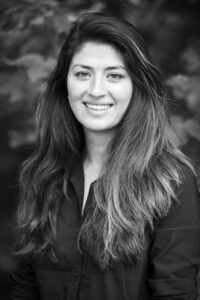
Samina Ansari
Samina Ansari, is the head of public and corporate relations at Equality Check, a Norwegian tech- company with the mission to diversify corporate governance globally. She is also the founding director of Avyanna Diplomacy, a platform with the aim to connect social entrepreneurs from the Middle East and Central Asia to Europe for sustainable growth and stability. She has lived and worked in Kabul, Afghanistan (2015-2021), and actively worked on inclusion in the peace process. Ansari has a background in Cyber Security Law from the University of Oslo and Diplomacy from Sciences Po Paris. She is fluent in English, Norwegian and Dari. Since 2014, Ansari has implemented large-scale social impact projects for North Atlantic Treaty Organization, the United Nations, the European Union, International Trade Center, and Goldman Sachs in the US, Europe, and Central Asia with a focus on human security, economic growth, diversity and inclusion, and human rights.
Participant in:
November 2021 Fellowship: Climate Change, Gender and Conflict
Beyond Borders International Festival 2021: Dispatches from Kabul: Join Allan Little with Eldridge Adolfo, Advisor to the EU Envoy to Afghanistan, Afghan rights campaigner Samina Ansari, Beyond Borders Fellow Mariam Safi, and William Dalrymple, as they discuss the crisis in Afghanistan. (2021)
Titilope Ngozi Akosa
Titilope Ngozi Akosa is a lawyer, policy analyst, researcher, climate and gender expert and the executive Director of Centre for 21st Century issues. Ms Akosa is the Green Climate Fund (GCF) Gender Monitor for Anglophone Africa. She is a member of the continental executive board of the Pan African Climate and Environmental Justice Alliance (PACJA) as well as the South Western Nigeria focal point for Women in Peace Building (WIPNET), Nigeria.
Participant in: November 2021 Fellowship: Climate Change, Gender and Conflict
Comfort Usman Kariko
Comfort Usman Kariko is a Lawyer with years of impactful experience in the development sector in areas of Health, Human rights and Criminal justice reforms. She was called into the Nigerian Bar in 2020 and possesses a Bachelor of Laws from the University of Jos, Plateau state Nigeria. She is trained in Advocacy, Project management, Fundraising, Monitoring and Evaluation, Child’s rights protection, Effective engagement of Civil society in Development and is a certified United States Institute of Peace (USIP) Peace mediator.
She is currently a Program Assistant at Rule of Law and Empowerment Initiative also known as Partners West Africa Nigeria, Kano office and has been instrumental in the release of indigent Pretrial detainees through the Public Defenders project of the organization that has concluded over 600 Pro-bono cases within Four years in Kano state. She partook in the review of the Administration of Criminal Justice Law in Niger state and Bauchi state and the review of the Penal code Law of Bauchi state. In her current position, she offers free legal services to indigents and eng)ges in capacity building and advocacies with the criminal justice actors on the implementation of government policies such as United Nations Resolution 1325, Women Peace and Security Second Generation National Action Plan (NAP 2), Prevention and Countering Violent Extremism National Action Plan (P/CVE NAP), Administration of Criminal Justice Act/Law, UN Resolution 2250 amongst others.
She started her career as an Independent Monitor with the World Health Organization and later as a State Monitor with Kaduna State Primary Health Care Development Agency where she monitored the vaccination of children against the Wild Poliovirus in Kaduna state. She identifies as a social crusader and is passionate about promoting the rights of women and youths and their inclusive participation in governance. She is also an advocate of a faith-based approach to development and is a member of the Youth Wing of the Christian Association of Nigeria (YOWICAN), a member of the Nigerian Bar Association, International Federation of Female Lawyers (FIDA) and currently serves as a Legal Adviser to the Binawa Development Association (BIDA).
Participant in:
November 2021 Fellowship: Climate Change, Gender and Conflict
March 2023 Fellowship: Climate Change, Gender, and Conflict
Ameya Kilara
Ameya Kilara directs the South Asian Leadership Initiative at Inter Mediate, a programme focused on the role of leadership in conflict resolution in South Asia, working in partnership with Conciliation Resources and experts at the Harvard Kennedy School. Ameya has facilitated various dialogue initiatives across the Line of Control in Kashmir and an India-Pakistan track two process with former military and intelligence chiefs. She has provided technical support to the UN’s Office of the Special Envoy for Syria. As a solicitor at Linklaters, a leading international law firm, she helped to promote the mediation of commercial disputes. She holds a Master in Public Administration from the John F. Kennedy School of Government, Harvard University. She has received multiple awards for her work including Temasek Foundation-NUS Leadership Enrichment and Regional Networking Award 2008, the Gleitsman Leadership Fellowship at Harvard’s Center for Public Leadership 2016-18 and the Women of the Future Award 2019.
Participant in: November 2021 Fellowship: Climate Change, Gender and Conflict
Muna Baig
Muna Baig is a Commonwealth, Chevening and Fulbright scholar with an academic and professional background in public international law, human rights and advocacy. As the Director of the Human Rights Commission of Pakistan, she led one of the oldest membership-based NGOs in Pakistan in the areas of human rights and democratic development, which was co-founded by the late Asma Jahangir in 1986. Prior to this, she worked with the International Bar Association’s Human Rights Institute on strengthening the role and independence of the legal profession and the judiciary as well as focusing on rule of law and justice sector reform issues across the MENA region. Muna previously worked in the Middle East to document and refer to the United Nations High Commissioner for Refugees (UNHCR) the most vulnerable Syrian and lraqi refugees in need of third-country resettlement. She gained experience in international law-making and humanitarian diplomacy at the UN Security Council and the Sixth Committee in New York as a member of the International Committee of the Red Cross (ICRC) Delegation to the UN.
Participant in: February/March 2021 Fellowship: Peacebuilding and Women’s Meaningful Participation in Peacebuilding Processes
Zorgh Madi
Zorgh Madi is passionate about promoting gender equality and peace processes in Libya. Zorgh was born and raised in Libya. She studied Political Science and Economics. As a Program Manager at the TWM Organisation and a Women’s Empowerment Assistant at the International Youth Foundation, she is responsible for managing programs and projects that are implemented in both organizations. Through her work, she launched a campaign that promotes peace between Indigenous people and Arabs in Libya. As an advocate, Zorgh is proud to be the first person to include the gender perspective in the Libyan education system. Zorg was inspired to become an advocate by her grandmother, who was one of the first women to attend school in Libya.
Participant in: November/December 2020 Fellowship: Peacebuilding and Women’s Meaningful Participation in Peacebuilding Processes
Vian Ahmed Sadiq
Vian Ahmed Sadiq is an Iraqi-Kurdish activist and humanitarian leader with 6 years of experience in the humanitarian field in leadership roles. She is currently working as a Regional Director at the Lotus Flower NGO that empowers women and girls, particularly Internally Displaced People (IDPs) and refugee communities. Throughout her experiences, she has taken the role of managing and leading various humanitarian staff members in direct response to humanitarian crises in the region starting with the ISIS invasion of Iraq in 2014 and the conflict in Syrian that led to the displacement of thousand Syrian refugees to Iraq and more recently the COVID-19 outbreak in the country. While providing any kind of intervention, Vian ensures that she alongside her team are striving for a world where women and girls are dignified, safe, have access to education and are empowered to participate in their communities, and are able to drive social and economic change.
Participant in: November/December 2020 Fellowship: Peacebuilding and Women’s Meaningful Participation in Peacebuilding Processes
Shan Sherwan
Shan Sherwan is an Economic Empowerment Manager at an international development organization in Iraq. Shan has worked in the field of women’s empowerment for over five years closely working with survivors of conflict, in particular Syrian refugees and internally displaced women. Shan was awarded a full scholarship to earn her bachelor’s degree at University of Southern Indiana and Master of Business Administration (MBA) on graduate assistantship and partial scholarship in the United States. Additionally, Shan has contributed to and reviewed her late mother’s books on the early Kurdish women’s struggle and their achievements.
Participant in: November/December 2020 Fellowship: Peacebuilding and Women’s Meaningful Participation in Peacebuilding Processes
Raghdaa Zedan
Raghdaa Zedan is a researcher in Islamic thought and Qur’anic Studies, and holds a PhD in Islamic Studies from the International College of Islamic Sciences in London and a degree in Law from Damascus University. She is currently a Member of the Mini-Committee for Drafting the Syrian Constitution on the Civil Society List and a Member of the Humanitarian Women’s Network.
Participant in: November/December 2020 Fellowship: Peacebuilding and Women’s Meaningful Participation in Peacebuilding Processes
Leena Taha
Leena Taha is a Gender Analyst at the UNDP Syria Country Office, where she implements projects on gender and the empowerment of vulnerable women. Prior to this, she was the National Gender Programme Lead and Coordinator at the OXFAM Syria Country Office, and Adolescent Development and Participation Officer at UNICEF in Homs and Damascus.
Participant in: November/December 2020 Fellowship: Peacebuilding and Women’s Meaningful Participation in Peacebuilding Processes
Kaushila Sunuwar
Kaushila Sunuwar is one of the Co-Founders of Nepal Unites. She has 6 years of experience as a facilitator and mobilizer. Nepal Unites works with marginalised people on youth leadership, non-violence, reconciliation, conflict transformation, and grassroots movements and focusses on bringing young people from different faiths, cultures, ethnicities and backgrounds together. She enjoys working with and integrating with people in different communities and is committed to writing and sharing their stories, to make their stories and experiences more widely understood. Kaushila has a degree in Sociology from Tribhuvan University, and is now pursuing a Master’s degree in Sociology. In 2019, she took part in the School of Peace Course run by Interfaith Cooperation Foundation which took place in Chiang Mai, Thailand.
Participant in: November/December 2020 Fellowship: Peacebuilding and Women’s Meaningful Participation in Peacebuilding Processes
Gulshan Saglam
Gulshan Saglam has over 27 years of experience in social work, human rights, women and youth empowerment and sustainable development. She is currently the Managing Director of BESME International Group for Humanitarian Assistance. She is involved in social and human rights work and is continuously developing her skills in this field through her participation in many local, regional and international courses and conferences. Through her perseverance and hard work, she has acquired an extensive track record of experience in the fields of social work, human rights, strategic planning and development, and has become an accredited trainer in this field.
She believes in the importance of promoting women’s rights and activating their role in society, and attaches great importance to the empowerment of women, youth and child protection, and considers that development is the key to solving all problems. She has served as the head of the main branch of the Lebanese Women’s Democratic Association for a long time. She is the founder and managing director of the Tamkeen Women Foundation of the Social Welfare Institutions in Lebanon. She holds a degree in law and an MA in International Public Law and is currently a PhD student in International Relations and is currently preparing for her doctoral thesis.
Participant in: November/December 2020 Fellowship: Peacebuilding and Women’s Meaningful Participation in Peacebuilding Processes
Ola Al-Aghbary
Ola Al-Aghbary is a graduate of the Faculty of Law, University of Taiz. She is a Yemeni social entrepreneur. She is the Founder and CEO of the Sheba Youth Foundation for Development and Peace. Ola is the focal point of Youth Platform of Peace (A National Youth-led Coalition for Peacebuilding in Yemen). Her main concern is to empower young people and women to make a positive change in their societies. She started her social and civic work in 2011, when she established many volunteering and social initiatives, and that qualified her at the age of 19 , to be the youngest speaker at the first TEDx event in her city “TEDx Taiz”, where she talked about the importance of civil work and youth initiatives in building peace and enhancing development efforts. In 2013 she was chosen as one of the influential women in Yemen by National Democratic Institute (NDI). In 2017 she was chosen to be a Fellow at the Leaders for Democracy Fellowship Program at the American University – Beirut, Lebanon, where she worked with the Lebanese Peace Labs team. Ola is the founder and key member of the Regional Advisory Youth Majlis in the Middle East and North Africa (RAYAM), which was established by the UNICEF Regional Office, NGOs and United Nations agencies in the Middle East and North Africa region. In 2018 she was chosen as one of the best social solutions makers and young researchers at the Evidence Symposium for Adolescents and Youth in the MENA Region by the UNICEF Regional Office and American University of Beirut. In addition to this she was among six youth who were chosen from the Middle East to be on the Youth Advisory Council at the ‘No Lost Generation Tech Summit’, which was held in Amman in 2019. She has represented Yemen in many local and international workshops and conferences.
Participant in: November/December 2020 Fellowship: Peacebuilding and Women’s Meaningful Participation in Peacebuilding Processes
Alma Hashem
Alma Hashem is a Yemeni feminist and currently works as Safeguarding and Inclusion Coordinator at Islamic Relief in Yemen. She is a member of the Intersectional Feminist Collective (IFC) regional grassroots collective. Alma has been involved in many campaigns advocating for women’s rights and women’s political participation. She has represented women activists in a number of different international trainings and conferences.
Participant in: November/December 2020 Fellowship: Peacebuilding and Women’s Meaningful Participation in Peacebuilding Processes
Sena Namlu
Sena Namlu is a youth activist and social entrepreneur. She is the founder of SisterShip, an online platform aiming to bring together women volunteers from the host community and refugee women in need. Sena often engages with social profit organisations working on girls and youth empowerment. She has initiated many projects such as “We All One & Unique” a research project on women’s rights in Islamic countries and “GSU Student Council” that she founded at her university to empower Muslim girls. She is a board member of YCDC, the representative institution of Youth 20 in Turkey, and the project coordinator of Young Academics Forum, the annual forum of YCDC. She represented Turkey at the Y20 Summit in Argentina and at G(irls)20 Summit in Japan. After graduation, she worked for Doctors of the World – Turkey Office as a Grant Officer. Sena is currently a graduate student at King’s College London.
Participant in: November/December 2020 Fellowship: Peacebuilding and Women’s Meaningful Participation in Peacebuilding Processes
Gülece Şenel
Gülece Şenel completed her undergraduate studies in Economics at Hacettepe University in 2007. She holds two graduate degrees: one in Conflict Analysis and Resolution from Sabanci University (2009) and another in Migration Studies from the University of Sussex (2020). She began her professional career in 2005 as the manager of the Understanding Europe Project, introducing the European Union to the high school students all around Turkey. Over the years, she has built on this project management experience and taken different roles within the scope of different projects. She has worked in international organisations such as the Council of Europe, Search for Common Ground in Washington, D.C, the Food and Agriculture Organisation (FAO) of the United Nations (UN). Currently, in addition to providing consultancy on monitoring and evaluation in the civil society sector, she is a Ph.D. candidate in International Relations at the Middle East Technical University (METU). Her research interests fall in the migration-law-conflict nexus, more specifically, the relationship between migration, legal architecture and the concepts of deservingness, differential inclusion as well as resilience.
Participant in:
November/December 2020 Fellowship: Peacebuilding and Women’s Meaningful Participation in Peacebuilding Processes
August 2022: The Arts as a Tool for Peacebuilding
Dr. Khedija Arfoui
Dr. Khedija Arfaoui is a prominent Tunisian peace activist, feminist, academic, and a member of ICAN’s Women’s Alliance for Security Leadership (WASL).
Participant in: December 2019 Fellowship: Peacebuilding and Women’s Meaningful Participation in Peacebuilding Processes
Razan Wazwaz
Razan Wazwaz is currently a Programme Officer at the Kvinna till Kvinna Foundation in Jerusalem, a Swedish grant-making organisation that supports women’s influence and empowerment in times of conflict and war based on UNSCR 1325. Her work focuses on supporting the civil society in Palestine and Israel to combat gender-based violence, sexual violence and advance the participation of women in peace building initiatives, and advocate for their rights in national and international arenas.
Participant in: April/May 2019 Fellowship: Peacebuilding and Women’s Meaningful Participation in Peacebuilding Processes; MENA Focus
Aaliyah Kulsoom
Aaliyah Kulsoom is a development worker based in Kashmir. She works extensively on women empowerment through skill development and livelihood creation. Aaliyah uses the centuries old art and crafts of Kashmir to empower Kashmiri artisans. Currently, she is working as a program specialist for a World Bank project implemented by Department of Handicrafts in Kashmir in collaboration with an Indian Organisation, Rangsutra Crafts India Limited.
In the past, she has worked in remote parts of Kashmir with female artisans and trained them with modern techniques in various handicrafts. She also linked these female artisans with designers in India, creating market links for their products.
Aaliyah has a Masters degree in Craft Management and Entrepreneurship from University of Kashmir. She also holds masters in Commerce and a post graduate diploma in International Business Operations. She is currently pursuing masters in Development Studies from Indira Ghandi National Open University.
Participant in: August 2019 Fellowship: The Arts as a Tool for Peacebuilding
Nahiya Mahmood
Nahiya Mahmood is from Chittagong, a coastal city in Bangladesh. She is currently a Country Programme Analyst at International Fund for Agricultural Development. Nahiya completed her MSc in Conflict Prevention and Peacebuilding from Durham University, UK in 2020. From her experiences studying and working, she now has a wide network of over 1000 young Asian female leaders pursuing exciting work all over the world. Nahiya has travelled to South Korea and Hong Kong to participate in political economy and international development aid dialogues. Nahiya also worked for a year in Bangladesh in the world’s largest refugee camp supporting Rohingya refugees from Myanmar. Nahiya is a passionate advocate for women’s rights and children’s education. In her spare time, she enjoys listening to podcasts, cooking, and watching the tv show Friends with her friends.
Participant in: March/April 2022 Fellowship: Peacebuilding and Women’s Meaningful Participation in Peacebuilding Processes
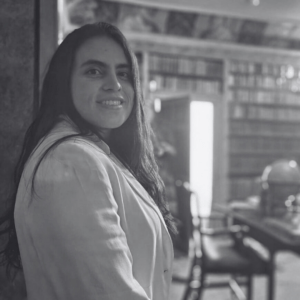
Ana María Aristizábal Ramirez
Ana María Aristizábal Ramirez is a dedicated psychologist and a Master in Peacebuilding. Her professional journey has been marked by a deep commitment to addressing critical issues. From working in conflict zones, where she actively contributed to protection initiatives and the promotion of human rights, to leading environmental conservation projects, her focus has always been on fostering positive change. With substantial experience in project management in conflict-affected areas, Aristizábal Ramirez has tackled challenges head-on, working to protect vulnerable communities and ensure their safety in complex environments. This experience has been instrumental in shaping her approach, addressing immediate needs while laying a solid foundation for sustainable futures. Aristizábal Ramirez’s dedication to environmental protection has driven her involvement in sustainable projects, where she seamlessly integrates conservation efforts with community dialogue and participation. Currently, as an intern at the OAS, she contributes to the area of dialogue, participation, and the environment, with a special emphasis on gender-related issues. Aristizábal Ramirez firmly believes that integrating a gender perspective into all facets of her work is pivotal for building equitable and sustainable societies. Her vision is to continue working at the intersection of rights protection, environmental conservation, and gender equality to create a lasting positive impact.
Participant in:
March/April 2022 Fellowship: Peacebuilding and Women’s Meaningful Participation in Peacebuilding Processes
March 2024: Climate Change, Gender, and Conflict
Yazmin Ramirez
Yazmin Ramirez is a Colombian artist with 20 years’ experience in developing strategies for peace and reconciliation through exercises and artistic processes with vulnerable populations. As an actress, she has contributed with her experience to the formulation of public policy on children and women at national level and in the department of Cundinamarca, and compiled memories of the process to produce the play Otilia with the Juaica Terra group. As a singer and composer she has collected memories of the processes she went through with communities of victims of the armed conflict in Colombia and with reintegrated former combatants who took part in the artistic processes. She has worked in depressed and vulnerable communities in the Amazon, North Santander, Cundinamarca and Tolima. She has been involved in the development of educational processes for children’s and young people’s rights, gender equality and environment in the department. She has lived in the rural area of Tabio Cundinamarca for the last 20 years.
Participant in: March/April 2022 Fellowship: Peacebuilding and Women’s Meaningful Participation in Peacebuilding Processes
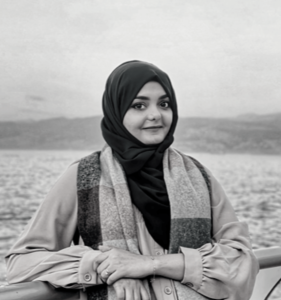
Shaima Bin Othman
Shaima Bin Othman is a Yemeni woman from Hadramawt. She is a human rights defender, especially women’s rights. As a co-founder of Takween Cultural Club and Meemz Arts Initiative, Shaima has been a social activist and volunteer, focusing on the Arts and Culture as a method of advocating for social change since 2016. Shaima is the former CEO of Wa’ai foundation; during her time at Wa’ai, she established the first political forum in Hadramawt /Mukalla. She also participated at the young activist camp in Berlin in 2019 as a young leader from Yemen. She is currently working as a Research Fellow at the Yemen Policy Center (YPC). She has published numerous reports and articles highlighting the role of youth-led initiatives in the peace process. Shaima is a member of the Women Solidarity Network. She holds a Bachelor of Arts in English Literature from Hadramawt University. She was granted a scholarship from the U.S. Middle East Partnership Initiative (MEPI) for the Tomorrow Leaders Program to study her master’s degree in Middle East Study at the American University of Beirut. Shaima’s MA thesis will be revolving around Women Political Participation.
Participant in: March/April 2022 Fellowship: Peacebuilding and Women’s Meaningful Participation in Peacebuilding Processes
Sara Al Mahbshi
Sara Al-Mahbshi is currently a project assistant working on the Feminist Peace Project at Peace Track Initiative. Sara is also an MA candidate at the University of Lethbridge where her research focusses on Yemeni women’s political participation post-2014 conflict. Sara holds a BA in Political Science and History from the American University in Cairo. In 2018, Sara spent 6 months in Sudan working with UNICEF in the Child Protection Section and worked in the fields of child soldiers and alternative families. She is interested in international relations, gender studies and conflict studies.
Participant in: March/April 2022 Fellowship: Peacebuilding and Women’s Meaningful Participation in Peacebuilding Processes
Fatima Outaleb
Fatima Outaleb is a human rights and gender equality advocate and has over 29 years of experience working on women’s issues, women’s rights, women’s empowerment, and gender mainstreaming at a national and regional level. She is a founding member and executive board member of Union de l’Action Féminine (Union of Women’s Action, UAF) and director and co-founder of the first women’s shelter in Morocco. She is the MENA representative in the Global Network of Women Shelters. She holds several positions, mostly as a focal person and gender technical advisor at various national and international organisations and networks including, Danner, Resource Centre for Gender Equality (ABAAD), Feminist Alliance for Rights, United Nations Population Fund (UNFPA), United National Development Programme (UNDP), and International Civil Society Action Network (ICAN).
Fatima holds a diploma in Women’s Rights from Raoul Wallenberg Institute and a certificate from the Human Rights Treaty body at the national level. She has several pubications on gender-based violence and has contributed to the development and editing of shelter training toolkits, as well as various briefs on women’s rights in the MENA region. She recently contributed to a handbook on women victims’ protection and due diligence for the North South Council of Europe Center and a toolkit on minimum standards for a GBV helpline in Myanmar. She has carried out various advocacy activities in Morocco as well as campaign planning, monitoring, and evaluation on gender issues across the MENA region.
Participant in: March/April 2022 Fellowship: Peacebuilding and Women’s Meaningful Participation in Peacebuilding Processes
Beatrice Ndefon
Beatrice Ndefon is a health administrator, gender expert and activist from Cameroon. Her long-term goal as a gender activist is to fight on the elimination of all forms of discrimination and oppression against women and girls within her community, her country and beyond. Beatrice is the Chief Executive Officer (CEO) of Solidarity Health Foundation, a non profit organisation that provides quality and accessible healthcare and social services for vulnerable populations in Cameroon. Her goals and motivations are shaped by her twenty-year experience of working and helping patients in the hospital as well experiences as an activist for peace in the Anglophone regions of Cameroon. Through both her work and activism, Beatrice works to combat Gender Base Violence (GBV), Violence against Women and Girls (VGWg), forced and early marriages, harmful traditional practices such as female genital mutilation (FGM). She also promotes the education of the girl child, comprehensive sexuality education, second chance education and vocational training for girls and their sexual and reproductive rights, and she also provides psychosocial support to internally displaced women and girls. Beatrice also works with men and boys to promote gender equality through He for She programmes.
Beatrice has participated in various peace dialogues and advocacy meetings for community security as well as international dialogues. She travelled to the USA to engage in a dialogue with the diaspora separatist leaders and participated in the Africa Women in Dialogue held in South Africa in 2019. In all of the dialogues that she participates in she focusses on women’s issues and the rights of women and girls.
Participant in: March/April 2022 Fellowship: Peacebuilding and Women’s Meaningful Participation in Peacebuilding Processes
Clariss Rufaro Masiya
Clariss Rufaro Masiya is from Mutare, Zimbabwe. Clariss is passionate about defending the rights of girls, women and other groups who experience social vulnerability and marginalisation. She holds a BSc in Peace and Governance from Bindura University of Science Education. Clariss has worked with many different civil society organisations and she is currently a sitting member for the Local Works Collaborative Action Network Youth Advisory Board which is a body of 20 young people from across all the 10 provinces of Zimbabwe. Clariss has attended several trainings on conflict prevention and peacebuilding including the Youth Participation Program run by Norwegian Agency for Exchange Cooperation (NOREC) and most recently Building Peace from the Inside: Support Insider Mediation for Sustainable Transformation of Conflict, which she took part in in September 2021 at Africa University’s Institute of Peace, Leadership and Governance, Zimbabwe. Clariss loves art, literature, music and she uses writing in particular as an advocacy tool. In 2021 she was nominated for the inaugural The Continent/ Democracy In Africa Comment Prize for her opinion paper titled The Church Must Start Taking Sexual Abuse Seriously and she was also shortlisted for the Intwasa Short Story Prize in 2021 for her short story, The Thing Between My Legs which was published in the Intwasa Short Story Anthology.
Participant in:
March/April 2022 Fellowship: Peacebuilding and Women’s Meaningful Participation in Peacebuilding Processes
November/December 2022 Fellowship: Peacebuilding and Women’s Meaningful Participation in Peacebuilding Processes
Jaya Tiwari
Jaya Tiwari has over 18 years of experience working in the development sector. She currently works at Naz Foundation (India). Naz Foundation is an organisation that works to create a just and equitable society through its programmes that help support and transform individuals from socially and economically excluded communities into agents of change.
At Naz Foundation, Jaya is a Programme Coordinator and Researcher. She is the coordinator of the Goal Programme – a programme that uses a sports-based methodology to help support girls from disadvantaged backgrounds develop life skills and leadership skills. The Goal Programme has support over 80, 000 girls in Delhi, Mumbai and Bangalore in the last ten years. She has worked on a research study funded by the International Centre for Research on Women (ICRW) on Masculinities and Homosexuality. She is also a counsellor on a programme that provides home-based care for people living with HIV.
Jaya often leads training and sensitisation programmes on HIV, Sports4development, leadership skills, LGBTQ rights and on the repeal on Section 377. Jaya is a member of various international networks including Global Leadership Network Vital Voices and Women Sports Leadership Academy.
Participant in: January/February 2022 Fellowship: Peacebuilding and Women’s Meaningful Participation in Peacebuilding Processes
Mina Mahmood Ibrahim
Mina Mahmood Ibrahim is from Baghdad, Iraq. She is currently a Programme Officer at Public Aid Organisation (PAO), Iraq. PAO is an NGO that works on strengthening human rights in society. Her work focusses on women’s empowerment, perceptions of and the implementation of UNSCR 1325 in Iraq, and on changing the discriminatory stereotypes against women. Mina Studied Computer Science at the University of Technology, Baghdad.
Participant in: January/February 2022 Fellowship: Peacebuilding and Women’s Meaningful Participation in Peacebuilding Processes
Bonyan Jamal
Bonyan Gamal is a lawyer based in Sana’a, Yemen. She is currently an Accountability and Redress Officer at Mwatana for Human Rights. She has been working at Mwatana for 6 years. For two years she worked as a field researcher documenting human rights violations by all parties to the conflict, covering several governorates around Yemen. She then worked in the Legal Support Unit providing legal support for the victims of detention related abuses in Yemen, focusing on Sana’a and supervising the team of lawyers in Aden and Al Houdeida governorates. She worked on several cases involving Baha’i and Jewish minorities in Sana’a as well as several cases involving women. She is now working on promoting proper accountability in Yemen through international legal action. She also works on several issues in the international field including international arms trade and US drone operations and detentions in the region.
Participant in: January/February 2022 Fellowship: Peacebuilding and Women’s Meaningful Participation in Peacebuilding Processes
Asmahan Aleriani
Asmahan Aleriani is the General Manager at Enjaz Foundation for Development which is a Yemeni civil society organisation that runs humanitarian response programmes in various fields of work including food and agricultural security, water and sanitation, education in emergencies, economic empowerment, and peace and good governance. She has over 10 years of experience as a trainer and advisor on various social development projects and has particularly focussed upon gender equality, good governance, and peacebuilding projects in Yemen.
Participant in: January/February 2022 Fellowship: Peacebuilding and Women’s Meaningful Participation in Peacebuilding Processes
Shanya Mohammed Saeed
Shanya Mohammed Saeed is from Kurdistan, Iraq. She is currently working as the Communication and Digital Media Officer at the Center for Gender and Development Studies at the American University of Iraq, Sulaimani. She holds a Bachelor of Arts (2015) in English Language and Literature from the University of Sulaimani. Following her graduation, she started working with IDPs and refugees through organisations such as the Global Youth Organization and Un Ponte Per as a mediator and peacebuilding facilitator working to promote peace, social cohesion, and coexistence. As a female in Iraq, she has a strong passion for gender-based causes, women’s rights, and gender equality. Her aim has been to support and encourage women to get a sense of independence and to support them in pursuing decision-making positions in society.
Living in Iraq, one of the most diverse nations in the world with several different communities, Shanya has consistently worked on planting the seed of peace; to engage with different communities despite all the contextual, ethnic, religious, and gender-based variances that exist. The latter being one of the main reasons why she always tries to enrich her background with different cultures and languages in Iraq to understand people’s needs. She hopes to see peace take over the instabilities that occur in Iraq by working to make dialogue sessions a tool for finding common ground in the area, as well as showing the real image of Iraq to the world, not the one that has been illustrated by the media.
Participant in: January/February 2022 Fellowship: Peacebuilding and Women’s Meaningful Participation in Peacebuilding Processes
Baiye Frida Ebai
Baiye Frida Ebai is a Communications Consultant with twelve years progressive experience and a Frontline Defender for women and children in Cameroon.
A Doctoral Fellow in Sociology and Anthropology and an Alumni of the Kofi Annan International Peacekeeping Training Institute Accra, Ghana and Women in Conflict 1325 Fellowship Programme with Beyond Borders Scotland working with Community Based Organizations, Local NGOs,Religious and Traditional institutions committed to peace development and Humanitarian Response in fragile communities.
Through the years, she has obtained skills in facilitating inter-community and cultural dialogues with conflict affected communities and displaced populations in host communities in Cameroon.
Though a leader on Gender, Peace and Security, she has equally received training on DDR, Responsibility to Protect, Women in Conflict Prevention, Atrocity Crimes Prevention & Human Rights, Conflict Analysis and Mediation, Mental Health and Psychosocial First Aid.
She is serving as the Executive Director (BAWAC Cameroon), Project Coordinator-Feminist Engagement Coalition, Coalition For Women’s Right And Empowerment, Skills4Peace/ Tech4Peace Training Programmes, empowering grassroots and Youth/Women leadership to contribute significantly to building resilient communities and individuals.
Frida has a long history working as a facilitator and consultant with National and International Organisations principally GIZ-PAMEC, International Crisis Group, Center for Human Rights Democracy Africa, Defyhatenow_WCA and the Zimbabwe Peace Project.
She currently serves as an Adviser to the Enhancing Youth Capacities and Fostering Dialogues for Peace (ENERGY) project with Local Youth Corner Cameroon and Swisspeace.
Participant in: January/February 2022 Fellowship: Peacebuilding and Women’s Meaningful Participation in Peacebuilding Processes
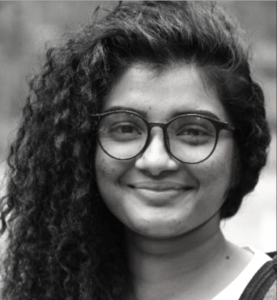
Sanjula Pietersz
Sanjula Pietersz is a young lawyer from Sri Lanka and is currently working as the project coordinator of the Social Justice Commission of Alliance Development Trust, a leading NGO in Sri Lanka which works in the areas of human rights, governance and peace. Her role is primarily associated with mobilizing and empowering grassroot level youth on democracy and human rights in Sri Lanka. Sanjula completed a Bachelor of Law (LL.B.) degree at The Faculty of Law, University of Colombo in 2018.
In 2016, Sanjula received an award as ‘The best young reviewer’ from an alternative newspaper in Sri Lanka. She was the representative of ‘Families of the disappeared’ (FOD) at United Nations Sri Lanka in making the report on the United Nations Security Council Resolution 2250 “Youth, Peace and Security”, in 2017. She contributed as an author for a collection of Tamil language articles published on the 10th anniversary of the end of the Sri Lankan civil war, in 2019.
Sanjula is working very closely with the war affected people in the North and East of Sri Lanka, particularly with families of the disappeared and supporting their struggle towards seeking truth and justice. She actively engages with social movements against enforced disappearances, land grabbing, political prisoners, militarization etc. in Sri Lanka. She has contributed towards addressing the issue through speaking in public platforms as a freelance writer, photographer and a translator.
Sanjula studied photography at ‘Hegoda’, School of Photography. She used her passion and skill on photography to bring out the hidden stories of war victims. She has contributed to photography exhibitions, published photo-stories and her photographs have also been used for other articles. Sanjula was one of the contributors of the “My Sri Lanka, y Future” photography exhibition organized by the United Nations Sri Lanka” in 2014. She was also on of the contributors for the “Unframed” photography exhibition organized by Vikalpa.org (http://unframedsl.org/about-unframed/) in 2018, which highlighted the realities of the post war context in Sri Lanka.
Sanjula is the editor of a Sinhala language E-magazine – Sahurdhaspandhana (Pulsation of Solidarity) – which consists of Tamil literature and art, and strives to signify the unavoidable need for justice through publishing victim’s literature and art in majority language. Such a magazine has not been published for over 20 years in Sri Lanka. She is also a translator who tries to create political consciousness by translating poems and other literary products on conflict written by Tamils into Sinhala. Sanjula is an influencer on social media. She shares information on the national question in Sri Lanka and opinions by re-reading the distorted history of the country, which enlightens the public. In 2020, she and three of her friends started an initiative on social media based on Sinhala and Tamil literature to develop a political dialogue on the ethnic issue in Sri Lanka that aims to reformulate the established social myths regarding minority people’s rights (https://www.facebook.com/groups/1302974290054251).
Participant in:
January/February 2022 Fellowship: Peacebuilding and Women’s Meaningful Participation in Peacebuilding Processes
August 2022 Fellowship: The Arts as a Tool for Peacebuilding
Dr. Marufa Akter
Dr. Marufa Akter is an Assistant Professor at the Department of Global Studies and Governance at the Independent University, Bangladesh. She obtained a PhD in Political Science from University of Bremen, Germany and her dissertation titled: Women’s Political Participation in Bangladesh Parliament: A Case Study Analysis of Women’s Substantive Representation. She has obtained a master’s degree in public policy from Willy Brandt School of Public Policy, University of Erfurt, Germany under a German Academic Exchange (DAAD) Scholarship. She also holds a Bachelor and a Master of Social Sciences degree in International Relations from University of Dhaka. She has attended a one-year graduate course on Peace building, and Conflict Transformation at the SIT Graduate Institute in Vermont, USA. She works in the areas of women and politics; gender and governance; women, peace and security; conflict resolution and peace building.
Participant in: January/February 2022 Fellowship: Peacebuilding and Women’s Meaningful Participation in Peacebuilding Processes
Suparva Narasimhaiah
Suparva Narasimhaiah is currently working as a Gender Specialist for the Security Sector Reform (SSR)/ Rule of Law Programme at UNDP Iraq. She works with the Office of the National Security Advisor in Iraq to mainstream “gender” across the National Security Strategy and the Security Sector Reforms Plan for Iraq. She also engages extensively with the Ministry of Interior, Women’s Empowerment Directorate, Independent Human Rights Commission, and civil society organisations in Iraq to support the implementation of the Women Peace and Security 1325 National Action Plan for Iraq. She additionally works within the UNDP Iraq Country Office to support gender mainstreaming across the Country Office programming on all thematic areas. Prior to working with UNDP in Iraq, she worked for five years with USAID and UNDP in Afghanistan – as a Programme Management Specialist – focusing on Anti Human Trafficking, Rule of Law (SSR and Human Security), Gender (Spotlight Initiative for Afghanistan), and Transitional Justice with the Human Rights Commission in light of the peace talks between the Government of Afghanistan and the Taliban. She has also worked with the International Law Commission, UN Secretariat, International Peace Institute, and United Nations High Commissioner for Refugees.
Suparva graduated with a Master’s in International Law and Diplomacy from the Fletcher School of Law and Diplomacy, Tufts University in 2012. She graduated with her bachelor’s in law from Gujarat National Law University (GNLU), in India after which she clerked with the former Chief Justice of India at the Supreme Court of India.
Participant in: January/February 2022 Fellowship: Peacebuilding and Women’s Meaningful Participation in Peacebuilding Processes
Zaina Waturi Kombo
Zaina Waturi Kombo is an Advocate of the High Court of Kenya and a Woman Human Rights Defender. She has over 7 years of experiences working in human rights and development with a mix of both grassroots organising and policy influencing. She holds an LLB and LLM in Law, Governance and Democracy both from the University of Nairobi. She is an active member of Federation of Women Lawyers (FIDA) – Kenya, International Commission of Jurists (ICJ) – Kenya and the Law Society of Kenya. She holds a certificate from the African Union on Gender Mainstreaming in Peace Support Operations, she is a trained budget facilitator on Gender Responsive Budgeting (By Institute of Public Finance Management – Kenya), and completed training on results-based project management (by Swedish Development Agency) as well as training on inclusion and nondiscrimination (by LSU – Sweden).
In her various experiences, she has worked with youth and women in efforts to prevent violent extremism. In her current role she is involved in peace and security initiatives geared towards security accountability in African countries through capacity building and supporting grassroots human rights organisations in Kenya and beyond.
Zaina Kombo believes that women still need to fight for their space in development and decision-making processes as the “glass ceiling” has proved to have numerous layers in different contexts of the world.
Participant in: January/February 2022 Fellowship: Peacebuilding and Women’s Meaningful Participation in Peacebuilding Processes
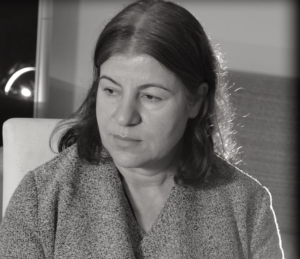
Bahar Ali
Bahar Ali is the Director of Emma Organisation for Human Development in Erbil, where one of their main focuses is upon the implementation of UNSCR 1325. Prior to this role, Bahar was a UNFPA and UN Women consultant on developing strategies for ending violence against women in Kurdistan and the elimination of GBV. She has taken part in numerous conferences on service provision for GBV survivors, combatting violence against women, and gender issues in Iraq.
Participant in: May 2018 Fellowship: Peacebuilding and Women’s Meaningful Participation in Peacebuilding Processes
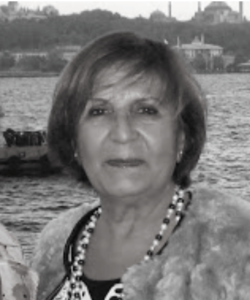
Khadija Arfaoui
Khadija Arfaoui is a Tunisian former academic. She worked as an English teacher, a vice-principal and principal before teaching at the University of Tunis. She was a teaching assistant at George Washington University in 1978-1979 and 1979-1980 (where she got her M. Phil in 1992), and a Fulbright lecturer at Lake Forest College (2005). She joined civil society in the mid 1980s and has since then worked extensively to promote environmental issues and women’s claims to equality, peace and stability. She is a freelance researcher, lecturer and feminist activist and has had several articles published, particularly about women’s rights in the Middle-East and North Africa.
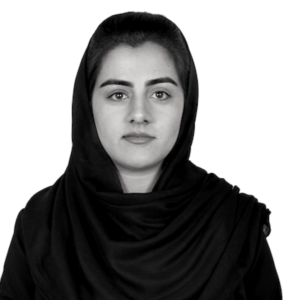
Soudaba Wahabzada
Soudaba Wahabzada is a Peace and Reconciliation Associate with UNAMA, where she contributes in projects promoting peace and conflict resolution in remote provinces of Afghanistan with a focus on women’s inclusion in mediation, conflict resolution, and peace negotiations. In addition, she has been working on providing practical legal courses and legal aid clinics focusing on gender-equality and promoting women’s access to free legal aid services and justice institutions.
Soudaba was born and grew up in a remote district (Injil) of Herat province where she graduated with the honor of first-grade student of her school. She then the American University of Afghanistan (AUAF) through U.S Embassy Scholarship in 2015. She was selected to participate in and represent AUAF in the Nuremberg Moot Court Competition in 2016 in Germany and was selected as a member for Gujrat International Moot Court competition in 2018 in India. In December 2018, she graduated from AUAF majoring in Law and minoring in English with a GPA of 3.90 and she was selected as the Valedictorian for AUAF Graduating Class of 2019.
Soudaba’s great passion is to contribute in achieving a sustainable peace in Afghanistan, especially by building capacities on conflict analysis and peacebuilding as well as to protect fundamental human rights in conflict-affected communities. She is currently writing a short story displaying the effects of child marriage and unpleasant traditional stereotypes on Afghan girls’ lives.
Participant in: December 2019 Fellowship: Peacebuilding and Women’s Meaningful Participation in Peacebuilding Processes
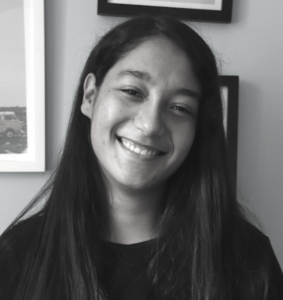
Anusha Maharjan
Anusha Maharjan is a spoken word poet, podcaster and a youth-activist who leads youth movements in Kathmandu, Nepal. Anusha works as Vice-President in the only youth-led NGO in Kathmandu named ‘We’ for Change. The NGO promotes spaces for leadership for young people aged 16-24 years. She is a passionate activist of the Global Goals and is motivated to work towards building a sustainable and peaceful society where there is equity, peace and justice, and equal rights. She believes we all have the power to bring people together and change the world through our words, our voices, and our kindness.
Participant in: November/December 2020 Fellowship: Peacebuilding and Women’s Meaningful Participation in Peacebuilding Processes
Shokhan Ahmad
Shokhan Hama Rashid Ahmad is a human rights defender and activist working in the Iraqi Kurdistan Region. Ahmad is the director of Women’s Legal Assistance Organization (WOLA). WOLA is the first women-led legal aid organisation in the Iraqi Kurdistan Region. She is a member of the board of directors of the federation of civil society organisations. Ahmed has been working for more than 16 years to protect the rights of women, especially the victims of honour killing.
Shokhan is also a trainer in the field of domestic violence and advocacy. She regularly arranges seminars and workshops to raise legal awareness about domestic violence. She had a key part in the advocacy and campaigns for the passing of the domestic violence law at the Kurdistan Parliament. She received an honorary recognition from the Kurdistan Parliament for her work on laws related to women. She received the Dutch Consul’s Award in 2017 for working to reduce and eliminate female genital mutilation in different regions in Iraq, as well as activities that have led to the enactment of domestic violence law. Shokhan believes that women need to be bold by stepping up and ending violence and other abuses perpetrated against them.
Participant in: February/March 2021 Fellowship: Peacebuilding and Women’s Meaningful Participation in Peacebuilding Processes
Amal Abdulqader Al-Bokhiti
Amal Abdulqader Al-Bokhiti is the Executive Director of AWAM Foundation for Development and Cooperation, an independent non-profit organisation based in Yemen concerned with issues of democracy, good governance, peacebuilding and human rights, and especially strengthening and achieving women’s rights in conflict areas. She is also the head of the initiative Shahab Peace for Peacebuilding. Amal has been working in the field of women’s rights since 2010 and works on raising awareness at community level on gender-related issues including early marriage, women’s participation in decision making, and women empowerment. Since 2015, Amal has been involved in convening meetings with Yemeni women on peace and security issues. She is a member of the 1325 Alliance for Women’s Issues and Link Alliance for Yemeni Women. She has participated in a number of workshops and meetings to support women’s participation in peacebuilding and conflict resolution, mostly in Amman, Beirut and Cairo.
Participant in: February/March 2021 Fellowship: Peacebuilding and Women’s Meaningful Participation in Peacebuilding Processes
Dr. Nadia Al Sakkaf
Dr. Nadia Al Sakkaf is a professional researcher with expertise in policy and politics research with a solid background in communication and advocacy. She has worked extensively in both academic and practical aspects of politics, as well as in government. In 2014 she was the first woman to be appointed Minister of Information in the Republic of Yemen.
In addition to her academic research and policy papers, Nadia also specialises in developing and implementing communication strategies. Her combined experience in journalism, non-profit organisation, academic research, advocacy and policy enables her to produce cross-cultural effective and engaging campaigns. While working in the non-profit sector, a part of her job was designing strategies and policy papers as well as oversee their implementation, and to train partners and stakeholders in relevant aspects. In recognition of her work in the public domain, Nadia has received several international awards including the Oslo Business for Peace Foundation Award in 2013, being the first Arab woman to be awarded so.
Participant in: February/March 2021 Fellowship: Peacebuilding and Women’s Meaningful Participation in Peacebuilding Processes
Wimarshana Ranasinghe
Wimarshana Ranasinghe is a peace builder and a facilitator. In the last eight years, she has been involved in various programmes run by Initiatives of Change, India and Sri Lanka. Wimarshana was part of Initiatives of Change for Life (IfL) a 3-year outreach programme. She has supported and been part of the organising committee for various youth conferences. She has initiated and supported the planning and organising of (IfL) team outreach in Sri Lanka. Wimarshana is a certified trainer of Creators of Peace-Women Peace circles. She has experience of facilitating peacebuilding and nonviolent communication programmes for inter-religious leaders, government officers, teachers, university students, and community leaders. Wimarshana is passionate about community building, inner peace and healing.
Participant in: February/March 2021 Fellowship: Peacebuilding and Women’s Meaningful Participation in Peacebuilding Processes
Nyuon Susan Sebit
Nyuon Susan Sebit (Suzy) is a seasoned young lawyer/advocate passionate about the rule of law and access to justice with a wide range of experience and training in Justice Peace and Security. She specialises in women and girls’ rights, women, peace & security, youth, peace & security and human rights. She believes in equality of all before the court of law. Ms. Susan holds Bachelor of Law (LLB) from the University of Juba, 2013 and had several years of training in the field of human rights, mediation and conflict resolution. In 2018, Suzy joined the Global Network of Women Peacebuilders (GNWP), as the third recipient of the Cora Weiss Fellowship for Young Women Peacebuilders. Through this fellowship, she can join the GNWP International Coordinating Team where they work to promote effective implementation of UNSCRs 1325 and 2250, and the supporting resolutions on women, peace, and security. She supports the youth, peace and security agenda at the national and local levels. She has previously worked with UN Women South Sudan Country Office on the Ending Violence Against Women and Girls programme. Suzy is a founder and the Executive Director of National Alliance of Women Lawyers (NAWL) where she works to promote and protect women and girls to ensure the implementation of women peace and security and ending violence against women and girls. Suzy advocates for women’s participation at all levels of governance and leadership. Susan believes in gender equality and the empowerment of women and girls to unleash their full potential and be most effective to their society and the nation at large. Susan believes that women’s economic empowerment through education will lead to key leadership positions and equal pay.
Participant in: February/March 2021 Fellowship: Peacebuilding and Women’s Meaningful Participation in Peacebuilding Processes
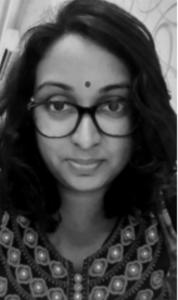
Ishika Millaniyage
Ishika Millaniyage specializes in youth leadership and community peacebuilding with over 10 years’ experience working with leading local and international civil society organizations such as Sarvodaya movement, Australia Awards – Afghanistan, UNFPA, and is currently attached to Internews Sri Lanka as a senior project officer. During her career as a program coordinator with Sarvodaya, Sri Lanka’s largest civil society movement, Ishika has represented Sarvodaya at National Reconciliation Policy drafting consultations and National Transitional Justice taskforce consultations. Ishika holds a MSc. in Project Management from the University of Bedfordshire, UK, a post graduate diploma in Peace and Conflict studies from University of Colombo, Sri Lanka, and is currently pursuing her second BSc. degree in the Psychology stream from Cardiff Metropolitan University, UK. She has represented Sri Lanka at the Youth Town Hall – Summit for Democracy 2021 organized by Joe Biden administration and has also served as a judge of the Royal Commonwealth Society – the Queen’s Commonwealth Essay Competition 2021. She was a Beyond Borders -Women in Conflict 1325 fellowship recipient in 2020 and is a US Department of State Alumnus; a Community Solutions – Tolerance and Conflict resolution Fellow 2015 and has worked with Little Friends For Peace (LFFP) on peace education curriculum development and facilitating peace building and conflict resolution training. She has also served in the US State Department Community Solutions, and Community Engagement Exchange fellowship program selection panels for five consecutive years since 2017. In 2013, she was appointed by the National Youth Services Council Sri Lanka to serve the Brunei High Commission as a Youth Ambassador during Commonwealth Heads of Government Meeting (CHOGM). Ishika is a volunteer of Sri Lanka Unites Youth movement since 2012 and is also attached to Global Unites, and Centenary Movement as a core team member.
Participant in:
November/December 2020 Fellowship: Peacebuilding and Women’s Meaningful Participation in Peacebuilding Processes
August 2022 Fellowship: The Arts as a Tool for Peacebuilding
Filo Tuivanulevu
Filo Tuivanulevu is originally from Fiji, in the South Pacific and holds a M.A in International Development from the University of Sussex, with specialism in Participation, power and social change. She is currently International Projects Coordinator at the 2050 Climate Group. She has worked in the areas of development, gender equality, youth and young women’s leadership in Fiji and the Pacific. Filo’s areas of interest include, exploring the challenges of power relations, participation and young people’s engagement in development and civic processes. She is also interested in engaging in change processes in pursuit of social justice. Prior to joining 2050 Climate Group, Filo has worked in development programmes that aim to build on young people’s leadership potential, and find ways to effectively engage in decision making spaces. She has also worked in programmes that aim to address gender inequality and the exclusion of women and girls from decision making processes that affect them.
Participant in: November 2021 Fellowship: Climate Change, Gender and Conflict
Amb. Caroline Orobosa Usikpedo
Amb. Caroline Orobosa Usikpedo is the Executive Director of Noble Delta Women for Peace and Development formerly known as Niger Delta Women’s movement for Peace and Development, a non-governmental organization in special consultative Status with the United Nations ECOSOC, Accredited to the United Nations Environmental Program and the Green Climate Fund and Partner organization for GNDR/VFL 2019 with a vision to empower the Niger Delta Women and the most vulnerable people in the region and for the promotion and realization of their rights, and Women constituency focal point for GCAP Africa.
She is the Deputy Secretary General (Africa) for the International Human Rights commission, an Ambassador for Peace, a Chartered Administrator from the Chartered Institute of Administration, Lagos, and a graduate of Government / Public Administration from Imo State University, Owerri, and Holds a Certificate on Climate Change and Governance from Wageningen University, Netherlands. She is an international speaker, and has participated in ongoing global debates on gender, climate change and environment and will continue to share the Niger Delta cases with the world in hopes of raising awareness.
Caroline and her organization NDWPD has been committed to reducing extreme poverty by fighting climate change and environmental pollution which is the root cause of poverty and conflict in the Niger Delta and empowering women and girls to reduce their vulnerability.
Participant in: November 2021 Fellowship: Climate Change, Gender and Conflict
Reem Belkeir
Reem Belikeir is a Libyan activist and human rights defender. She holds a Bachelor’s Degree in Law and is a Human Rights and international humanitarian trainer. Reem is also an advisor to Libya’s National Anti-Corruption Commission (NACC). Reem has a strong interest in Libyan general affairs and human rights issues. She is a civil society activist and is the head of an organisation that supports youth and women.
Participant in: February/March 2021 Fellowship: Peacebuilding and Women’s Meaningful Participation in Peacebuilding Processes
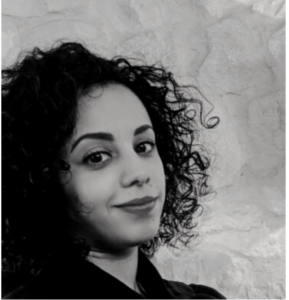
Hana Al-Showafi
Hana Al-Showafi is based in Yemen and works in the fields of women, peace and security, inclusive governance, and conflict resolution as well as youth empowerment on local and community level. Hana Al-Showafi is currently the Gender Policy Officer at the Embassy of the Netherlands in Yemen. She has experience of over eight years in working under extreme conditions of political instability, war and conflict with a number of aid and development International Non-Governmental Organisations (INGOs), as well as local stakeholders in Yemen. She is a member of #SupportYemen Art Collective and a member of the Broader Middle East and North Africa (BMENA) Chatham House Initiative, as well as a delegate of Generations for Peace.
Participant in: February/March 2021 Fellowship: Peacebuilding and Women’s Meaningful Participation in Peacebuilding Processes
Shatha Al-Aghbari
Shatha Al-Aghbari a Yemeni Peace activist and digital marketing specialist. Programme Officer at Sisters Arab Forum for Human Rights (SAF). SAF is an independent, non-governmental feminist organization that has been working since 1999 to defend human rights in Yemen. She is also coordinator of Women’s Voices of Peace Network, that focuses on women, peace and security in Yemen. Shatha is a member of Arab Voluntary Union, Arab African Council for Integration and Development and Eval_Youth that work on an Arab and regional level regarding youth and development. She has been working in the field of peace and gender since 2015. She has been participating in many conferences, workshops and trainings regarding peace and gender at the Arab and international level, including the Torino Forum for Sustaining Peace. Recently, She is working in the field of empowering women within the framework of Resolution 1325. Shatha is a member of YPS-Pact, Women’s Solidarity Network and Civil Agglomeration of Taiz Youth. She holds a bachelor’s degree in Marketing from Sana’a University.
Participant in: February/March 2021 Fellowship: Peacebuilding and Women’s Meaningful Participation in Peacebuilding Processes
Nyaboth Paska Alfred
Nyaboth Alfred is a youth and women’s rights activist. Nyaboth is the Advocacy Coordinator for South Sudan Council of Churches. She is also a Founding Member of Organisation for Responsive Governance (ORG) a civil society organizstion keenly involved in monitoring the implementation of the Revitalized Agreement on the Resolution of Conflict in South Sudan, R-ARCSS. Nyaboth is a trained peacebuilder and for the last five years has been working with both national and international organisations to contribute to a peaceful and gender equal society. She is currently an Expert in the Intergovernmental Authority on Development (IGAD) Roster of Technical Experts in the Mediation Support Unit (MSU), she provides technical support to mediators and mediation processes in the IGAD region.
Nyaboth is passionate about youth and women rights issues, her work at the community level contributes to changing the minds of young people about violence especially towards women. Her work also involves empowering women to speak up about violence at all levels. She also mentors girls who are survivors of violence both in IDP camps and in schools. Nyaboth contributed to the development of Youth, Peace and Security 2250 document ‘The Missing Peace’. Ms. Nyaboth believes that a society can achieve a sustainable peace and development when women are absolutely respected and included in the issues facing the societies.
Participant in: February/March 2021 Fellowship: Peacebuilding and Women’s Meaningful Participation in Peacebuilding Processes
Mary Deng
Mary Deng was born in South Sudan and grew up in the East Africa region, where she pursued her early education and later moved to Australia to continue her studies and achieved a Diploma in laboratory technology and a degree in Medical Science at the Queensland University of Technology. She settled back in South Sudan after her studies, where she works for world health organization (WHO) as a consultant/technical officer. She later become the founder and the executive director of Hope Beyond Adversity (HBA). She has years of experience in humanitarian settings and in the private sector. She’s a member of many associations who are working for the interest of women. She also works as a facilitator and a trainer as part of her consultancy works; she recently facilitated lobby and advocacy training for women parliamentarians in South Sudan. Her previous work experiences enable her to effectively use her professional skills in her current position as the executive director of hope beyond adversity. In this position, her role is to oversee the administration, programme and strategic plan of the organisation, resource mobilisation, and to organise community outreach programmes especially for women. Mary is an activist and a peacebuilder and is passionate about women peace and security as well as women empowerment.
Participant in: February/March 2021 Fellowship: Peacebuilding and Women’s Meaningful Participation in Peacebuilding Processes
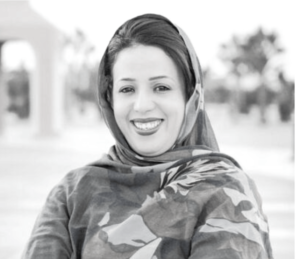
Aicha Duihi
Aicha Duihi is a researcher in human rights and economics. She is the President of the Sahara Observatory for Peace, Democracy and Human Rights, a member of the National Commission for the Coordination of Measures to Combat and Prevent Trafficking in Human Beings, and a founding member of the “WE” network for women’s rights defenders in North Africa and the Middle East. Aicha has dedicated most of her career to working on human rights issues and development in her region and has contributed to the creation of many civic initiatives, particularly in the defence of human rights at the local, national and regional levels. Aicha has also established many projects for children, adolescents, young adults and civil society. In March 2019, she was awarded the European Award for International Women’s Leadership at the European Parliament, Belgium.
Participant in: February/March 2021 Fellowship: Peacebuilding and Women’s Meaningful Participation in Peacebuilding Processes
Manjula Vijay
Manjula Vijay is a Programme Manager of Operation Red Alert, a programme run by My Choices Foundation – an organisation committed to stopping domestic violence and sex trafficking in India. She handles documentation of the process of the Safe Village Program, from approvals to follow ups. She also manages the Red Alert Helpline and documents all of the Data received.
Manjula has always believed in gender equality and justice, but her voice was heard, and views validated when she started working for a feminist organisation in 2013. This was the beginning of her commitment to working for justice and safety of women and girls. Believing that children are the hope for the future, she is passionate about interacting with young children about issues of gender discrimination, equality, and violence against women. Manjula is a passionate learner and is always looking to acquiring new skills and constantly keep herself updated.
Participant in: February/March 2021 Fellowship: Peacebuilding and Women’s Meaningful Participation in Peacebuilding Processes
Jini Agrawal
Jini Agrawal, a resident of Nepal, has experience working in media, private consulting firm, and international non-profit. She has been leading Miyamoto offices in Nepal and has supported in recovery and rebuilding efforts since the 2015 Nepal Earthquake. Prior to that, she has worked with national and international media, her major focus being disaster and women issues. She has worked with indigenous communities in the rural parts of the country focusing on housing and livelihood issues. She is a board member of Initiatives of Change Nepal and is actively involved in design and implementation of the trust building program that focuses on bridging gaps between different communities within the country. She is also the National Coordinator for Women’s Peace Circle.
Jini completed her master studies from University for Peace in Costa Rica in Media, Peace and Conflict studies. She has attended several trainings on mediation, negotiation, peace, reconciliation, and justice. She loves to experience culture and food during travels, to visit war and history museums, and to read non-fictional books.
Participant in: February/March 2021 Fellowship: Peacebuilding and Women’s Meaningful Participation in Peacebuilding Processes
Hana’a Hamood Abbas
Hana’a Hamood is from Baghdad, Iraq. She has been working in the NGO field in Iraq since 2004 and she is currently the head of the administrative board for the Public Aid Organisation (PAO) and is a member of the Iraqi Women Network (IWNW). Her work focusses on women’s empowerment and on changing the discriminatory stereotypes against women. She is working with colleagues from the Iraqi Women Network on establishing new legislation concerning women’s rights. She has also written reports including a shadow report on the CEDAW convention, and the reality of implementation of UNSCR 1325 in Iraq. During the conflict she started worked closely with Iraqi IDPs and returnee women, specifically on protection and economic empowerment and continues this work today.
Participant in: February/March 2021 Fellowship: Peacebuilding and Women’s Meaningful Participation in Peacebuilding Processes
Dr. Aishath Rafiyya
Dr. Aishath Rafiyya has over 18 years of management and administrative experience in various capacities such as banking, diplomacy, social activism, women’s empowerment, business, tourism and NGO management. Rafiyya holds a doctorate degree in Politics & International Relations, Master’s in Business Administration, and a Master’s in Information Technology. Rafiyya currently holds multiple positions at various institutions in the Maldives and abroad. She is a Director at the Sun Siyam Group of Companies, Founding Member & Deputy Leader of the political party Maldives Development Alliance (MDA), Director of the Global Peace Institute (GPI), and an elected Member at Women Development Committee (WDC) of Male’ City Council. Rafiyya is also the Founding President of the Regional Alliance for Fostering Youth (RAFY) – the first international NGO established in the Maldives. She has been involved in peacebuilding missions for a decade and has been contributing to National Counter Terrorism Centre (NCTC) Maldives as a consultant, contributor to UNDP Maldives and is an invited expert from to UNODC events on preventing and countering violent extremism. She has founded several platforms for young people to be involved in the global peacebuilding mission such as the Global Peace Ambassadors Program, Global Teens Peace Summit, Global Youth Peace Summit, Girls Peace Talk show, Maldives Youth Peace Summit among others.
Participant in: February/March 2021 Fellowship: Peacebuilding and Women’s Meaningful Participation in Peacebuilding Processes
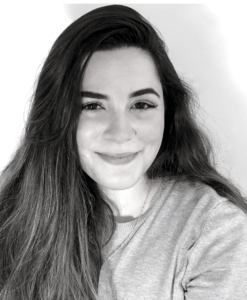
Aïcha Madi
Aïcha Madi is a political analyst that specializes in security and gender issues. She currently serves as a feminist peace project officer at Peace Tack Initiative, a women-led Yemeni NGO that promotes women’s participation in the peace and political processes in Yemen. She has had several field experiences in the MENA region where she worked with women victims of sexual and gender-based violence as well as with mothers of victims of enforced disappearances and victims of torture.
Aïcha holds a Bachelor’s degree in international studies with a peace and security concentration, and a Master’s degree in public and international affairs, with a specialization in political communication and journalism. from the University of Montreal (Canada). She also studied at the UN Mandated University for Peace where she focused on the protection of refugees and women’s participation in peacebuilding. Her research interests lie in the study of international security threats such as armed conflicts, terrorism, radicalization, corruption, and gender issues. Her latest research on collective memory trauma and transitional justice processes was published in the International Rehabilitation Council for Torture Victims’ Journal of Torture.
Aïcha has also worked with a team of Canadian researchers on the prevention of radicalization leading to violence in North America. She cultivates an approach that promotes peace, security, and gender equality and that focuses on victim impact analysis.
Participant in: February/March 2021 Fellowship: Peacebuilding and Women’s Meaningful Participation in Peacebuilding Processes
Nyachangkuoth Rambang Tai
Nyachangkuoth Rambang Tai is a feminist, a peace activist, human rights defender, and is a co-founder of The Mother Care Organization. She is the special Assistant to the AU chairperson advisor on policy and strategic relations with the African Union Organs (AUO). Nyachangkuoth is also head of Gender Programmes at the Assistance Mission for Africa (AMA). Nyachangkuoth raises awareness of the cross-cutting nature of gender equality considerations in the social, economic, political, scientific, cultural, and educational fields. She seeks the participation and inclusion of women in decision-making processes and the protection of women from all types of violence. Nyachangkuoth also conducts trainings and workshops that empower women to embrace free, just, dignified, and self-actualizing lives in South Sudan. In her work, she incorporates the Generation Change training manual, which has allowed her to effectively transform her community. She was a USIP youth advisory council member, and she briefed the UN Security Council on South Sudan representing South Sudan Civil Society. Nyachangkuoth is a graduate of Bahr El Ghazal University with a bachelor’s degree in Economics and Social Studies.
Participant in: November/December 2020 Fellowship: Peacebuilding and Women’s Meaningful Participation in Peacebuilding Processes
Sudha Upadhyayula
Sudha Upadhyayula has over 20 years of experience in both the corporate and social sectors. She has a strong project management background. Structuring efficient processes, building scalable technology ecosystems enabling seamless growth in operations are her strengths. With a desire to contribute to society, she decided to build a career in the social sector and joined My Choices Foundation’s Operation Red Alert as Head of Operations in August 2016. She believes in the concept of lifelong learning and is pursuing a Ph.D. from the Tata Institute of Social Sciences. The Indian concept of “Vasudaiva Kutumbam” – “the world is one family” is very close to her heart which says that the happiness of a society depends on the happiness of each and every person within it. She constantly strives to pursue activities to build happy communities.
Participant in: November/December 2020 Fellowship: Peacebuilding and Women’s Meaningful Participation in Peacebuilding Processes
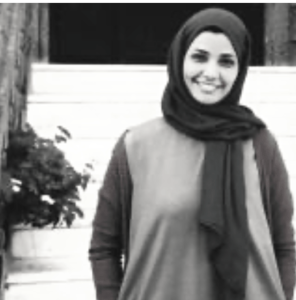
Ola Ali
Ola Ali is a technical and qualified WASH Senior Engineer with project and delivery experience in the humanitarian and private sector. She has extensive experience in development and building organizational capacity in fast-paced, start-up and community centred environments with a particular focus on built environments. Her background provides a combination of strong technical skills with field experience where she often works in collaborative and multicultural settings. Ola is currently a Chevening Scholar and is completing a master’s degree in Water and Environmental Engineering at the University of Surrey, Guildford.
Participant in: November/December 2020 Fellowship: Peacebuilding and Women’s Meaningful Participation in Peacebuilding Processes
Tahani Yaghshi
Tahani Yaghshi is from Damascus, Syria. She has a BA in English Language and Literature from Damascus University. During her senior year, the war in Syria broke out and she felt responsible to volunteer and helped displaced people inside Damascus and conducted first- aid and evacuation measures workshops for youth. After graduation, she taught English at Damascus University. She decided to leave teaching and follow her passion for community development and peacebuilding. For the last seven years, she has been volunteering and working with different community-based organisations and youth teams inside Syria. She is a board member of Hayat Association that works to empower youth and support women. She works as a facilitator and communication assistant at Mobaderoon to support and sustain peaceful coexistence in Syria. In recognition of her peace work in Syria, she was invited to meet the noble peace prize winner his holiness the 14th Dalai Lama in his residence in Dharmsala, India in 2019.
Tahani believes in the Arabic ancient proverb that says “People are enemies to what they are ignorant of.” In her opinion, the majority of conflicts that have happened or are ongoing in the world result from a lack of knowledge and ignorance, which is why she pledges to spread authentic knowledge between different people, cultures, and beliefs. A knowledge that is based on personal and honest communication and real experiences. She works towards using the power of dialogue and to bring people together.
Participant in: November/December 2020 Fellowship: Peacebuilding and Women’s Meaningful Participation in Peacebuilding Processes
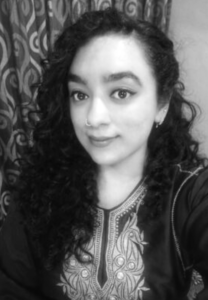
Iqra Zaffar
Iqra Zaffar is a Researcher at the Central University of Kashmir. She has a keen interest in issues related to gender and social justice. She has conducted numerous studies on the impact of conflict on women. In her latest work, she has documented the effect of perpetual lockdowns on women experiencing domestic violence in Kashmir. As a part of her doctoral research, she is currently studying the impact that gender has on happiness and performance in the workplace. She is also a Samanbal member, which is a programme that provides safe space for women to express themselves and share their experiences about the ongoing conflict in Kashmir.
Participant in: February/March 2021 Fellowship: Peacebuilding and Women’s Meaningful Participation in Peacebuilding Processes
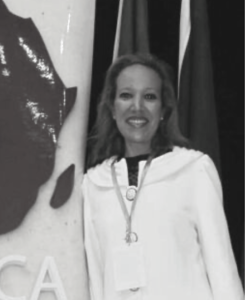
Naima Korchi
Naima Korchi, a Moroccan and French citizen, is an international lawyer. She is a former United Nations staff member and now an international consultant. She is advocating as NGO leader for women’s rights and as such, she is a regular speaker at international conferences all around the world. Among other humanitarian activities, she recently founded the Africa Women’s Forum to enhance the Africa women leadership and promote their visibility internationally. The Forum gather each year key leaders from all field in Africa and beyond. She also advocates for a leadership taking a better consideration of people culture and identity.
She also directed workshop for top officials on women capacity in key positions. Then she is among the first one to manage, in North Africa, seminars on women and peace building. As an international strategic manager, she advices administrations, NGO’s, international firms on legal issues and international development.
Lailufar Yasmin
Lailufar Yasmin is a Professor in the Department of International Relations, University of Dhaka, Bangladesh, and a doctoral candidate in the Department of Modern History, Politics and International Relations at Macquarie University, Sydney. She has written extensively on secularism in Bangladesh and on South Asian issues. Her latest research involves religion and politics, ethnic issues, maritime security and gender and conflict related issues. She offers courses on International Relations theories, nationalism and ethnicity, and gender and development.
Participant in: February/March 2021 Fellowship: Peacebuilding and Women’s Meaningful Participation in Peacebuilding Processes
Zineb Benalla
Zineb Benalla is an international expert and consultant in preventing and countering violent extremism, counter terrorism and peacebuilding who spent years working in violent extremism hotspots in the Maghreb, Sahel, and the Middle East. Zineb Benalla has a long experience working with international organisations, civil society, communities, religious leaders, traditional leaders, and with policy makers across many countries and continents.She was nominated for the International Women of Courage Award in 2015 for her work in preventing and countering violent extremism and building peace in the Sahel and Maghreb region. She was awarded Alumna of the Year by Alakhawayan University, Morocco for her outstanding career after graduation. She won The International Studies Association Peace Section and Kroc Institute for International Peace Studies Global South Peace Award in 2020 for her work and research on gender equality and preventing and countering violent extremism in the Maghreb and Sahel.
Zineb Benalla is the CEO and Founder of Eirene Associates Int. which is the first international development and security company in Morocco, she is also the co-founder of a civil society organisation working on transnational violence and countering violent extremism. Zineb Benalla is a visiting professor at the intersession unit at Alkhawayan University where she teaches ‘Rethinking Counter terrorism in Africa: Lessons in Prevention’. Zineb Benalla holds a bachelor’s degree in International Relations from Alakhawayn University, Morocco and Georgetown University, USA. She holds a Degree in International Law from Kent Law School and Brussels School of International Studies.
Participant in: February/March 2021 Fellowship: Peacebuilding and Women’s Meaningful Participation in Peacebuilding Processes
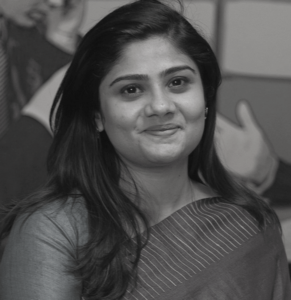
Kritika Krishnamurthy
Kritika Krishnamurthy is a mediator with the World Bank. She is a co-author of the legal best seller “The Art of Negotiation and Mediation- Wishbone, Funny bone & a backbone” by LexisNexis. The book is recommended reading for the mandatory course on mediation (with negotiation) by the Bar Council of India. She is an empanelled mediator with the National Company Law Tribunal (NCLT) and Appellate Tribunal for matters under Companies Act, 2013. She is also an External Consultant to Indian Institute of Corporate Affairs, Ministry of Corporate Affairs, Government of India on commercial mediation and negotiation and has advised Bombay Chamber of Commerce and Industry on institutional mediation. She practices private commercial mediation including shareholder disputes, investor disputes and community mediation for commercial projects. She is a trained mediator from Ministry of Law and Justice, Government of India. She is a recipient of United Nations 1325 Fellowship on Women in Conflict. She is a BW Legal 40 under 40, India Business Law Journal Future Legal Leader and Forbes Legal Powerlist winner for 2020.
Participant in: November/December 2020 Fellowship: Peacebuilding and Women’s Meaningful Participation in Peacebuilding Processes
Nadia Gamal
Nadia Gamal is a feminist, Humans Right Defender and advocate for the rights of women and girls. Nadia is the Women, Peace and Security Senior Officer at Peace Track Initiative and a member of the Women Solidarity Network in Yemen. She has over 14 years of experience in both the private and humanitarian sectors. Nadia worked as economic recovery and development officer with the International Rescue Committee (IRC) and as a translator/ interpreter in an emergency program with Doctors Without Borders (MSF). Nadia received a Fulbright Foreign Language Teaching Assistant fellowship from the USA. Whilst in the US she also volunteered at the Fred Wells Education Center at the Center for Intercultural Learning and Community Participation at the University of St. Thomas.
Nadia has worked as an activist and volunteer with many other NGOs, CSOs, and institutions on many different projects and activities, leading her to realise that working in the humanitarian and development sector is where she should be and where she can help and see the smiles of the people she helps, especially women and girls who are one of the segments of society that need the most help and are most vulnerable to violations.
Participant in: November/December 2020 Fellowship: Peacebuilding and Women’s Meaningful Participation in Peacebuilding Processes
Eman Ftayah
Eman Ftayah is the Head of the Peace Forum for Syrian Women. The Forum’s slogan is “Hand in hand we move forward to enhance peace”. Eman is from the Syrian city of Deir Ezzor and is currently living in Beirut following the Coronavirus pandemic. She is an Executive Board Member and a Co-Founder of the Women Council where she is also the manager of women’s participation in the political process and empowerment to reach decision making positions. This is an on-going four-year old project. In 2020 she was also a candidate for the People’s Assembly.
Participant in: November/December 2020 Fellowship: Peacebuilding and Women’s Meaningful Participation in Peacebuilding Processes
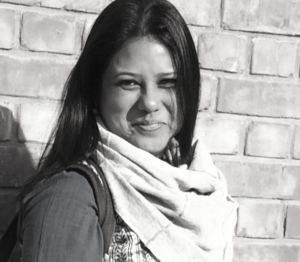
Dr. Payal Bose Biswas
Dr. Payal Bose Biswas is currently a Senior Assistant Professor at the Department of Political Science at Ramakrishna Sarada Mission Vivekananda Vidyabhavan based in Kolkata. Payal has more than 15 years of teaching at a range of academic institutions. She has won various fellowships and scholarships and has represented India in a US Government sponsored program on Foreign Policy. She has authored various textbooks, research-based books and published many other articles in renowned journals and edited volumes. Her research focuses on gender equality and gender mainstreaming. Payal holds an M.Phil from the University of Calcutta and a Ph.D from Jadavapur University.
Participant in: November/December 2020 Fellowship: Peacebuilding and Women’s Meaningful Participation in Peacebuilding Processes
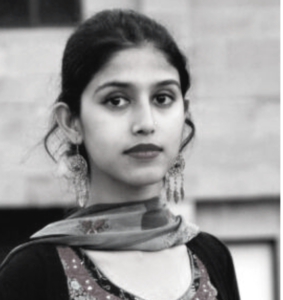
Tamana Slathia
Tamana Slathia is the founder of a youth-led peacebuilding organisation called The Daffodils Project. She has been working towards peacebuilding and conflict transformation in Jammu, Kashmir and Ladakh for over 5 years. She is recognized as a Global Peace Ambassador for mainstreaming gender in peacebuilding processes and projects. As part of her inclusive peacebuilding approach, she has trained over 500 youth from different backgrounds and organised events sensitising youth towards conflict in Jammu and Kashmir. She is a public speaker on Youth, Peace and Security and is a mentor to young women, globally, for feminist peacebuilding. Working on SDG 16 (Peace, Justice and Stronger Institutions) with a focus on localising SCR 2250 (Youth, Peace and Security) and SCR 1325 (Women, Peace and Security), through her new role at The Daffodils Project, she advocates and facilitates a larger role of youth and women in peacebuilding and conflict transformation.
Participant in: December 2019 Fellowship: Peacebuilding and Women’s Meaningful Participation in Peacebuilding Processes
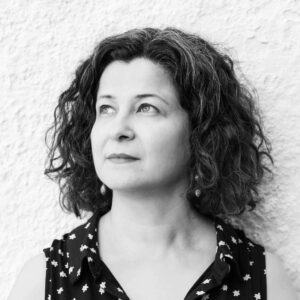
Choman Hardi
Choman Hardi is Assistant Professor and Chair of the English Department at American University of Iraq Sulaimani, where she founded the Center for Gender and Development Studies. Choman was awarded a scholarship from the Leverhulme Trust to carry out post-doctoral research about women survivors of genocide in Kurdistan-Iraq. The resulting book, Gendered Experiences of Genocide: Anfal Survivors in Kurdistan-Iraq, was chosen by the Yankee Book Peddler as a UK Core Title. Choman is a published poet and was poet in residence at Moniack Mhor Writers Centre (Scotland), Villa Hellebosch (Belgium), Hedgebrook Women Writers’ Retreat (USA) and The Booth (Shetland). She began writing poetry at the age of 20, producing, Life for Us and the moving, Considering the Women, which explores the relationship between immigrants and their homeland, and the plight of women in an aggressive, patriarchal society and as survivors of political violence. The work received a Recommendation from the Poetry Book Society and was shortlisted for the Forward Prize for Best collection. As an academic researcher she has been a visiting scholar in The Centre for Multiethnic Research (Uppsala University), Zentrum Moderner Orient and The Department of Humanities at the University of Amsterdam.
Participated in:
August 2016 Fellowship: Peacebuilding and Women’s Meaningful Participation in Peacebuilding Processes
August 2019 Fellowship: The Arts as a Tool for Peacebuilding
Beyond Borders International Festival 2019: Considering the Women: Listen as Kurdish poet and translator Choman Hardi reads from her latest poetry collection Considering the Women, a collection exploring the equivocal relationship between immigrants and their homeland. (2019)
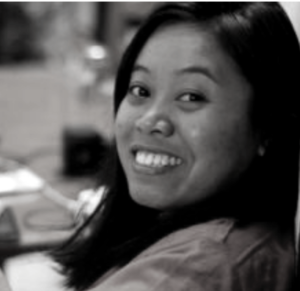
Utpala Chakma
Utpala Chakma was born in Arunachal Pradesh in a Chakma community in northeast part of India bordering Mayanmar and China. Chakma is lingual and religious minority in the country. She currently works for the DHRD Network in Pune, where she works on strengthening human rights defenders from marginalized communities in India. Prior to this, she has held roles with a focus on women’s empowerment and youth and community development with a variety of CSOs. Utpala studied social work as a specialization on Dalit and Tribal Studies at the Tata Institute of Social Sciences in Mumbai. She is looking forward to being a social activist and making a difference in the lives of people from marginalised sections of society, especially women.
Participant in: December 2019 Fellowship: Peacebuilding and Women’s Meaningful Participation in Peacebuilding Processes
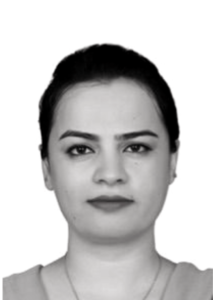
Khalida Darwish
Khalida Darwish is the focal point (Kandahar) for “Women for Peace and Participation”, which promotes the social and political inclusion of women and youth in peace building processes at the grassroots, national, and global levels. They aim to bring balance and enhance women’s participation in peacebuilding processes at all levels, and especially to raise the voices of those working at the grassroots level.
Khalida graduated from Kabul University with a BA in Russian Literature and obtained a master’s in business administration from the University of Commerce and Business Management in India. She also obtained a Certificate in Professional Development for Businesswomen from American University of Afghanistan (AUAF) and holds a diploma in Banking and Finance. During her education she was passionate about gender equality and women’s empowerment having experienced gender imbalance and gender discrimination. She is focused on women’s empowerment by providing them opportunities, education, and advocacy to explore the potential and build believes that our little efforts can provide the platform or foundation to bring that is required and rebuild our society. She works with a group of volunteers to organize workshops, trainings and other related events for women and their families at different level to bring the positive change in the attitudes.
Participant in: December 2019 Fellowship: Peacebuilding and Women’s Meaningful Participation in Peacebuilding Processes
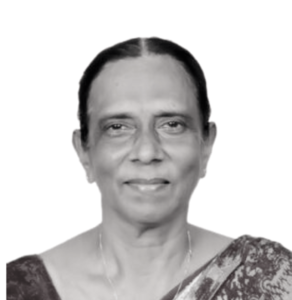
Chandra Senaratne
Chandra Senaratne is the Director of NGO Management Development Centre, based in Colombo, Sri Lanka, where she provides capacity development training facilities for the staff of private, public and non-Governmental organisations in Sri Lanka. She provides consultation services to develop training modules on entrepreneurship development, human resource management, capacity development, gender-based violence, gender and development, gender mainstreaming, women and conflict management, disaster management, Human Rights, humanitarian work, social accountability, governance and advocacy, good governance and social integration.
Prior to joining NGO Management Development Centre, she was the Deputy Director at National Youth Services Council in Sri Lanka where she contributed her professional experience to produce youth development and training policy. She worked at National Youth Services Council for nearly 26 years in a senior executive level position. She was the designated project Director of Youth Council for UNFPA in Sri Lanka. She was the first officer who led and coordinated Canada-Sri Lanka Youth Exchange programs in 1978/79 and 1980/81. She completed a Diploma Course on Youth Development and Training in India under Commonwealth Asia-Pacific youth Program, Manpower Planning training Course in Thailand and Environmental training in Pakistan. She worked for the United Nations Peacekeeping Mission in Cambodia and East-Timor in 1992 and 1996. Chandra graduated from the University of Ceylon with a special degree in Political Science.
Participant in: December 2019 Fellowship: Peacebuilding and Women’s Meaningful Participation in Peacebuilding Processes
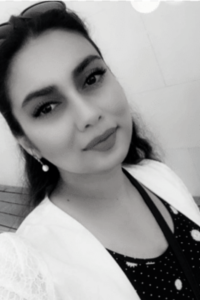
Nizhan Ramadhan
Nizhan Ramadhan has 5 years of unique expertise in the humanitarian field in Iraq, and she currently works as Gender and Protection Officer with CARE International in Middle East, a role she has held since 2016. Nizhan has a Bachelor’s degree in 2014 from the University of Duhok Humanities Faculty. She has been active in violence against women and violence prevention issues for more than 5 years and is considered a national expert on sexual, domestic violence, fighting against gender inequality and social injustice. She believes poverty cannot be overcome unless everyone has equal access and control over resources and services including equal participation of women and girls in discussions and decision makings process at both community and household levels this is why she is honored to spend her time working on an issue she cares deeply about in order to make a shift in gender norms and structures underlying inequities. She is committed to uncovering and transforming the political, social and economic relationships at the heart of poverty —to improve the health and well-being of women and girls which is critical to that fight through fighting for every individual’s right to be free from abuse or violence.
Nizhan represents CARE in relevant external fora, media and with other external stakeholders on gender issues. Moreover, she supports project research, evaluations, and baseline studies on gender/women’s empowerment with technical advice and guidance including leading inclusion, GBV and RGA and conflict assessments in the conflict sensitive and disputed areas in Iraq such as Sinjar and Zumar in Ninawa governorate. Also, she has a long experience in developing training materials, modules and material for sessions on UN Security Resolution Council 1325, oversight on whether staff and mainstreaming gender by appropriately apply the skills acquired through trainings, include planning, evaluative monitoring and reporting. Nizhan brings professional experience in the development of concept notes, proposal, budget designing, project documents and policy frameworks\ reviews and research area and gender issues for best practices. She attends conferences, workshops and seminars as directed by the supervisors in the region and represents CARE at CARE MENA and other CARE country offices. She is a staff representative of CARE international in Iraq from 2017 until to 2019 and her main role is to provide individual staff an opportunity to discuss issues in the workplace confidentially.
Participant in: December 2019 Fellowship: Peacebuilding and Women’s Meaningful Participation in Peacebuilding Processes
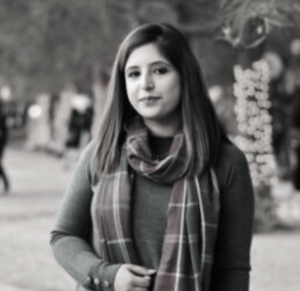
Eesha Oaj
Eesha Oaj works as a researcher, trainer and young peacebuilder with the Kashmir Institute of International Relations (KIIR), which is a civil society organisation working on peacebuilding, mediation, and reconciliation with the motto of ‘peace through dialogue’. As a researcher she has worked extensively on documenting the impact of conflict on women living along the rural Line of Control (LoC) areas in Pakistan-administered Kashmir (PAK). She has travelled widely across PAK and engaged with grassroots communities by facilitating workshops, focus group discussions and storytelling sessions with conflict-affected women and youth. Eesha has also been engaged in reconciliation initiatives in refugee camps based on peace through arts and nonviolent resistance. As a young peace builder, she has worked on community cohesion and cultural harmony by facilitating dialogues at community level.
Participant in: December 2019 Fellowship: Peacebuilding and Women’s Meaningful Participation in Peacebuilding Processes
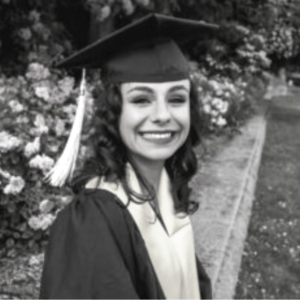
Yasmin Luqman
Yasmin Luqman is a recent graduate from the MSc International Relations of the Middle East with Arabic programme at the University of Edinburgh. She fascinated by the role of women in peacemaking and conflict resolution and especially in the role of Middle Eastern women. For example, she has been passionate about the Palestinian cause since she was young and recognises the critical role women play in preserving cultural memory and resistance movements. In completing her Master’s degree, she researched and wrote her dissertation on the role of Yemeni female activists during the Arab Spring uprising in Yemen and the challenges they have faced due to their gender, including a chapter on the role of peacemakers and the challenges they face from male delegates. She is half-Yemeni and has an aunt who is heavily involved in empowering Yemeni women and girls and in peacemaking processes to end the war in Yemen. She would eventually like to pursue a PhD programme furthering this research and is looking forward to hearing perspectives from others on this! In addition, she is a volunteer for the Scottish Green Party and also works on the social media strategy for an Edinburgh-based NGO focused on climate change called MAD Challenges.
Participant in: December 2019 Fellowship: Peacebuilding and Women’s Meaningful Participation in Peacebuilding Processes
Sanaa Khan
Sanaa Khan is a Monitoring and Evaluation Specialist at Prodigy Systems, a third-party monitoring organisation in Yemen. She leads large-scale third-party monitoring tasks for UN agencies. She has experience in conducting monitoring and assessments for UN projects that are related to health, communication for development and protection sectors. Her work includes providing real-time monitoring of outreach and vaccination campaigns, non-technical monitoring of mine action activities and tracking of behavioral change practices in cholera affected communities. Sanaa has a B.A in Gender Studies from Westminster College in the United States and is an alumna of Lester B. Pearson College, United World College.
Participant in: December 2019 Fellowship: Peacebuilding and Women’s Meaningful Participation in Peacebuilding Processes
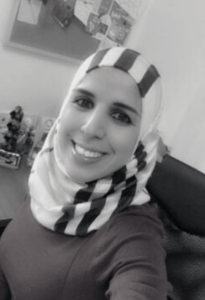
Ola Karakra
Ola Karakra is an international practitioner who currently works as a Livelihoods Specialist in UNDP Iraq. The main goal of her work is to jump start the local economy in areas recently liberated from ISIL, through provision of different schemes in livelihoods. Prior to working with UNDP Iraq, Ola worked in DAI Europe in the Arab Women’s Enterprise Fund as a Lead Market Systems Analyst in Palestine, Jordan and Egypt. Before this, she worked with UNDP Palestine on Livelihoods’ Improvement and Poverty Reduction, in order to economically empower the less privileged people, which happen to mostly be women. In addition to this, she worked for Japan International Cooperation Agency (JICA) in Palestine on local governance improvement and community empowerment.
Participant in: December 2019 Fellowship: Peacebuilding and Women’s Meaningful Participation in Peacebuilding Processes
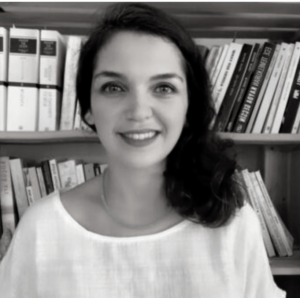
Dilara Gök
Dilara Gök is one of the founders of Conflictus Training and Consultancy. She has been working in discrimination, conflict resolution, mediation and peacebuilding fields for almost 7 years with many national and international organizations in Turkey. Currently, she has developed training programs, new modules, approaches and practical solutions in conflict resolution field by engaging with social and disadvantaged groups, as a trainer, under the roof of Conflictus. Together with this, after the Syrian crisis, she also has been working on social cohesion field by handling this issue under the roof of conflict resolution tools. In this context, she has developed and applied trainings by working with both local and international organizations in cities which have intense Syrian population. In addition to this, she had worked as a program coordinator of the Young Mediators Program which was implemented under the support of U.S. Embassy in Istanbul. Now, Dilara is one of the founding member of the Women Mediators Network of Turkey which is established under the support of Mediterranean Women Mediators Network since 2019. Also, since 2016, she has been working as victim-offender mediator in Istanbul Chief Public Prosecutors Office. Her profile can be accessed at https://tr.linkedin.com/in/dilaragok
Participant in: December 2019 Fellowship: Peacebuilding and Women’s Meaningful Participation in Peacebuilding Processes
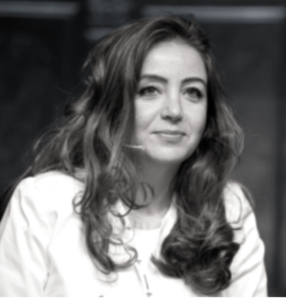
Zaina Erhaim
Zaina Erhaim is an award-winning Syrian journalist, working as Communication Manager with the Institute of War and Peace Reporting (IWPR). Zaina received the first Anita Augspurg ‘Rebels Against War’ Prize by WILPF, was named journalist of the year by Reporters Without Boarders in 2015, and named as one of the 100 Most Powerful Arab Women according to Arabian Business and the Unsung Heroes of 2016 by Reuters Thomson.
She has been working with the IWPR for the last 7 years, trained over 100 media activists on journalism basics in Syria and made a series of short films entitled Syria Rebellious Women (2016) and Syria diaries (2017) narrated by Syrian women. Zaina has contributed to three books: Our Women on the Ground (2019), Journalism in Times of War (2018) and Arab Women Voice New Realities (2017), and taught Conflict Sensitive Mobile Journalism at Bremen Art University in Germany. For the last 3 years she has been running a social media campaign to break the stereotyping of the Syrian women, highlight their role(s) and the gender-based discriminations they face. Before IWPR, Zaina worked for the BBC. She writes for a variety of outlets including; The Guardian, The Economist, Middle East Eye, and Alhayat, Al Quds Al Arabi.
Participant in: December 2019 Fellowship: Peacebuilding and Women’s Meaningful Participation in Peacebuilding Processes
Alisar Elias
Alisar Elias has been working with UNHCR for over 12 years; she started her journey as a field assistant conducting needs assessments and delivering humanitarian assistance to refugees in Syria. She then became involved in providing case management to SGBV survivors. In 2015, as the Senior Protection Associate (SGBV), she was leading the SGBV unit at the country office level, designing and planning SGBV prevention and response programmes nationwide focusing on internally displaced persons and returnees. Alisar has worked on developing community-based structures to empower the role of women in the community and enhance their involvement in the decision-making process.
Participant in: December 2019 Fellowship: Peacebuilding and Women’s Meaningful Participation in Peacebuilding Processes
Samira Bouhia
Samira Bouhia is an activist who advocates for women’s rights in Morocco and more widely in the MENA region. She is an active member of a number of advocacy groups and networks and holds senior positions in many. She is a member of the Central Bureau of the Moroccan Association for Human Rights and leads on activities relating to women’s rights; coordinator of the Association’s Central Committee for Women’s Rights; coordinator of the National Coordinating Committee for the Commemoration of International Women’s Days (including human rights, women’s, youth, trade union and political bodies); a member of a committee of the Spring of Dignity Alliance (an alliance of 25 women’s and human rights organizations advocating women’s rights); coordinator of the World March in Morocco, a member of EuroMed Rights in the Working Group on Gender Equality and Women’s Rights; and a member of the Regional Coalition for Women Human Rights Defenders in the Middle East and North Africa. Samira has coordinated a number of projects and training programmes relating to women’s political participation, women’s participation in senior decision-making positions as well as programmes that support female victims of gender-based violence. From 2007 to 2010, Samira was the Project Coordinator for the women’s anti-illiteracy programmes run by the Ministry of National Education.
Participant in: December 2019 Fellowship: Peacebuilding and Women’s Meaningful Participation in Peacebuilding Processes
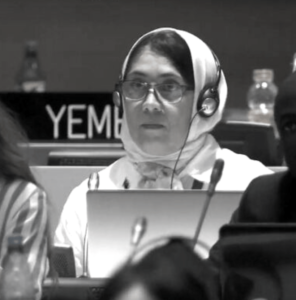
Lamees BenSaad
Dr. Lamees A. BenSaad is one of the founders of Tripolitanian Society, a civil society organisation working on national reconciliation, peacebuilding and gender-based violence. Lamees is also a member of Women Federation for World Peace International and World Heritage Watch and is a lecturer at the Faculty of Medicine at the University of Tripoli. She has been active in a number of charity organisations and educational programs in the International Women’s Group in Tripoli. She was a member of the Family Care Association from 1998-2002. In 1999, she represented Libya at the Women’s Federation for World Peace Congress entitled: ‘True Family and Love Congress’, held in Kuala Lumpur, Malaysia. Additionally, she joined the International Women’s Association of Kuala Lumpur from 2009-2015.
At Tripolitanian Society she is the head of Women Committee, where her responsibilities are to open doors and work with others on a national and international scale. She has been involved in many projects such as national dialogue, and empowerment of women. She influenced many women from her region to believe in themselves and actively take up roles in the society. She has participated in many workshops and conferences that promote peace, security and women’s well-being.
Participant in: December 2019 Fellowship: Peacebuilding and Women’s Meaningful Participation in Peacebuilding Processes
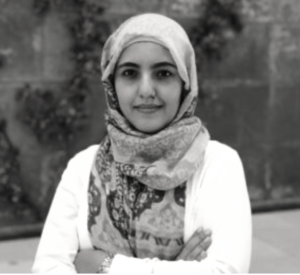
Manal Bawazir
Manal Bawazir is from Aden, Yemen and has been active in women’s and children’s rights since her childhood. Manal has been working in various fields in child protection and has carried out a lot of voluntary work that serviced society and contributed to raising awareness about the early marriage of girls, female genital mutilation (FGM) in rural areas, campaigns to prevent diseases and epidemics such as cholera and typhoid, and hygiene awareness. Manal currently works for the United Nations Children’s Fund (UNICEF) in Aden as a Programme Associate, a position she has held since 2015.
During the crises of the internal wars of Yemen in 2011 as well as 2015 she contributed to volunteer work in the internally displaced persons (IDP) camps where she supervised the Abyan IDP camp in 2011. She coordinated the team of volunteers to organize food and clothing distribution campaigns as well as for the camp building supplies. Manal’s future goal is to study a master’s degree in women’s and children’s rights, and to then establish a humanitarian foundation, which will focus on women’s and children’s empowerment to become active partners in society. Manal hopes that one day she will make a substantial change in Yemen, especially regarding the unfair laws towards women’s rights that put severe penalties on anyone who violates them. This often manifests as either or both physical or psychological violence.
Participant in: December 2019 Fellowship: Peacebuilding and Women’s Meaningful Participation in Peacebuilding Processes
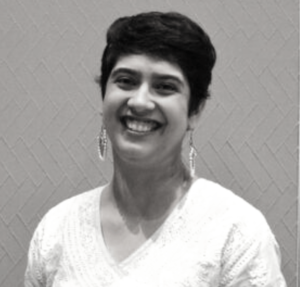
Mansi Panjwani
Mansi Arun Panjwani (Ms) is a peace educator and serves as an international consultant on peacebuilding. She has a Masters in Peace Education from the UN mandated University for Peace in Costa Rica and a Masters in Conflict Analysis and Peacebuilding from Jamia Millia Islamia in India.
She is passionate about using education to create a culture of peace in society. Towards this goal, she works with children, youth and adults both, within the formal system of education and within non-formal systems. With over a decade of experience, Mansi is actively engaged in designing and facilitating programmes that empower people to be change-agents within their communities. Using activity-based learning and by embedding values and skills of 21stcentury such as empathy, critical thinking and collaboration, she engages her participants in a joyful, yet reflective process.
She is a senior trainer with the Commonwealth Secretariat and is involved with ongoing regional and international projects by engaging with themes such as peace education, human rights education, youth empowerment, non-violent communication, social development and inclusion, safe and caring schools, empathetic leadership, organisational culture, conflict transformation, peacebuilding and violence prevention among others.
Mansi has worked with inter-governmental organisations, international and national organisations and institutions, civil society organisations and educators. She has been actively engaged in designing and delivering international trainings for 250+ peacebuilders from over 50 countries. Some of the trainings she has conducted are with the Asia Europe Foundation on Human Rights and Prevention of Violent Extremism (Sept 2019), the Commonwealth Secretariat and The Royal Commonwealth Society: Kuala Lumpur (April 2019), the Commonwealth Secretariat and Council of Europe: London, (Dec 2017), United Network of Young Peacebuilders (UNOY) and Ministry of Youth Affairs and Sports, Government of India (Oct 2017) on the topics such as Human Rights and the Prevention of Violent Extremism, International Peace and Security & Building Community Resilience, Addressing Hate Speech and Creating Counter Narratives to Peace, and Youth and Peacebuilding.
She has three years of experience at Teach for India, where she worked with the on-ground challenges of a public-school system in India. Using Human Rights Education and Non-Formal Education methodologies, she works with young leaders and social entrepreneurs to create change at the individual and community levels. She has also taken on various projects on designing curricula including a values-based school curriculum spanning 240 hours as well as a child rights school curriculum with Nobel Peace Prize winner, Mr. Kailash Satyarthi’s organisation. She has also designed and written teachers’ manuals and facilitation guides that are being implemented at a national level.
She believes that when people themselves lead empowered, joyful and sustainable lives, together, they can create a better world for each other and for future generations.
Participant in: December 2019 Fellowship: Peacebuilding and Women’s Meaningful Participation in Peacebuilding Processes
Sama’a Al-Hamdani
Sama’a Al-Hamdani is a non-resident fellow at the Middle East Institute (MEI) focusing on political dynamics in Yemen. She has been published both in Arab and Western media and think tanks, including Al-Monitor, the LawFare blog, Brookings, The National (UAE), MENAsource (Atlantic Council Blog), Al-Araby Al-Jadeed, Fikra Forum, The Middle East Institute Journal, Yemen Observer, and Yemen Times, among others. Al-Hamdani has spoken at many events and forums, including at Brown University, the Carnegie Middle East Center, the World Bank, the United Nations, and Chatham House. She has also made appearances on France24, BBC World Service, CNN, Aljazeera, Al-Araby Television, and C-SPAN, among other outlets.
Before joining MEI, she was a visiting fellow at the Center for Contemporary Arab Studies (CCAS) at Georgetown University and a fellow at the Sana’a Center for Strategic Studies (SCSS). She is also the director of the Yemen Cultural Institute for Heritage and the Arts (YCIHA), a non-profit based in Washington, DC dedicated to Yemeni arts and heritage. Also, from 2011 to 2015 she wrote the blog Yemeniaty.com, with the slogan of “Yemen Simplified,” which helped explain political developments in Yemen during the Arab Spring and leading up to the civil war.
Participant in: August 2019 Fellowship: The Arts as a Tool for Peacebuilding
Tairah Firdous
Tairah Firdous is a communication expert, film maker and humanitarian worker. She is currently working as a media and gender advisor for Internews Network in Afghanistan for a media project called Rasana. Rasana trains female journalists in Afghanistan and supports women led media outlets in order to produce media content on women’s issues. The project also works on journalist safety issues and supports investigative journalism initiatives in Afghanistan.
Tairah has worked with Oxfam and Mercy Corps in emergencies and conflicts. She has reported extensively from conflicts in India and worked closely with IDPs. She has also covered humanitarian emergencies and the aftermath, especially in the devastating Kashmir Floods of 2014 , as well as 2015 Nepal Earth Quake.
In 2016, she moved to Kabul to take a Research Manager position at the Afghanistan Public Policy Research Organization. Tairah has an undergraduate degree in journalism from the University of Kashmir. In 2006, She received a Ford Foundation Fellowship to pursue higher studies in the United States and completed her Master’s in Journalism at Hawaii Pacific University, with a specialization in documentary filmmaking.
Tairah is working on her first novel, mostly influenced by her own experiences of growing up in a conflict and working in other war zones.
Participant in: August 2019 Fellowship: The Arts as a Tool for Peacebuilding
Ameenah Sawwan
Ameenah A. Sawwan is a human rights activist/advocate from Syria, based in Berlin since 2016. Currently, she works as a campaigner at The Syria Campaign, a human rights and advocacy group. Ameenah works in particular on the campaign of the detention supporting detainees families and survivors to have the detainees cause as a priority in the peace talks of Syria. Back in Syria, she was part of the anti-regime movement in Western Damascus and worked along with other activists to highlight the violations committed in that area. At the end of 2012, she started ‘Vision’ which was a local civil society organization dedicated to the welfare of women empowerment and traumatized children. Activities included relief assistance, population census for relief work coordination, and coming up with creative approaches/activities to support children. Vision worked strongly on holding events and also produce multimedia reports to advocate for the situation under the strict siege in Western Damascus. Ameenah kept working on that until she left Syria at the end of 2013. Ameenah has experience in advocacy and campaigning, communication and media as she has spent the last eight years working on Syria for several NGOs and media outlets. In Berlin, she is now studying Ethics and Politics at Bard College Berlin.
Participant in: August 2019 Fellowship: The Arts as a Tool for Peacebuilding
Rania Al-Hayyouk
Rania Al-Hayyouk is the Executive Director at National Association for Family Empowerment (NAFE) based in Jordan. Her work focuses on social, political and economic empowerment of women. Throughout her career over the last 15 years with NAFE and other civil society organizations, she has built strong theoretical and practical experience and knowledge in women empowerment programmes in urban and rural areas focusing on promoting women (refugee and Jordanian) participation and engagement in political, social and economic arenas to improve their decision making abilities, living standards and well-being with focus on capacity building and skills development for participants and civil society organizations on gender, gender equality, responding to gender based violence, women rights and participation in public life, peacebuilding, women political participation, women economic development, conflict resolution, and Advocacy.
Participant in: August 2019 Fellowship: The Arts as a Tool for Peacebuilding
Sumona DasGupta
Sumona DasGupta, a political scientist by training, is a scholar-practitioner, writer, trainer and consultant based in New Delhi working primarily in the area of gender and peacebuilding. A former chair of the international Advisory Group of International Conflict Research Institute (INCORE), University of Ulster, she is currently research adviser with Women in Security, Conflict Management and Peace (WISCOMP) and Senior Visiting Fellow with Participatory Research in Asia, New Delhi. Sumona has in the past co led a nine year action research project in Kashmir on Women building constituencies of peace. This dialogue project also involved working with a story teller to use storytelling to open difficult conversations across faultlines and among women and children in the camps for those displaced by the conflict. She was the closing speaker at the international conference on Accounts of the Conflict in Belfast in 2014 that looked at the linkages between storytelling, archiving and peace building across the world and particularly focused on the power of storytelling for healing and reconciliation work. A published author she has written extensively about and participated in several national and international conferences on gender and peacebuilding.
Participant in: August 2019 Fellowship: The Arts as a Tool for Peacebuilding
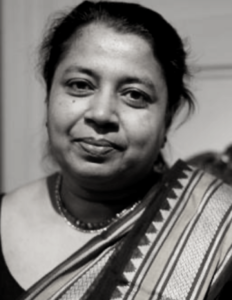
Visaka Dharmadasa
Visaka Dharmadasa is the founder and Chair of Association of War Affected Women and Parents of Servicemen Missing in Action, Struggling to end the civil war, she was able to bring women together across the conflict lines to work for peace, Ms Dharmadasa educates soldiers and community leaders about international standards of conduct of war specifically to raise awareness about the importance of soldier’s identification tags and treatment to prisoners of war. She also works on disseminating the content of UN resolution 1325 on women peace and security, calling for the inclusion of women at all levels of peace building and decision making., She trains women to run to political office and also on power sharing. She was awarded the prestigious Humanitarian award for 2006 by the Inter Action of Washington DC an NGO consortium comprises of 160 non-governmental organizations. In coordination with the “1000 Peace women across the globe” movement, she was nominated for a collective Nobel Peace Prize in 2005. She was a team member of special rappotour to look in to the violence in north and east of Sri Lanka and the ceasefire violations by the Human Rights commission, and Consultation Taskforce on Reconciliation Mechanisms appointed by Government of Sri Lanka. She is a network member of Women Waging Peace, a founding member of Women’s Alliance for Security Leadership (WASL), a member of Women Mediators across Commonwealth, a member of the expert pool of Resolution to Act, as well a member of Global Network of Women Peace builders. She is the gender focal point for GPPAC in Sri Lanka, a Director of the board of of National Peace Council and PAFFREL of Sri Lanka. She is currently a member of the Civil Society Advisory Group of UN Women for the region. Visaka Dharmadasa holds a degree in negotiations and mediation skills from the United States Institute for Peace, Washington, and in women and security from Harvard University, Cambridge, USA.
Participant in: August 2017 Fellowship: Peacebuilding and Women’s Meaningful Participation in Peacebuilding Processes
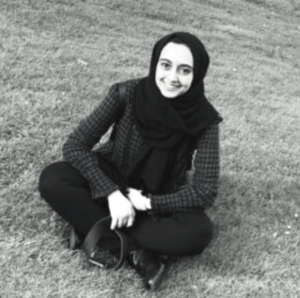
Sala Khaled
Sala Khaled is a Programmes Officer at the Sana’a Center for Strategic Studies. She leads the programme ‘Strategic Local Peace Building in Yemen: Building Peace From the Ground Up’, which explores creative, inclusive new models to achieve lasting peace in Marib and Hadramawt. In addition to this, she is responsible for the human rights section of the monthly publication, The Yemen Review. This involves monitoring, researching and writing about human rights violations from airstrikes to abuses of prisoners.
She is also a co-founder of ‘Innovative Yemen’, an initiative that seeks to foster entrepreneurship and innovative development in assessing and addressing local challenges in Yemen. She holds a BA in International Business Management from the Lebanese International University in Yemen, and a diploma in project management from Talal Abu Ghazaleh University in Amman, Jordan.
Participant in: August 2019 Fellowship: The Arts as a Tool for Peacebuilding
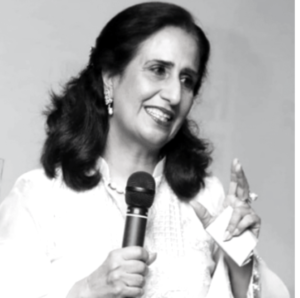
Naela Chohan
Naela Chohan is a career diplomat and an artist. As a seasoned and veteran diplomat, ambassador Chohan has assumed a leadership position in eight different Pakistani diplomatic missions on five different continents. Along with only a handful of other diplomats, Naela Chohan represents the first and senior-most cohort of women to rise to the highest echelon of Pakistan’s Ministry of Foreign Affairs. Canada’s weekly foreign policy Embassy Magazine in January, 2008 described her by saying that “though slight in stature and soft in speech, Naela Chohan accounts for 50 per cent of the Pakistani foreign service’s most potent power couple.”
Having started her diplomatic career on the China Desk at Pakistan’s Ministry of Foreign Affairs, she has been a proponent of a strong Pakistan-China Alliance premised on multifaceted cooperation. Naela Chohan is also committed to the prohibition of global Chemical Weapons, being the first civilian and woman to head the National Authority on the Implementation of the Convention on the Prohibition of Chemical weapons in Pakistan. She is responsible for having conceived or restored several Pakistani landmarks including the Plaza de Pakistan in Buenos Aires, Argentina. She was the first female foreign diplomat to be formally received by the Iranian Government after the 1979 Revolution. Naela Chohan was unanimously elected Chairperson for three consecutive years of Asia Pacific Centre (APDC), Kuala Lumpur.
Naela Chohan has served as High Commissioner of Pakistan to Australia, where she laid emphasis on bolstering bilateral ties, therein prioritizing the enhancement of security, agricultural, educational and economic relations. She has previously served as Pakistan’s Additional Foreign Secretary for the Middle East and Africa, prior to which she was the Ambassador of Pakistan to Argentina, Uruguay, Peru and Ecuador, where she has been a vocal proponent of stronger ties between Pakistan and Latin America. She is an alumnus of Quaid-e-Azam University and the Kennedy School of Government at Harvard University.
Beyond her diplomatic career, Ambassador Naela Chohan is a strong advocate of Women’s Rights through the medium of visual arts, and exhibitions of her art have taken place on five Continents. She has continued to create awareness about various social and humanitarian issues internationally including at the UN. Her most notable work is “Encaged” at her solo painting exhibition entitled Souffrance, which is kept on permanent display at the UNESCO headquarters in Paris since 2002. According to UNESCO, “Cest une voix visuelle. Forte par la coluer et la compositition des image” (She is a visual voice. Strong in colours and in composition of images). Ambassador Chohan received her formal training in visual arts from Malaysian Institute of Arts (MIA), l’ecole Nationale Superior des Beaux Arts, l’ecole de Louvre. She has a Diploma in Trompe l’oiel from Ateliers du Carrousel, Palais de Louvre.
She retired from her Diplomatic Service in Pakistan’s Foreign Affairs on 5th May 2018, and is since is pursuing her “Give Back” to the youth of Pakistan by opting teaching at her alma mater and other strategic organisations and institutions, in addition to actively taking up her artistic talent.
Participant in: August 2019 Fellowship: The Arts as a Tool for Peacebuilding
Thouiba Galad
Thouiba Galad is a Programme Assistant for Human Rights and Governance at the European Union Delegation in Sudan. Prior to this, she worked at the United Nations High Commission for Refugees, and at AECOM International (USAID). She has a diploma in Peace and Development from Bahri University and a masters in Gender and Migration, and has carried out research on human trafficking in Eastern Sudan since 2013.
Participant in: April/May 2019 Fellowship: Peacebuilding and Women’s Meaningful Participation in Peacebuilding Processes; MENA Focus
Marwa Khaled
Marwa Khaled is a humanitarian worker and gender equality activist. She is currently a WASH Officer at UNICEF in Aden, a role that includes programme management and implementation, alongside communication and networking. She is also involved in data collection and analysis, and collaborates with local stakeholders and other members of the development community, including NGOS, the UN, and bilateral agencies, in the WASH sector in particular. She has several years of experience of working on gender equality, conflict resolution, and women’s empowerment.
Participant in: April/May 2019 Fellowship: Peacebuilding and Women’s Meaningful Participation in Peacebuilding Processes; MENA Focus
Pinar Akpinar
Pinar Akpinar is a scholar at the Conflict Resolution and Mediation Stream of Istanbul Policy Center. She is currently Project Manager of Dialogue and Sustainable Conflict Resolution in the Kurdish Question and Polarization in Turkey Project. Pinar received her PhD from the School of Politics, International Relations and Philosophy (SPIRE), Keele University with her dissertation entitled ‘An emerging mediator on the periphery: Turkey’s mediations in the Syrian-Israeli talks and in Somalia’. Her research interests lie in the intersection of conflict resolution and foreign policy with a focus on mediation, peacebuilding, Turkish foreign policy and the Middle East. Pinar taught at various universities including Sabancı University and Keele University. Between 2014-2014, she was lecturer at the Department of International Relations and Vice Director at Center for International Conflict Resolution, Yalova University. She was a visiting scholar at the School for Conflict Analysis and Resolution at George Mason University in 2013.
Participant in: April/May 2019 Fellowship: Peacebuilding and Women’s Meaningful Participation in Peacebuilding Processes; MENA Focus
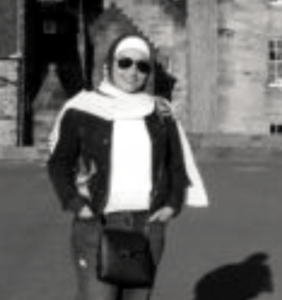
Mais Al-Lobaidy
Mais Al-Lobaidy is an experienced Public Health and Social development specialist with a demonstrated history of working in Non-profit Organizations. She currently works as a Communication for Development Officer at the United Nations Children’s Fund in Damascus, where she has been engaged in emergency humanitarian assistance response. She is also acting Director of educational programmes on a voluntary basis with a non-profit organisation called the Syrian Youth Assembly. She is skilled in training, community mobilization, social marketing, behavioural change, and health promotion. She is also a dedicated professional with a Public Health Master’s degree concentrating in Community Health from the American University of Beirut.
Participant in: April/May 2019 Fellowship: Peacebuilding and Women’s Meaningful Participation in Peacebuilding Processes; MENA Focus
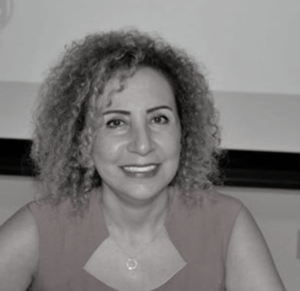
Lama Kannout
Lama Kannout is a Syrian feminist, political activist, and researcher, and is currently the executive director of the Syrian Feminist Lobby in Beirut. She earned a BA in Interior Design, and owned and directed Lama Advertising Agency between 1992 and 2014. She was a member of the political office of the Arab Socialists Movement from 2000 to 2008, and has co-founded several civil society organisations. She is also an executive office member of the Musawa organisation, chairperson of the board of directors of the Syrian Centre for Citizenship, and coordinator of the studies committee in the Syrian Feminist Lobby. Ms Kannout participated in the indirect talks of Gevena II in 2014 as a member of the follow-up committee of the Syrian Women Initiative for Peace and Democracy.
Participant in: April/May 2019 Fellowship: Peacebuilding and Women’s Meaningful Participation in Peacebuilding Processes; MENA Focus
Khouloud Mansour
Khouloud Mansour is one of the founding members of the Syrian Women Initiative for Peace and Democracy, supported by UN Women. She is also a founding member of the Syrian’s Women Political Movement. Khouloud has extensive experience in humanitarian and development response, UN functions, refugees and migration, civil society, transitional justice, and conflict mitigation. Alongside her practitioner experience, she has extensive academic background in Conflict Prevention, and International Peacebuilding with an MA in Middle Easter Studies from Lund University, Sweden and Postgraduate Diplomas in Conflict Prevention, Resolution, and Reconciliation from John Hopkins University.
Participant in: April/May 2019 Fellowship: Peacebuilding and Women’s Meaningful Participation in Peacebuilding Processes; MENA Focus
Rida Al Tubuly
Rida Al Tubuly is a Co-Founder and Director of the organisation Together We Build It, an NGO that works towards the promotion of human rights and women’s political & economic empowerment. Dr. Rida Al-Tubuly fights for women’s rights and is interested in issues such as gender equality and political empowerment of women. Ms. Al-Tubuly is the executive manager of the 1325 Network in Libya, a network which advocates on UNSCR1325 (2000) in Libya, and a co-author of the first Libyan Civil Society Monitoring Report on UNSCR1325 (2000). She is a Professor of Pharmacology at the University of Tripoli. She holds an MSc from the University of Poland and was awarded her PhD from the University of London in 1997.
Participant in: April/May 2019 Fellowship: Peacebuilding and Women’s Meaningful Participation in Peacebuilding Processes; MENA Focus
Mona Zeineddine
Mona Zeineddine is a member of the litigation team at the Syrian Centre for Media and Freedom of Expression, a grassroots human rights organisation. Her work largely focuses on civil society and women’s participation and developing and implementing comprehensive litigation, communications and advocacy strategies. She holds an MSc In Global Governance and Diplomacy from the University of Oxford and a BA in Political Studies from the American University of Beirut.
Participant in: April/May 2019 Fellowship: Peacebuilding and Women’s Meaningful Participation in Peacebuilding Processes; MENA Focus
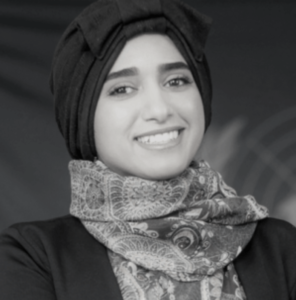
Zuha Al-Hammadi
Zuha Al-Hammadi is a communication specialist in United Nations Volunteer Programme (UNV), with several years of experience in humanitarian work, communications, and advocacy. Prior to this, she was a Humanitarian Affairs Officer at Médecins Sans Frontiéres (MSF) and a Communication Officer at the Sana’a Centre for Strategic Studies in Beirut.
Participant in: April/May 2019 Fellowship: Peacebuilding and Women’s Meaningful Participation in Peacebuilding Processes; MENA Focus
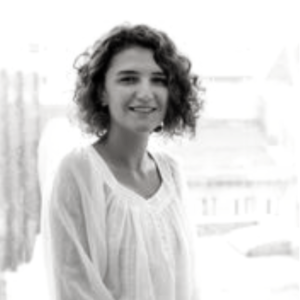
Elif Kalan
Eilf Kalan is a co-founder of, and trainer at Conflictus Consultancy on Conflict Resolution and Co-founder of İhtiyaç Haritası project based in Turkey. Currently, she has been a consultant to GIZ Youth Leaders for Social Cohesion (between refugee and host communities) program, to UNWOMEN Turkey in Gender Sensitive Refugee Response Programs and to other UN agencies and international organizations. Moreover, she has been a consultant to various peacebuilding and conflict resolution related, and social development focusing projects. Since 2005, she has been working within civil society sector at the local, national and international levels for developing conflict resolution and peacebuilding, local development, public and civil engagement contents and programs for various organizations such as Youth Association for Habitat, UNDP, UNICEF, UNWOMEN, and universities such as Sabancı University, Kadir Has Universityy, Bilgi University, Muğla Sıtkı Koçman University and Coventry University.
Participant in: April/May 2019 Fellowship: Peacebuilding and Women’s Meaningful Participation in Peacebuilding Processes; MENA Focus
Ghaida Rishmawi
Ghaida Rishmawi is a Gender & NGO Management expert with demonstrated experience in Project Management, civil society and social work, emergency & relief Programs, Capacity Building and Community Development. Her 16 years work experience in Middle East includes 14 years working in International NGO & Emergency Relief Programs in different countries; Palestine, South Sudan, Turkey, Jordan, Iraq, and Italy at senior management positions where she has been worked with some of the International and local donors as; USAID, EU, JICA, UNTF,CIDA, UN/HPF, DFID, OFDA, UKAID, German-MOFA, German-BMZ, and Various UN agencies.
Participant in: April/May 2019 Fellowship: Peacebuilding and Women’s Meaningful Participation in Peacebuilding Processes; MENA Focus
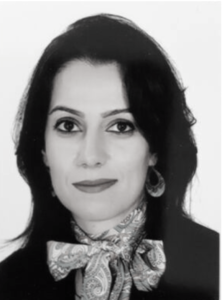
Rezan Ali
Rezan Ali is a gender equality specialist and trainer. She currently leads monthly gender equality workshops for public servants facilitated by the Kurdistan Institute for Public Administration, Ministry of Planning. She also provides specialist training for humanitarian NGO staff and social workers who work at the camps of refugees and IDPs in Kurdistan Region-Iraq, and field aid providers to raise their awareness on Protection of Sexual Exploitation and Abuse (PSEA) and their corresponding policies. She also currently works as a Monitoring and Evaluation consultant for Internews, Erbil. She has previous experience at agencies including UN Women, UN OPS and originations including Rwanga, Peace Winds, Al Massalla. Social worker by training, she received an MA in Sociology and Social Policy from the University of Kurdistan-Hawler.
Participant in: April/May 2019 Fellowship: Peacebuilding and Women’s Meaningful Participation in Peacebuilding Processes; MENA Focus
Arththi Sathananthar
Arththi Sathananthar is a PhD candidate at the School of English, University of Leeds. Her thesis explores the representation of ancestral houses in diasporic Arab Anglophone memoirs. Her broader research interests include and are not limited to: diaspora, exile, postcolonial studies, Middle East studies, cultural theory, home studies, space and place, life writing, memory studies, feminism. She is Co-Director of the Women’s Paths Research Project which aims to bridge the gap between academia and local grassroots intersectional feminist organizations. She is also the administrative assistant for the Institute of Colonial and Postcolonial Studies (ICPS) which is an interdisciplinary research network that studies the comparative treatment of colonial legacies in shaping cultures of the postcolonial contemporary world. At the School of English, University of Leeds, she is a teaching assistant, writing mentor and LEAP (Leeds Excellence in the Arts Programme) mentor.
Participant in: August 2019 Fellowship: The Arts as a Tool for Peacebuilding
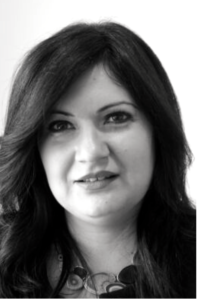
Sawssan Abou Zahr
Sawssan Abou Zahr is an independent Lebanese journalist who perceives her profession as a medium to promote democracy, peace and human rights and exert social activism. She worked for 16 years with Annahar, the leading newspaper in Lebanon. Her writings in Arabic focused on Arab Spring issues and emerging democracies, women causes and human rights, Syrian and Palestinians refugees and Islamic radical movements. Through her work, she covered political events and human rights issues from several countries around the world and notably Afghanistan and Libya, where she focused on new political systems, women rights and peace building efforts after the wounds of war.
Sawssan works on mapping local peace building actors as a partner in Lebanon for Peace Direct, whose website Peace Insight is a leading source on peace building efforts throughout conflict zones in the world. She contributes to comprehensive reports, case studies and research projects with other correspondents in the network. On her blog, she writes articles in English on internal reconciliation, human security and refugee issues, especially women.
She works with Women Human Rights Defenders in the MENA and the regional coalition supporting them. Her role is consultancy, proof reading and editing the web material and producing manuals and reports in Arabic.
Sawssan served in 2016 and 2018 as a jury member for Tomorrow’s Peacebuilders Award. She was a speaker at World Press Freedom Day in Jakarta in 2017 on portrayal of Syrian refugees in Lebanese media media, took part in several international forums on journalism and women empowerment, as well as panels at International Peace Institute in New York on countering violent extremism and peace building.
Participant in: December 2018 Fellowship: Peacebuilding and Women’s Meaningful Participation in Peacebuilding Processes
Khin Lay
Khin Lay is the founder and director of Triangle Women’s Support Group, an organisation that works to empower women across Myanmar to be decision makers and active members of society. Programmes have included activities on reproductive health, parenting and child psychology, human trafficking, human rights and sexual and gender-based violence, including awareness-raising on international and existing laws. Previously, Lay was the leader of Kamaryut Women’s Wing of the National League for Democracy where she advocated for the rights of women and was a victim of political persecutions. Lay’s long-term goal is to create a national- level Women’s Ministry to work with public and private entities to ensure parity for women in all spheres.
Participant in: August 2018 Fellowship: Peacebuilding and Women’s Meaningful Participation in Peacebuilding Processes
Pranjali Singh
Pranjali Singh is the Programme Coordinator of the Children’s Art Museum of Nepal. Her projects are mainly art-based workshops that address social issues and allow participants to express their emotions. Her recent projects include: Paint for Peace project with Youth victims of war in Sri Lanka, Safe Spaces for Conflict Victim Women and Girls in Nepal, Establishment and mobilization of Peace Scholarship Fund for Children of Armed Conflict Victim of Nepal, Temporary Learning Centres (TLCs) for Earth Quake victim children and girls of Nepal. Her recent projects include: Safe Spaces for Conflict Victim Women and Girls in Nepal, Establishment and mobilization of Peace Scholarship Fund for Children of Armed Conflict Victim of Nepal, Mental health awareness through art based workshops conducted in Temporary Learning Centers (TLCs) for Earth Quake victim children and girls of Nepal, Paint for Peace project with Youth victims of war in Sri Lanka.
Participant in: August 2018 Fellowship: Peacebuilding and Women’s Meaningful Participation in Peacebuilding Processes
Saloni Singh
Saloni Singh is founder chair of DidiBahini, a NGO working on gender equality and social equity issues in Nepal. She is also one of the founding members of Shantimalika (a national network of women peace builders) and Nepal\’s national network to work on UN SCR # 1325 called 1325 action Group . She was also one of the EC Members of ASPBAE (Asian South Pacific Association of Basic and Adult education, she represents South Asia in the global executive committee. She also holds the position of Gender Focal Point for South Asia and Steering Committee member of GPPAC (Global Partnership on Prevention of Armed Conflict) and Regional Steering Group member of South Asia Regional Center for Strategic Studies. Ms. Singh is also one of the founder executive members of Asia Pacific Women in Politics (APWIP) network as well as founder co-chair of Nepal Participatory Action Network (NEPAN). Saloni Singh has Masters Degree in Economics from Tribhuban University of Nepal , a degree in Social Development from at St. Francis Xavier University of Canada. At present she is visiting scholar in Coady International Institute, St. FX. University, Canada and also pursuing her PHD in Economics. Ms Singh is founder chair of Coady Alumni Association of Nepal (CAAN).
She has been extensively involved in development programmes for more than two decades in Nepal and almost all the countries of South Asia like Pakistan, Afghanistan, Sri Lanka and Bangladesh.
Participant in: August 2018 Fellowship: Peacebuilding and Women’s Meaningful Participation in Peacebuilding Processes
Bushra Hyder
Bushra Hyder is the Director and owner of Qadims Lumiere School and College in Peshawar, Pakistan. She is a pioneer in education as she was the first person to introduce Peace Education into any school curriculum in Pakistan. Peace Education has been critical in intervening in the radicalisation of your boys who are determined to fight for Jihad. She is also a founding member of Women’s Alliance for Security Leadership Conflict Transformation. Alongside advocating for peace education she has extensive experience in post-conflict community development and women’s participation in public policy for enduring peace and community development.
Participant in: August 2018 Fellowship: Peacebuilding and Women’s Meaningful Participation in Peacebuilding Processes
Sarah Arumagam
Sarah Arumagam is an Attorney-at-Law, who also works as a consultant in the areas of Violence Against Women (VAW), women, peace & security. Previously she was Programme Director at Young Womens Christian Association, Sri Lanka spearheading programmes on VAW, Peace with Justice and Democratic Citizenship. She is a former National Vice President of Young Women’s Christian Association of Sri Lanka which is affiliated to the World YWCA. Her overall work involved promoting women’s rights and peace with justice.
Participant in:
August 2018 Fellowship: Peacebuilding and Women’s Meaningful Participation in Peacebuilding Processes
August 2019 Fellowship: The Arts as a Tool for Peacebuilding
Ianthi Gunawardana
Ianthi Gunawardana, Vice Chairperson of the Kandurata Community Development Foundation (KCDF) Sri Lanka, has provided leadership to the Team at the KCDF in mobilizing the community to be vigilant with regards to issues involving violence against women and children. This work was implemented in close collaboration with the Community Policing Network in the respective project locations. The work carried out by KCDF has also been successful in improving the livelihoods of low-income groups in the project locations. Ianthi Gunawardena is also a member of the Association for Development and Peace through Community Action (ADAPCA) which has worked with different ethnic communities to work towards achieving sustainable peace. Ms. Gunawardena has a professional Diploma from the Institute of Personnel Management and from the London Chamber of Commerce. She has a total of 40 years’ work experience in the private and public sectors in Sri Lanka.
Participant in: August 2018 Fellowship: Peacebuilding and Women’s Meaningful Participation in Peacebuilding Processes
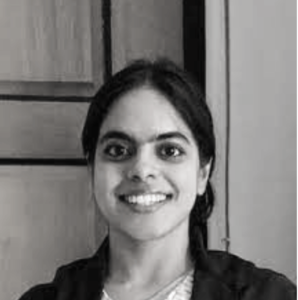
Salma Yusuf
Salma Yusuf is a peace practitioner and mediator from Sri Lanka. She specialises in policy and process development, strategic advocacy, and thought-leadership. She has previously worked as a public official in Government, a university lecturer and researcher, a journalist, and a civil society activist nationally and internationally. In recognition of her professional contributions, she has received leadership awards from the U.S. Department of State, the Foreign Ministry of France, and the European Union. She has a Master of Laws in Public International Law from Queen Mary University of London and a Bachelor of Laws (Honours) from the University of London. She has completed specialised fellowships at the University of Toronto, the University of Canberra and the American University of Washington.
Participant in:
August 2018 Fellowship: Peacebuilding and Women’s Meaningful Participation in Peacebuilding Processes
August 2022 Fellowship: The Arts as a Tool for Peacebuilding
Zozan Alosh
Zozan Alosh is a founding member of the Syrian Women Initiative for Peace and Democracy, and has dedicated her recent work to raising awareness of women’s voices in the Middle East. She is a founding member of the Syrian Women Peace Maker Conference which brought over one hundred Syrian women together and concluded with a statement of unity overcoming the significant political divides between the different groups. Zozan is also a journalist and has worked as TV presenter at Ronahi TV in Belgium.
Participant in: November 2016 Fellowship: Peacebuilding and Women’s Meaningful Participation in Peacebuilding Processes
Lamia Abusedra
Lamia Abusedra is the Co-Founder of the Forum for Democratic Libya, a Benghazi based NGO. She also co-founded the Libyan Coalition of NGOs in 2011, where she was responsible for International Affairs. Lamia was the Head of International Relations Administration under the National Transitional Council’s Office for Culture and Civil Society, and served as the Deputy Minister of the Ministry of Information in 2014.
Participant in: August 2016 Fellowship: Peacebuilding and Women’s Meaningful Participation in Peacebuilding Processes
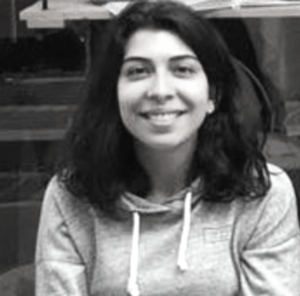
Yasmine Masri
Yasmine Masri is the Program Director at Search for Common Ground in Lebanon. She is a strong believer in the peacebuilding work and the possibility to resolve conflicts in a peaceful way. Her work focused on various challenges in Lebanon and Syria such as the barriers to women inclusion and socio-political empowerment, the rights for Palestinians to work in Lebanon, lack of inclusivity in local governance, lack of collaboration between local civil society organizations. She holds an MA in International Affairs in which her thesis focused on the roles women have played in ending civil wars and rebuilding peaceful societies.
Participant in: May 2018 Fellowship: Peacebuilding and Women’s Meaningful Participation in Peacebuilding Processes
Azza Maghur
Azza Maghur is a lawyer and human rights activist. She is an expert on the technical committee of the UNSMIL/UNDP reconciliation project, and was the only woman member of the February Commission to amend the Constitutional Declaration (2014). She has spoken at numerous international conferences on various aspects of democracy, gender equality, and constitutional rights. She also works for growth in the community through initiatives encouraging women’s participation in cultural activities, and seeks to increase gender equality within communities through such initiatives. She has also published numerous collections of short stories.
Participant in: May 2018 Fellowship: Peacebuilding and Women’s Meaningful Participation in Peacebuilding Processes
Dr. Enas Saleh R. Abduassalam
Dr. Enas Saleh R. Abduassalam is an Ophthalmic General Practitioner at the Tripoli Eye Hospital, Libya, with extensive volunteer experiences with civil society organisations in Libya. She is a passionate advocate for giving women a voice in the medical field, a field that is hugely impacted by all aspects of conflict. She is also a member of Medical Build Up Company for School Health, a programme that examines school children for chronic illnesses. She is a member of the Red Cross and previously managed the charity In Order to Be. During the Libyan revolution, she volunteered in hospitals using her medical skills to treat the wounded. She has held a number of volunteer roles fundraising and event planning for charities.
Participant in: May 2018 Fellowship: Peacebuilding and Women’s Meaningful Participation in Peacebuilding Processes
Zainab Langhi
Zainab Langhi is Assistant Officer and Social Media Team Leader at the Libyan Women’s Platform for Peace, an organization working to ensure women remain central to life in Libya, emphasizing inclusive transition, women’s rights, youth leadership, economic participation, constitutional reform, and education. Prior to this, she held several other positions in the organization, including coordinating various campaigns seeking to empower women and recognize the diverse roles they play.
Participant in: May 2018 Fellowship: Peacebuilding and Women’s Meaningful Participation in Peacebuilding Processes
Hivin Kako
Hivin Kako is the country director of the Maram Foundation for Relief and Development. She is also studying for a Master’s degree in International Development (Conflict, Security and Development) at the University of Birmingham. Previously she was an Executive Director at the BAHAR Relief organization, spokesperson for the Syrian Observatory for Human Rights in London, and the Syrian Women’s Network in Turkey. Her work has focused on raising awareness of complex gender issues in Syrian culture and how these issues are affected by conflict.
Participant in: May 2018 Fellowship: Peacebuilding and Women’s Meaningful Participation in Peacebuilding Processes
Jeeda Alhakim
Jeeda Alhakim is a counselling psychologist in-training in the UK and hopes to return to Syria to develop a psychological practice and participate in community based projects to fully address the psychological needs associated with the ongoing conflict. Before moving to the UK she was a project assistant at the International Organisation for Migration in Syria and volunteered at the Syrian Red Crescent. She has been a practicing therapist for 8 years and is currently working as a psychologist supporting survivors and the bereaved of the Grenfell Tower fire that took place in London. She is currently a lecturer at the University of East London, where she completed her postgraduate studies in teaching for higher education. Jeeda has also recently finished her doctorate in Counselling Psychology from City University, London and is now awaiting her certificate.
Participant in: May 2018 Fellowship: Peacebuilding and Women’s Meaningful Participation in Peacebuilding Processes
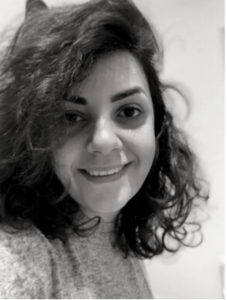
Sawsan Abou Zainedin
Sawsan Abou Zainedin is a Syrian architect and urban development planner based in London. Her work addresses the spatial manifestations of conflicts through research and practice, with a focus on the political, socioeconomic, and technical challenges of urban development and reconstruction in Syria. She has worked with academic institutions, think tanks, INGOs, civil society organisations and the private sector as an independent consultant and researcher. She is the co-founder of Sakan Housing Communities, a non-profit social enterprise for developing inclusive and socially just housing programs to aid recovery in Syria. Sawsan holds MSc in Urban Development Planning with distinction from the Bartlett’s Development Planning Unit of University College London. She also holds a post-graduate diploma from the Institute of Housing and Urban Development Studies at Erasmus University and a bachelor’s degree of Architecture from the University of Aleppo.
Participant in: May 2018 Fellowship: Peacebuilding and Women’s Meaningful Participation in Peacebuilding Processes
Yaman Al-Qadri
Yaman Al-Qadri is an active member of the Syrian diaspora community, advocating non- violent movements against oppression. In 2012 she was detained in Syria and consequently sought political asylum in Canada where she resumed studying and completed a BSc degree in Psychology at Concordia University. In 2012 she spoke at the UN regarding human rights violations in the detention facilities of Syrian authorities. She is currently studying for a Master’s degree in Psychosocial and Psychoanalytical Studies: Refugee Care at the University of Essex, UK.
Participant in: May 2018 Fellowship: Peacebuilding and Women’s Meaningful Participation in Peacebuilding Processes
Ghadah Hasan
Ghadah Hasan has over seven years of experience as a humanitarian worker at the UN Office for the Coordination of Humanitarian Affairs (UNOCHA) in Sana’a, Yemen. Prior to this she was a supervisor, and teacher of English at the Modern American Language Institute in Sana’a. She has a Master’s degree in Business Administration in which her thesis research focused on the level of satisfaction of affected people with humanitarian assistance in conflicts.
Participant in: May 2018 Fellowship: Peacebuilding and Women’s Meaningful Participation in Peacebuilding Processes
Mariam Safi
Mariam Safi is the founding Director of the Organisation for Policy Research and Development Studies (DROPS), a leading think-tank in Afghanistan committed to strengthening democratic ideas and values through its policy-orientated research, training and advocacy programmes that aim to increase women’s participation and representation in policy discourse. In 2014, she was honoured by the Diplomatic Courier media network as one of their Top Global Women in 2014 for her contribution to the research community in Afghanistan. Her areas of interest and expertise include peace-building, human security and countering violence extremism and offering a grassroots and gendered perspective on issues effecting Afghanistan and the region of South Asia.
Participant in: August 2018 Fellowship: Peacebuilding and Women’s Meaningful Participation in Peacebuilding Processes
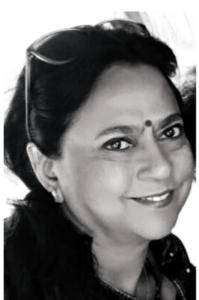
Savitri Sharma
Savitri Sharma is the Country Director of Find your Feet – UK for both India and Nepal. Her work in both countries focuses on social justice for rural and remote communities where poverty and limited access to food is widespread. Through capacity building training programmes, and empowerment and advocacy programmes the organisation helps families to overcome poverty and hunger. Savitri has over 30 years of experience in the social sector and has worked for a number of international and national NGOs, including, CARE International, Swedish Organisation for Individual Relief, Setu Kaaran Sansthan and Prerna Population Resource Centre among others. Savitri holds a Masters degree in Social Work from the University of Lucknow and is a certified Master Coach of CEDPA / Plan International USA. She specialises in social development, women and youth empowerment, and international development project management.
Participant in: August 2018 Fellowship: Peacebuilding and Women’s Meaningful Participation in Peacebuilding Processes
Ruqaia Tabasum
Ruqaia Tabasum, a native of Kashmir (Indian side) is currently working as a Research and Programme Manager at the organisation, Equality for Peace and Democracy, based in Kabul. Her main areas of work include monitoring women in peace and security, women’s responses to radicalisation in Afghanistan and Pakistan, improving the economic independence of women in women protection centres, and engaging civil society for improved and accountable local service delivery. Previously, she has worked for a number of international organisations including International Centre for Research, and Jameel Poverty Action Lab, where she mainly focused on girls’; education, and women’s access to health services in rural areas of India. She is currently pursuing her PhD in Human Rights with a focus on Human Rights diplomacy in Indian Foreign Policy. Ruqaia also volunteers for many women’s networks and welfare organisations in India and Kashmir.
Participant in:
August 2018 Fellowship: Peacebuilding and Women’s Meaningful Participation in Peacebuilding Processes
August 2019 Fellowship: The Arts as a Tool for Peacebuilding
Lubna Rafiqi
Lubna Rafiqi is from one of the highest militarised zones in the world, Kashmir. She is a Programme Coordinator at Mool Sustainability Research and Training Centre where her programmes focus on community well-being and alternative education for kids and youth. She is also a Youth Dialogue Facilitator for an initiative by Conciliation Resources in Kashmir. She works with young people in Ladakh, Jammu and Kashmir to develop an understanding of what kind of society youth in the region imagine for themselves in the future, what socio-political and economic transformations are needed and how young people can make communities more inclusive and peaceful in the disputed territory. Previously, In 2015 – 2016, Ms Rafiqi was a guest lecturer at the University of Heidelberg and spoke on the identities of young people in Kashmir. She holds an MA in Psychology and BA in Education from the University of Kashmir.
Participant in:
August 2018 Fellowship: Peacebuilding and Women’s Meaningful Participation in Peacebuilding Processes
August 2019 Fellowship: The Arts as a Tool for Peacebuilding
Tamara Abu Nafiseh
Tamara Abu Nafiseh is a Project Coordinator for GBV in Emergencies programme within the UN Relief and Works Agency for Palestine Refugees in the Near East. Prior to this, Tamara has been a Gender Officer within the same department, and has written a number of publications on gender, GBV, and women’s experiences.
Participant in: November 2017 Fellowship: Peacebuilding and Women’s Meaningful Participation in Peacebuilding Processes
Alissar Al-Joundi
Alissar Al-Joundi is a programme associate of the UNDP Strategic Advisory Unit where she works on early recovery and livelihood initiatives as well as promoting youth-led initiatives focussing on peacebuilding and social cohesion. Before this she worked with the Syria Trust for Development, as well as the International Organization for Migration in Syria, where in both cases she focussed on psychosocial support.
Participant in: November 2017 Fellowship: Peacebuilding and Women’s Meaningful Participation in Peacebuilding Processes
Jida Malas
Jida Malas has recently completed an MSC in Sociology. Prior to this, she has been an Outreach Programme Officer working with Syrian IDPs, and a Community Service Associate at the UNHCR in Damascus, where she created and managed the Outreach Refugee Volunteers Programme, which sought to empower Iraqi refugee volunteers in Syria.
Participant in: November 2017 Fellowship: Peacebuilding and Women’s Meaningful Participation in Peacebuilding Processes
Lana Khattab
Lana Khattab is as an international development practitioner and researcher. She has worked as Principal Researcher and Project Coordinator for a country-wide Knowledge, Attitude and Practice (KAP) Study for UNICEF in Lebanon and was previously Programme Officer for International Alert’s gender team where she worked on the MENA region as well as globally. Her areas of focus encompass gender equality, displacement and conflict and social cohesion. Before joining International Alert, she has worked in the Gender Unit of the UNRWA in Amman, Jordan. Lana holds an MSc in Middle East Politics from SOAS, University of London and a BA in International Relations from the University of Birmingham
Participant in: November 2017 Fellowship: Peacebuilding and Women’s Meaningful Participation in Peacebuilding Processes
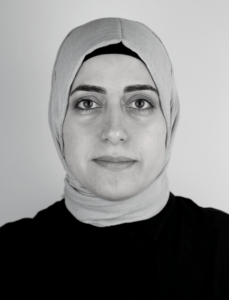
Sarah Karkour
Sarah Karkour is the foreign affairs officer at National Coalition of Syrian Revolution and Opposition Forces (SOC), who works on promoting, strengthening, and activating SOC relationships with the international and regional actors in order to achieve the objectives of the Syrian revolution and implement SOC political vision for a sustainable peace solution in Syria. She worked previously as public relations manager where she developed her skills in political communication and media relationships that helped her build a comprehensive deep understanding of the challenges of the Syrian issue. She holds a B.A. in private law, and a master in Islamic Studies, specialization in comparative law (positive and Islamic law). Currently, she is working on finishing the thesis of her second master in Global Affairs on the role of international organizations in Syria since 2011. She is an alumna of Beyond Borders Women in Conflict1325 fellowship, SciencesPo “Femmes D’avenir en Méditerranée”, International Visitor Leadership Program “Young Political and Economic Leaders”, and Women’s Democracy Network.
Participant in: May 2018 Fellowship: Peacebuilding and Women’s Meaningful Participation in Peacebuilding Processes
Yafa Kasem
Yafa Kasem is currently Senior Registration Assistant at the United Nations High Commissioner for Refugees in Damascus, where she works closely with Iraqi and non-Iraqi refugees. She has also been part of a number of technical units including refugee registration and community-based protection. Her work at UNHCR has also involved deployment to Tunisian-Libyan borders in Zarzis, South Tunisia, where she worked on protection and counselling for vulnerable refugees.
Participant in: November 2017 Fellowship: Peacebuilding and Women’s Meaningful Participation in Peacebuilding Processes
Saoussen Ben Cheikh
Saoussen Ben Cheikh is a humanitarian aid worker and activist from Tunisia with a particular focus on the protection of human rights and gender inclusivity in the peace and reconciliation processes in the MENA region. Saoussen is currently Programme Manager at Internews (MENA), leading a programme coaching media and civil society in conflict zones. Prior to this, Saoussen has been a Humanitarian Affairs Officer at Médecins sans Frontièrs, and a research analyst at various international organisations. Saoussen has a PhD in Contemporary History – Peace and Conflict in MENA, and an MSc in International Cooperation.
Participant in: November 2017 Fellowship: Peacebuilding and Women’s Meaningful Participation in Peacebuilding Processes
Abeer Almutawakel
Abeer Almutawakel is a recent graduate of Oxford Brookes University, holding a MA in Development and Emergency Practice and focussing on peacebuilding efforts in Yemen. She has conducted a wide variety of research on issues such human rights, development, conflict, emergencies, forced migration, and protection. She was also part of the team that worked closely with Syrian refugees in Saidah, Lebanon to study the impact of refugees and displaced persons on host communities, and local responses to refugees. Prior to this Abeer was the general manager of the Dr Abdulkader-Almutawakel Hospital in Sana’a, a position she had to give up due to the conflict in her home country.
Participant in: November 2017 Fellowship: Peacebuilding and Women’s Meaningful Participation in Peacebuilding Processes
Bushra Nasr Kretschmer
Bushra Nasr Kretschmer is a developmental consultant at Sabaa Consulting and a Yemeni democracy and gender activist based in Stockholm. Bushra co-founded the Coordinating Council for Youth Revolution and Change in Yemen, as well as the Yemeni Center for Transitional Justice, and has more than fourteen years of experience working with organizations such as the World Bank-IFC, USAID and GIZ on gender and finance in Yemen.
Participant in: November 2017 Fellowship: Peacebuilding and Women’s Meaningful Participation in Peacebuilding Processes
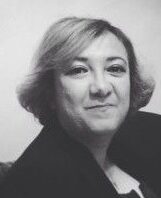
Enas Alarashi
Enas Alarashi is a Member of Women Technical Advisory Team to UNOSESGY. Enas graduated from the University of Sana’a with a BA in accounting in 1994. Enas also is an Advisor at the British Embassy, Yemen. Prior to her work at the Embassy, Enas was Yemen Portfolio Coordinator at the UNDP Mine Action Programme and was formerly Financial Manager at the Gender Sensitive Economy Project implemented by the Women’s Economic Empowerment Association.
Participant in: November 2017 Fellowship: Peacebuilding and Women’s Meaningful Participation in Peacebuilding Processes
Marwa Baabbad
Marwa Baabbad is a researcher with a specific interest in the security sector. Marwa has previously worked as a development professional with Saferworld in Yemen, where she led on gender, peace, and security projects in Yemen, Egypt, Libya, Syria, and neighbouring countries. Marwa was also a member of the Youth Consultative Group for the UNDP’s Arab Human Development Report.
Participant in:
November 2017 Fellowship: Peacebuilding and Women’s Meaningful Participation in Peacebuilding Processes
August 2022 Fellowship: The Arts as a Tool for Peacebuilding
Safa Algoum
Safa Algoum is a Protection Cluster Associate at UNHCR Yemen, where she works with government, National/International NGOs and UN agencies to coordinate humanitarian efforts. Prior to this, Safa was a Community Services Associate within the same office, and as a Field Officer for the Orphans and Child Welfare Programme at Islamic Relief Yemen, where she focused primarily upon the protection of children and awareness campaigns.
Participant in: November 2017 Fellowship: Peacebuilding and Women’s Meaningful Participation in Peacebuilding Processes
Salama Bakhalaa
Salama Bakhalaa is a Humanitarian Affairs Officer in the UN Office of Coordination of Humanitarian Affairs in Yemen. Salama has previously worked as National Programme Officer at the International Organisation for Migration, where she previously worked as an Emergency and Post-Crises Programme Officer, and as Senior Programme Assistant. Salama has an MA in International Development Management, and was the recipient of the Chevening Scholar Award in 2013/14, and a Peace Leadership Student (USAID) in 2008/9.
Participant in: November 2017 Fellowship: Peacebuilding and Women’s Meaningful Participation in Peacebuilding Processes
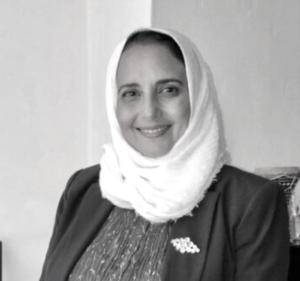
Shada Nasser
Shada Nasser is a Yemeni lawyer and human rights activist dedicated to protecting the rights of women in Yemen. She was the first female Yemeni lawyer and the first female lawyer not to cover her face in Yemen courts.” In 1996, Shada founded an all-female law firm “Pioneer Female Lawyers and represents Yemeni women and girls as a defence lawyer. As an opponent of child marriages in Yemen, she provides legal support for girls to get divorced. In 2008, she succeeded in divorcing Nujood Ali Alahdal, who at the time of divorce was ten, making her the youngest divorcee in the world. Ali’s case encouraged other young female brides in Yemen to seek divorce, and Shada, together with Nujood Ali, were elected Women of the Year at Glamour Magazine. Shada also worked as a lawyer for several NGO’s such as Doctors without Borders, World Doctors and Best Yemen.
Participant in: November 2017 Fellowship: Peacebuilding and Women’s Meaningful Participation in Peacebuilding Processes
Shatha Al Harazi
Shatha Al-Harazi is works at the Office of the Special Envoy of the Secretary General for Yemen, and was a delegate at the Yemen National Dialogue Conference, where she was a member of the National Issues, Transitional Justice, and National Reconciliation Committee, and was elected as rapporteur. Al-Harazi is the co-founder of a youth initiative called Inclusion for women and youth engagement in the decision-making process. Inclusion worked as a watchdog enabling women and youth to monitor the performance of the interim Yemeni government. In 2012, Al-Harazi received the Global Trailblazer award by Vital Voices for her work.
Participant in: November 2017 Fellowship: Peacebuilding and Women’s Meaningful Participation in Peacebuilding Processes
Dalia Mahir
Dalia Mahir is a Human Rights Officer at the United Nations Assistance Mission for Iraq, where she supports legislation efforts related to minorities; documents human rights violations; and supports local institutional reform. Prior to this, she was Assistant Cultural Affairs Officer at the US Embassy in Baghdad, and a Field Officer with the United States Institute of Peace, where she worked on Civic Education and Interfaith Dialogue. In 2014, she was awarded an FCO Chevening Fellowship Award.
Participant in: May 2018 Fellowship: Peacebuilding and Women’s Meaningful Participation in Peacebuilding Processes
Rajeshwari Krishnamurthy
Rajeshwari Krishnamurthy is the Deputy Director of the Institute of Peace and Conflict Studies and the coordinator of its Centre for Internal and Regional Security (IReS). Her research focuses on the security dynamics and politics in South Asia (specifically Afghanistan, Pakistan and Bangladesh), Central Asia and West Asia. Prior to joining IPCS, she was the Content Manager at Gateway House: Indian Council on Global Relations, Mumbai. She is also Member, Advisory Council, Women & Peace Studies Organization (formerly RIWPS), Afghanistan; and has been a South Asia Visiting Fellow at the Henry L Stimson Center, Washington, DC.
Participant in: August 2017 Fellowship: Peacebuilding and Women’s Meaningful Participation in Peacebuilding Processes
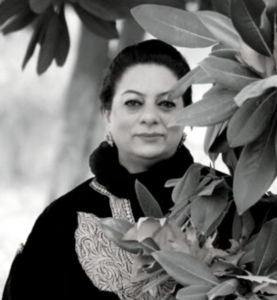
Ezabir Ali
Ezabir Ali is a Commonwealth professional and Harvard Alumnae from Kashmir. In the course of her 25 year career, she has served in the public and non-profit sectors of the State of Jammu and Kashmir. For more than two decades, she has done extensive work on the psycho-social healing and economic development of women in Kashmir. Ezabir established SAMANBAL, a “safe inclusive space” for women across all divide to dialogue and build solidarity to improve relationships amongst women of three regions, who were deeply divided over a lengthy period of time. SAMANBAL’s have been established in all the three regions of the State.
Ezabir Ali is Member of Commonwealth Women Mediators and Founder/ Secretary to EHSAAS, a Non-Governmental Policy group working on advocacy on rights of women in J&K State. She is also Board Member, Jammu and Kashmir Voluntary Health & Development Association and Consultant/Partner Conciliation Resources, Gender Project, South Asia.
Ezabir Ali completed her basic education in Nyeri, East Africa. She holds a bachelor’s degree in psychology and Education, from Kashmir and Masters in English from Kashmir University and Masters in Development Studies from University of East Anglia, Norwich.
Participant in:
August 2017 Fellowship: Peacebuilding and Women’s Meaningful Participation in Peacebuilding Processes
August 2019 Fellowship: The Arts as a Tool for Peacebuilding
Atia Anwar Zoon
Atia Anwar Zoon is the Director of the Women Wing at Kashmir Institute of International Relations (KIIR) and is assistant Professor in English at Federal Urdu University Islamabad. Since 2013 Atia has been involved with women’s issues in Kashmir, working in particular on initiatives to make the voice of women heard in the Kashmir conflict. Atia has been closely involved in a project supported by Conciliation Resources called Cross Lines of Control, focussing on the role of women in peacebuilding. Atia has also been part of numerous research projects related to women and gender. She has participated in the United Nations Human Rights Council since 2014. She holds a PhD in English linguistics and wrote her thesis on ‘Working Women: Negotiating Multiple Identities in conflict settings: A case study of women of disputed Pakistani Administered Kashmir’.
Participant in:
August 2017 Fellowship: Peacebuilding and Women’s Meaningful Participation in Peacebuilding Processes
August 2019 Fellowship: The Arts as a Tool for Peacebuilding
Ashima Kaul
Ashima Kaul is Managing Director and founder of Yakjah Reconciliation and Development Network. She is also local correspondent in Kashmir for Insight on Conflict, Peace Direct and a consultant with Women in Security, Conflict Management and Peace. A member of the Hindu Pandit minority, she is the coordinator of Athwaas, a WISCOMP initiative for conflict transformation in the provinces of Jammu and Kashmir. In addition, Ashima is an independent journalist, contributing to national daily newspapers such as The Times of India, The Hindustan Times, and The Hindu since 1991. Ashima has completed numerous trainings and was awarded ‘100 Women Achievers of India’ in 2016 by Ministry of Women and Child Development’.
Participant in: August 2017 Fellowship: Peacebuilding and Women’s Meaningful Participation in Peacebuilding Processes
Dr. Mariyam Shakeela
Dr Mariyam Shakeela worked in numerous diverse fields prior to becoming a Cabinet Minister. She was Chairman of the Executive Board at World Health Organization and has held numerous ministry positions including Minister of Health, Minister of Health and Gender, Minister of Environment and Energy, Acting Minister for Gender Family and Human Rights, and Acting Minister of Foreign Affairs. She also headed the National Drug Agency, Environment Protection Agency, Maldives Energy Authority, Meteorological services and the Biosphere office.In addition, she is chairperson to several entities which include Maldives Network to Empower Women (MNEW); Institute of Counselling and Psychotherapy (ICP); Addu Women’s Association (AWA) and International Medical and Diagnostic Centre (IMDC). She is also a member of Civil Service Action Group (CSAG), of UN WOMEN, Multi Country Office. She holds a PhD in Management and Leadership from the Curtin University of Technology.
Participant in: August 2017 Fellowship: Peacebuilding and Women’s Meaningful Participation in Peacebuilding Processes
Musarat Amin
Musarat Amin is Post-doctoral Fellow with the South Asia Centre of London School of Economics and Political Science. Furthermore she is Assistant Professor at the Department of Defence and Diplomatic Studies at Fatima Jinnah Women University Rawalpindi. Prior to this, she held posts at numerous Universities in Pakistan, including as an Assistant Professor of Peace and Conflict Studies. She has numerous publications to her name and has often appeared on national media as an analyst. She holds a PhD in International Politics from Jilin University China. She also received a gold medal at BZU Multan University for her M.A in International Relations.
Participant in: August 2017 Fellowship: Peacebuilding and Women’s Meaningful Participation in Peacebuilding Processes
Gulalai Ismail
Gulalai Ismail is a women’s rights expert and activist with over 13 years of experience in the field of gender equality and advocacy. She is founder of Aware Girls, the first young women and girls’ led organisation in Pakistan. She is currently working on a number of projects including the “Advocacy for the Right of Secondary Education of All Girls” project in Khyber Pakhtunkhwa Province with the support of the Malala Fund. Prior to this, she was Monitoring and Evaluation Officer at RISE, and a Fundraising Officer at Coalition on the Rights and Responsibilities of Youth. Gulalai is the recipient of the 2016 Chirac Peace Prize as well as the 2014 International Humanist Award and was among the 100 Leading Global Thinkers according to Foreign Policy Magazine. She holds a PhD in Biotechnology from Quaid-i-Azam University Islamabad-Pakistan.
Participant in: August 2017 Fellowship: Peacebuilding and Women’s Meaningful Participation in Peacebuilding Processes
Mossarat Qadeem
Mossarat Qadeem is the Executive Director of PAIMAN Alumni Trust, a nonprofit organization promoting socio-political and economic empowerment of marginalized Pakistanis. Ms Qadeem also founded and expanded Amn-O-Nisa, a coalition of women leaders and peace activists from Pakistan, Afghanistan and India who raise their voices to advocate for a peaceful region. She is currently a member of the International Review Panel of Global Community and Resilience Fund (GCERF) and Women Alliance for security Leadership (WASL). Ms Qadeem has published two books and numerous other publications. She holds a Masters degree in political science and gender studies from the Institute of Social Sciences, Netherlands and an MPhil in international politics (focusing on conflict studies) from University of Hull. She has also been a fellow at the Harvard Kennedy School of Government, USA.
Participant in: August 2017 Fellowship: Peacebuilding and Women’s Meaningful Participation in Peacebuilding Processes
Radhika Hettiarachchi
Radhika Hettiarachchi is team leader with The Community Memorialisation Project at Search for Common Ground. Previously she was Managing Director with the Development Strategies Group. She also set up ‘Herstories -Mothers’ Voices of Resilience and Hope (www.herstoryarchive.org)’ which is: “an archival project of peoples’ histories and oral histories, particularly that of women, whose voices are often lost in the retelling of war narratives”. Radhika is a development practitioner, curator and researcher with over 10 years experience working in the field of conflict transformation, recovery and peace building. She holds a Master of Science (M.Sc.) in Research and Development Management from the London School of Economics.
Participant in: August 2017 Fellowship: Peacebuilding and Women’s Meaningful Participation in Peacebuilding Processes
Sujatha Wijetilleke
Sujatha Wijetilleke is a professional trainer focused on providing development-training services. She specializes in work related to: women’s’ issues and livelihoods and helping with the development of rural communities.She is currently programme advisor for the WEWAV Network/Sarvodaya Women’s movement. She was President of the Sarvodaya Women’s Movement between 2008 and 2013 and regional Programme Manager for the Norwegian Church Aid South Asia Region. Furthermore she has been senior Project Director for CARE international and Programme Officer with the Swedish International Development Cooperation Agency. Sujatha is a team member of the 2017 UN Women Study on Employment of women with Disabilities and ILO Study on Women’s Migration for employment. She holds a PhD in education from Central Pacific University.
Participant in: August 2017 Fellowship: Peacebuilding and Women’s Meaningful Participation in Peacebuilding Processes
Hana El-Gallal
Hana El-Gallal has Ph.D. in Law from Bern University of Bern, Switzerland with many articles published on youth, gender equality, extremism and a book published by Peterlang Switzerland: Islam and the West: Limits Freedom of Religion. She is the CEO of CAREITC for training and legal consultancy working on mediation and conflict resolution and conflict sensitivity and peacebuilding. She is a Senior Advisor to Multiple International organizations such as: IPTI consultancy on Civil Society, Peacebuilding and Inclusivity and member of IPTI Steering Committee, World Bank & Middle East Institute Consultancy on Reconstruction of Libya, UN Department of Political Affairs & Conflict Prevention and Peace Forum Consultancy on the Reforms of the UN Coordinators’ Role in the MENA Region, Peaceful Change International consultancy on Conflict and Gender Sensitivity Analysis. She was formerly Senior Law Adviser and researcher with specific focus in international Humanitarian Law, women’s rights, gender equality, children protection, and refugee protections with the Center for Strategic Studies, University of Jordan. Former Law Professor in University of Benghazi Libya. Former Minister of Education, Benghazi, Libya and Multiple Governmental Agencies and Sub-committees, Government of Libya, Benghazi, Libya such as Constitutional Committee, Transitional Justice Committee, etc.
Participant in: August 2017 Fellowship: Peacebuilding and Women’s Meaningful Participation in Peacebuilding Processes
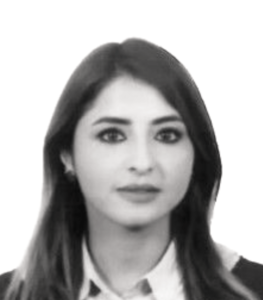
Israa Aljuboori
Israa Aljuboori is a Gender Officer at the United Nations Development Programme – Integrated Reconciliation Programme in Iraq. Her role is supporting and enhancing the role of women in the reconciliation and peace building process in Iraq. Prior to this she was the Project Officer of the Inclusive Governance Programme in the UNDP Iraq that focus on enhancing the capacity and effectiveness of Iraqi Parliament in constitution reform and parliamentary effectiveness. She has also had other roles with UNDP and USAID that supported security sector reform, role of law, Human Rights, access to justice sustainable development and job creation.
Israa has a Masters Degree in Global Management from University of Salford, Manchester, and a BA in Chemistry Science from University of Mustansiriya, Baghdad.
Participant in: November 2017 Fellowship: Peacebuilding and Women’s Meaningful Participation in Peacebuilding Processes
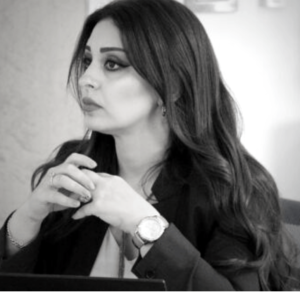
Mahab Madani Alkurkash
Mahab Madani is the head of Governance and Economic Diversification Pillars with the United Nations Development Programme UNDP and the Youth programme and Accelerator Lab Focal Point for UNDP Iraq.
Mahab has extensive experience on program and project management holding senior management positions with UN agencies, International Organizations, multiple functions, and industries leading and handling large scale projects in multi-functional areas and on a global basis.
Mahab holds B.Sc degree in Computer Engineering and PhD degree in Political Science and International Relations.
Participant in: November 2017 Fellowship: Peacebuilding and Women’s Meaningful Participation in Peacebuilding Processes
Ayat Mneina
Ayat Mneina is a Canadian-Libyan activist, writer and researcher with a focus on the 2011 Libyan uprising. She is the co-founder of ShabahLibya, an online media reporting and social media platform that functioned as a 24-hour newsfeed. ShababLibya grew to be an internationally recognized source of reliable information on Libya and has led Ayat to make media appearances as a speaker on channels such as Aljazeera, the BBC and the Guardian. Ayat is currently conducting research at the University of Manitoba on Libyan youth participation in the 2011 uprising and works as a policy analyst and researcher for the Manitoba Legislative Assembly.
Participant in: November 2017 Fellowship: Peacebuilding and Women’s Meaningful Participation in Peacebuilding Processes
Miesem Mobruk
Miesem Mobruk is an activist dedicated to the empowerment of Libyan women and youth. Trained as a dentist, Miesem became actively involved in the Libyan civil society after the 2011 uprising. Since then, she has co-founded “Tripoli’s Goodness”, an NGO dedicated to the security of displaced Libyans living in camps, and has worked with the International Medical Corps as a program officer of a refugee community centre in Tripoli. She is a member of various Libyan youth and women empowerment organisations, such as “Together We Build It” and “I am Tawfiq”, the latter of which she also co-founded. She is presently the project manager for the Libyan Foundation for project development, and is a practicing dentist in Tripoli.
Participant in: November 2017 Fellowship: Peacebuilding and Women’s Meaningful Participation in Peacebuilding Processes
Amal Khayat
Amal Khayat has worked for organisations such as OneVoice Palestine, Kids4Peace, and Yala Palestine, an organisation led by young leaders. She is a Fellow of the Solutions Not Sides programme run by One Voice Europe, and a member of a regional network of female activists and human rights defenders. Amal has an MSc in Global Community Development Studies, as well as an MSc in Public Health, which she completed having previously worked as a pharmacist.
Participant in: November 2017 Fellowship: Peacebuilding and Women’s Meaningful Participation in Peacebuilding Processes
Reem Bdaiwi
Reem Bdaiwi is a Humanitarian Affairs Officer with the United Nations Office for the Coordination of Humanitarian Affairs, where she is a member of the GBV working group, working closely with women and GBV issues. Prior to this she worked as National Coordinator for Relief International in Erbil. Reem also volunteers with the International Rescue Committee and Refugee Focus Resettlement Service.
Participant in: June 2017 Fellowship: Peacebuilding and Women’s Meaningful Participation in Peacebuilding Processes
Sarah Boukhary
Sarah Boukhary joined HD’s Yemen team in October 2020, prior to which she worked for 6 years at the Women’s International League for Peace and Freedom (WILPF) where she managed its international advocacy work on Yemen, Syria, Iraq, Libya, Palestine, Lebanon and Egypt, and represented WILPF at the United Nations in Geneva. She was primarily working with women political leaders and feminist activists from Yemen and different MENA countries in their participation in peace processes, inclusion in multiple tracks of mediation, and engagement with international human rights mechanisms. Prior to joining WILPF, Sarah worked at the Arab NGO Network for Development, Première Urgence – Aide Médicale Internationale, and interned at Human Rights Watch in Beirut. Sarah is an Erasmus Mundus scholar and holds an M.A. in Human Rights Policy and Practice from Gothenburg University, Roehampton University and the Arctic University of Norway, as well as a B.A. in Political Studies from the American University of Beirut (AUB). She is a Fellow in the Women in Conflict 1325 Fellowship and speaks fluent Arabic, English, and French.
Participant in: June 2017 Fellowship: Peacebuilding and Women’s Meaningful Participation in Peacebuilding Processes
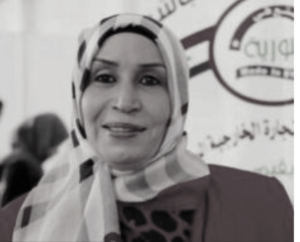
Fathya El-Madani
Fathya El-Madani is the Director of the Libyan Women’s Capabilities Development Centre (NATAJ), which focuses on women’s rights, particularly abused women’s legal rights. Fathia was also one of 40 women who participated in and wrote the Libyan Women’s Peace Treaty (2015).
Participant in: June 2017 Fellowship: Peacebuilding and Women’s Meaningful Participation in Peacebuilding Processes
Huma Chughtai
Huma Chughtai is governance, gender & development, parliamentary & judicial reform specialist with her first degree in LL.B (Law & Sharia) and her second degree in LL.M (International Human Rights Law). She has a professional standing of almost thirty years of having worked initially as a Lawyer, then as an internationally trained Legislative Researcher in the Parliament of Pakistan, and later as a Governance, Law, Human Rights and Gender Specialist for over a decade and a half. Rights of women with disabilities, women in disasters and conflict, and gender and energy are some of the key areas she has worked in. Her focus of work has been reform based in the realm of parliamentary, legal, judicial, electoral, and law enforcement. Gender perspectives and human rights remain cross-cutting in all her work. Ms. Chughtai has served in various key positions within the government as well as within the development sector. Most of her work in the government has been of technical nature with the Parliament, Ministries of Women Development, Law & Justice, and Human Rights. She is currently serving as permanent faculty and Director Programs with the Federal Judicial Academy, where she designs judicial education programs for the judges, prosecutors and court staff as well as imparts training to them.
Participant in: August 2018 Fellowship: Peacebuilding and Women’s Meaningful Participation in Peacebuilding Processes
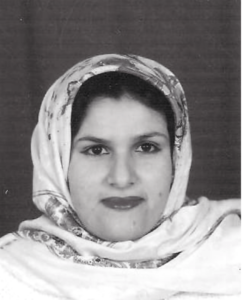
Ghmera Krekshi
Ghmera Krekshi is a Senior Protection Officer at the Danish Refugee Council and a Senior Program Officer at the International Medical Corps, where she is responsible for supervising a Community Development Centre providing medical and social assistance to asylum seekers and refugees. Prior to this, Ghmera worked for ALWAFA, an NGO providing humanitarian services to refugees, asylum seekers, and vulnerable persons.
Participant in: June 2017 Fellowship: Peacebuilding and Women’s Meaningful Participation in Peacebuilding Processes
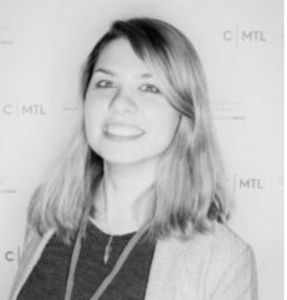
Muzna Dureid
She’s a co-founder and board member of Syrian women’s political movement first political movement to engage Syrian women on politics and peace talks. Dureid is the founder of Indigenous – Refugees movement is a safe-space for women and series workshops for Youth on lessons learned between both groups which aim to build stronger bonds in Canada by learning the truth and resilience. She is a winner of Canadian Excellence in global Women and Children’s Health award for the young category of 2019. Muzna was nominated to the finalist list of 25 top Canadian immigrants in Canada just after one Year and winner of the Canadian Association of Refugee Lawyers Annual Award 2019 for outstanding advocacy of the human rights of refugees.
Dureid has experience from her work with the White helmets and Folkekirkens Nødhjælp -DCA on supporting various projects with a focus on protection programs which included Mines risk education and Sexual and Gender-based Violence (SGBV). She’s a member of Network for refugee voices and member of the advisory committee on seven-years research called ‘Local Engagement Refugee Research Network (LEARN) project ‘ in (Lebanon, Turkey, Tanzania, and Kenya) about the role of civil society in promoting protection and solution for refugees and the implementation of the Global compact for refugees by Carleton University in Canada.
Noura Al Jizawi
Noura Al Jizawi is the founder of the Istanbul-based NGO Start Point that works on building awareness around human rights and gender issues in the Syrian conflict. Noura first began working as an activist in human rights in 2008, organizing students at universities against the practice of honor killings. In 2012 whilst trying to obtain her masters degree she was imprisoned for her activities in the revolution. She fled to Turkey in 2013 where she joined the political opposition and was twice elected Vice-President of the National Coalition of Syrian Revolution and Opposition Forces. In 2014 she was a member of the Syrian negotiation team in Geneva before resigning in 2015.
Participant in: June 2017 Fellowship: Peacebuilding and Women’s Meaningful Participation in Peacebuilding Processes
Sabah Alhallak
Sabah Alhallak is a board member of the Syrian Women’s League and Syrian League for Citizenship. She is a women’s rights activist, focussing on women’s and citizens equal rights. Sabah is active in both international and national processes related to women’s representation in peace building and transition for a new democratic Syria. She is a member of Syrian Women\’s Initiative for Peace and Democracy,hosted by UN Women and she recently participated in a UN General Assembly event on Syria, meetings with the office of the Commission of Inquiry to Syria, events in the Human Rights Council and the CEDAW pre-session, in addition to other key meetings in the region. She is a member of the Syrian civil society room with the Mr. de Mistura team in the Geneva talks.
Participant in: June 2017 Fellowship: Peacebuilding and Women’s Meaningful Participation in Peacebuilding Processes
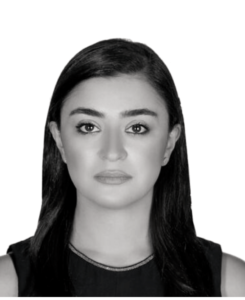
Maysam Fadel Allah
Maysam Fadel Allah has been an Emergency Officer for more than two years at UNICEF in Tartous and Damascus, Syria, where she works mostly towards the emergency relief of internally displaced people, evacuees, returnees, and other people in need. Prior to this, she worked for more than five years for UNHCR in Damascus as Senior Community Services Case Worker, where she responded to the need for protection of refugees, asylum seekers, evacuees and internally displaced people. Maysam has started her master studies in the International Development this year at Birmingham University, the major is on Conflict, Security and Development.
Participant in: November 2017 Fellowship: Peacebuilding and Women’s Meaningful Participation in Peacebuilding Processes
Sema Nassar
Sema Nassar is a human rights defender, working on documenting violence against women, arbitrary arrest and enforced disappearance in Syria.
She has organised training programmes for a group of human rights defenders on monitoring sexual and gender based violence as well as providing advice to local and international organizations in this field. She published a number of reports on the patterns of sexual violations, use of women as bargaining tools , and forgotten children in detention centers.
Currently working on a research about the impact of documenting violations in the Syrian conflict on the path of transitional justice in the Research Department at the London School of Economics and Political Science (LSE).
Sema is executive director and co-founder of Urnammu for Justice and Human Rights, member of the EuroMed Rights Gender Working Group (GWG) ,and Co-founder of “WE” network, a Framework to create safe environment for WHRD in MENA region.
Participant in: June 2017 Fellowship: Peacebuilding and Women’s Meaningful Participation in Peacebuilding Processes
Sinem Arslan
Sinem Arslan is an academic and researcher on peace and conflict studies, and a peace activist. Sinem was a parliamentary candidate and is currently working on three peace projects. She has written and talked extensively on conflict, terrorism, academic freedom, and civil war. She holds an MA in European Studies from the Bosphorus University and an MSc in Comparative Politics from London School of Economics. Sinem is currently completing her PhD.
Participant in: June 2017 Fellowship: Peacebuilding and Women’s Meaningful Participation in Peacebuilding Processes
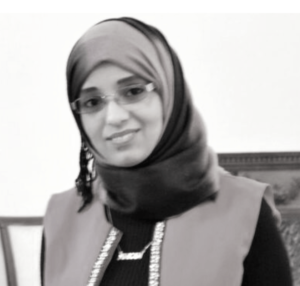
Ahlam Al Bashiri
Ahlam Al-Bashiri works with Saheliya in Edinburgh, Scotland. Al-Bashiri was the alternative representative of Yemen to the IMO and the head of political affairs at the Embassy of the Republic of Yemen in London. Ahlam had worked for the Ministry of Foreign Affairs since 2008, during which time she was a member of the preparatory committee for establishing a women-representative electoral mechanism. She holds a BA in Political Science from the University of Sana’a and a diploma in International and Diplomatic Relations.
Participant in: June 2017 Fellowship: Peacebuilding and Women’s Meaningful Participation in Peacebuilding Processes
Quhramaana Kakar
Quhramaana Kakar has been leading and directing the organization she founded called ‘Women for Peace and Participation’ since 2013. Prior to this, she was Gender Advisor to the Afghanistan Peace & Reintegration Program (APRP) and Joint Secretariat of the High Peace Council. She has also held consultancy roles with EUPol and Atal, and was a Programme Officer at CAFOD. She won the N-Peace Role Model for Peace Award in 2012. She holds an MPhil in Sociology from the University of Cambridge and a Masters in Public policy from the Willy Brandt School of Public Policy in Germany.
Participant in: August 2017 Fellowship: Peacebuilding and Women’s Meaningful Participation in Peacebuilding Processes
Anan Abu Shanab
Anan Abu Shanab is the Legal Researcher and Advocacy Officer for Al-Haq Organisation, where she has conducted research into human rights issues and produced legal reports and briefings on the human rights violations and the use of force during protests. Anan is also a research assistant at the Australian National University in Ramallah, where she conducts research into the role of international human rights law and criminal law in Arab state formation. Prior to this, Anan worked with Human Rights Watch and the Civic Coalition for Palestinian Rights.
Participant in: March 2017 Fellowship: Peacebuilding and Women’s Meaningful Participation in Peacebuilding Processes
Rejna Alaaldin
Rejna Alaaldin is a lawyer and founder of legal advisory firm Kurdistan Legal Services. She is currently a National Law and Governance Consultant at the Ministry of Interior in the Kurdistan Regional Government, and also Programme Manager at Emma Organisation, where she works to increase the number of women in leadership and decision-making roles in Kurdistan. She is also the founder of the All for One network, working to establish a network amongst women and youth in the Kurdistan Region, promoting equality, education, and entrepreneurship.
Participant in: May 2018 Fellowship: Peacebuilding and Women’s Meaningful Participation in Peacebuilding Processes
Marwa Khobieh
Marwa Khobieh is the operations manager for Syrian Kids Foundation, which provides free education and medical services to refugee children, and established the Al-Salam School in Turkey. Marwa is also the director of the Canadian Alliances for Syrian Aid, which supports Syrian newcomers in Canada, and a project manager at the Syrian Canadian Foundation where she is responsible for establishing programmes to support Syrian’s arriving in Canada, working particularly with youth and women on issues such as empowerment and trauma recovery.
Participant in: March 2017 Fellowship: Peacebuilding and Women’s Meaningful Participation in Peacebuilding Processes
Maysa Ismael
Maysa Ismael worked for the UN High Commissioner for Refugees for five years prior to commencing her Masters in Sociology: Human Rights, Culture and Social Justice in 2016. During her time at UNHCR, Maysa was responsible for mobilising community support in Damascus for refugees, including support of Yezidi refugees in 2014. Prior to this, Maysa worked with IOM on projects relating to victims of trafficking in Syria and support for female-headed families. She also spent three years at the Orient Center for International Studies as a researcher, providing analytical reports on Syira, Lebanon and the US.
Participant in: March 2017 Fellowship: Peacebuilding and Women’s Meaningful Participation in Peacebuilding Processes
Samira Zair
Samira Zair is a founding member of the Syrian Women’s Network, which brings together female activists, journalists and academics. The Network aims to laws for full equality for women in the Syrian Constitution, and to integrate gender sensitive approaches to transitional justice, reconciliation and peace building processes. Samira is also the chair of the Syrian Women for a Citizenship-Bases State Committee.
Participant in: March 2017 Fellowship: Peacebuilding and Women’s Meaningful Participation in Peacebuilding Processes
Begum Zorlu
Begüm Zorlu is a researcher, freelance photo-journalist and translator. Whilst studying Democracy and Comparative Politics, Begüm provides advice on conflict resolution and current affairs for Gülseren Onanç, former vice chairwoman of CHP (Republican Peoples’ Party), peace and women’s rights activist. Begüm coordinated the Peace Journalism Project at Independent Communication Networkand is the founder and editor of the peace journalism website ‘Neynik’. Begüm was a teaching assistant of Modern Turkish History at Sabanci University and worked as a Research Assistant at the Ä°stanbul Policy Center. Her area of focus is social movements with an emphasis on the Kurdish Issue in Turkey, peace journalism, peace processes, Middle East and the Arab Uprisings.
Participant in: March 2017 Fellowship: Peacebuilding and Women’s Meaningful Participation in Peacebuilding Processes
Beilqes Alzawm
Beilqes Alzawm is the Human Rights Officer at the Embassy of Yemen in London, where she is responsible for strengthening bilateral relations between the British and Yemeni governments. Beilqes’ work focusses on humanitarian aid, press freedom and the abolishing of execution. She has also developed projects to tackle child and forced marriages in Yemen. Prior to joining the Embassy of Yemen in London, Beilqes was the Political and Economic Advisor for EU Affairs and the Embassy of Yemen in Hungary. Beilqes was the Sustainable Development & Gender trainer for the Women National Committee in Sana’a, where she led focus groups and trainings for women on sustainable business practices and gender rights. She has also developed projects to improve reproductive health in Yemen, and campaigned for the legal age of marriage to be raised to 18.
Participant in: March 2017 Fellowship: Peacebuilding and Women’s Meaningful Participation in Peacebuilding Processes
Manal Dammaj
Manal Dammaj is the second secretary at the Embassy of Yemen in London, prior to this she spent 10 years at the Ministry of Foreign Affairs in Yemen. During this time, Manal was an officer at the Arab World Affairs Unit, and a specialist in women’s and children’s affairs. Before joining the Ministry of Foreign Affairs, Manal worked with Islamic Relief on their Poor and Orphans Support Project, and with women and marginalised people in rural Yemen, and also spent time volunteering at a women’s centre for victims of domestic violence.
Participant in: March 2017 Fellowship: Peacebuilding and Women’s Meaningful Participation in Peacebuilding Processes
Hana Faidi
Hana Faidi is currently a project manager for the Economic Empowerment Project at Libyan Women’s Forum based in Tripoli, Libya. She is also the founder of Threads for Change, a non for profit organisation that seeks to uplift women economical through innovative micro-economic solutions to unemployment in rural communities in North Africa. She has been involved in a number of empowerment and human rights based programmes with Lawyers for Justice in Libya, Syrian Refugee Aid and the United Nations Intensive Summer Programme. Hana hold an MSc in Emerging Economies and International Development from Kings College London and a BA Hons in Political Science from McMaster University in Ontario, Canada.
Participant in: December 2018 Fellowship: Peacebuilding and Women’s Meaningful Participation in Peacebuilding Processes
Kathleen Thein
Kathleen Thein is a professional educator and passionate about women’s rights and peace security. She has made numerous interfaith peace talk on behalf of Hindu women representatives. Currently, she is the co-chair of Myanmar’s Teachers of English to Speakers of Other Languages committee, and regularly travels abroad to conduct workshop of TESOL conferences. Kathleen is heavily involved in interfaith dialogue talk in several organizations. She is also chair of the Hindu Women’s Association and promoting the importance of women program.
Participant in: August 2018 Fellowship: Peacebuilding and Women’s Meaningful Participation in Peacebuilding Processes
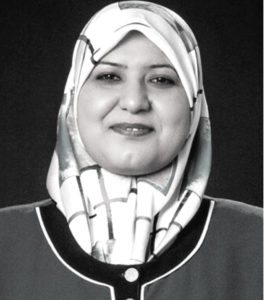
Feryal Alkaabi
Feryal Alkaabi is the Director of AWAN, an organisation working for the advancement of Iraqi women’s social, economic and political position through raising awareness and capacity building, and is a founding member of a group of CSO’s working on UN Security Council Resolution 1325. Feryal has contributed to numerous research and newspaper articles about violence against women and the political empowerment of women.
Participant in: June 2017 Fellowship: Peacebuilding and Women’s Meaningful Participation in Peacebuilding Processes
Razaw Ahmed
Razaw Ahmed is a lawyer with the Kurdistan Lawyers Syndicate and Humanitarian Liaison Officer with UNAMI. She has previously worked as a lawyer and advocate for the Institute for War and Peace Reporting, and for a range of NGOs and civil society organisations in Erbil and Sulaymaniyah. Razaw is also a fellow of the John Smith Trust Rule of Law programme.
Participant in: June 2017 Fellowship: Peacebuilding and Women’s Meaningful Participation in Peacebuilding Processes
Marina Haider
Marina Haider is Human Rights Officer for the UNOHCHR, where she is responsible for integrating gender into the monitoring of human rights violations in Yemen. She further works on protecting the rights of individuals that are affected by the current crisis as well as on the prevention of and response to Gender-Based-Violence in Yemen. She obtained a Master’s degree in Journalism and Mass Communication at Manipal University, India, and an undergraduate degree in Computer Science at Mosul University, Iraq. Before joining the UNOHCHR, Marina worked for UNICEF’s Education section on child protection and gender sensitivity. She also worked as a child protection officer at Save the Children.
Participant in: November 2016 Fellowship: Peacebuilding and Women’s Meaningful Participation in Peacebuilding Processes
Bilkis Abu Osba
Bilkis Abu Osba is Professor of Social Science at Sana’a University, Yemen. She obtained a PhD on political parties and democratic change and her research has further focused on gender and women’s participation in politics. During the elections in 2016, Bilkis campaigned for introducing a women’s quota to bring more women into decision-making positions and change society’s traditional image of women. Further, Bilkis is the first vice-chairwomen of the Supreme National Authority for Combating Corruption and is working with the Awam Foundation for Culture and Development.
Participant in: November 2016 Fellowship: Peacebuilding and Women’s Meaningful Participation in Peacebuilding Processes
Palwasha Hassan
Palwasha Hassan is the director of Afghan Women’s Educational Center. She holds a master’s degree in Post-war Recovery Studies from York University, UK and is a former fellow at the United States Institute of Peace. She is a dedicated Women’s Rights activist pioneering critical work for promotion of Women’s rights and civil society in Afghanistan that includes first women legal support organization Roazana, Women and street Children Center, Madadagar Women and Children Safe Home Network, and Irfan Cultural Center, among others. She is a strong advocate on women peace building and political participation. Ms. Hassan is born and raised in Afghanistan in her early teens she migrated with her family to Pakistan where she completed her school and acquired under grad degree in Science. In her school years she volunteered with a Women center for refugee women where she with few other women laid the foundation of Afghan Women Network, a visionary movement of women which is playing pivotal role in Women’s right lobby in the country from last twenty years.
Participant in:
August 2018 Fellowship: Peacebuilding and Women’s Meaningful Participation in Peacebuilding Processes
August 2019 Fellowship: The Arts as a Tool for Peacebuilding
Jamila Ali Rajaa
Jamila Ali Rajaa is an advisor to the Ministry of Foreign Affairs in Yemen and a senior mediator, researcher and analyst. Her recent work has focused on peace and security processes in Yemen and other Arab countries and Jamlia was a member of the Sa’ada Working Group of the National Dialogue Conference. Further, Jamila has provided consultation to a wide range of international and regional humanitarian and development agencies on different aspects of the Yemeni transition. She is also the founder and manager of Consult Yemen, a consultancy advising on politics, conflict resolution, media, human rights, gender and development. Jamila obtained a MA in Journalism at the American University in Cairo, Egypt and is a senior researcher, analyst and lecturer. She has published a number of papers and presentations on Yemen’s transition, state building, and women’s participation in peace processes. She was invited to speak at a conference about Yemen at Harvard University and has attended a fellowship at Stanford University on the rule of law, democracy and development.
Participant in: November 2016 Fellowship: Peacebuilding and Women’s Meaningful Participation in Peacebuilding Processes
Dr. Shaheen Afroze
Dr. Shaheen Afroze is Research Director and Head, Non-Traditional Security Studies Division and International Studies Division at the Bangladesh Institute of International and Strategic Studies (BIISS). BIISS is the premier think tank of Bangladesh established on 25 June 1978 by the Govt. of the People’s Republic of Bangladesh for the purpose of undertaking and promoting research and contributing to the development of objective and independent thinking on international affairs, security, and developmental issues. It is a statutory and autonomous institution and is affiliated with the Ministry of Foreign Affairs.
Dr. Afroze has an M.A degree in Contemporary History from the University of Dhaka. She did her Ph.D in International Relations from the University of Glasgow, UK, under Commonwealth Scholarship. Her major areas of interests are foreign policy and security of small states, non-traditional security studies including human security, peace and conflict studies, countering violent extremism and gender studies. She has edited a number of books and published a large number of articles in academic journals and books and also presented a large number of research papers in academic forums at home and abroad. She was awarded the Freedom Foundation Fellowship under which she produced a monograph titled “Women in Frontal Wars: The Liberation War of Bangladesh 1971.” She is one of the Editors of the BIISS Journal which is a quarterly peer reviewed journal.
Dr. Afroze is also an Academic Advisor in National Defence College, and Armed Forces War Course (AFWC) Mirpur, Dhaka. She served as a member for two terms in the International Research Committee of Regional Center for Strategic Studies (RCSS), Colombo, Sri Lanka.
Participant in: August 2018 Fellowship: Peacebuilding and Women’s Meaningful Participation in Peacebuilding Processes
Bahar Munzir
Bahar Munzir is the General Director of the People’s Development Organisation (PDO), in Iraqi Kurdistan. PDO works to promote political participation, particularly of women and youth, to combat gender based violence, to promote human rights and gender equality, and also works with internally displaced people and refugees to improve their health and living conditions.
Participant in: March 2017 Fellowship: Peacebuilding and Women’s Meaningful Participation in Peacebuilding Processes
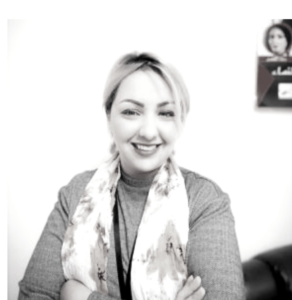
Saba Al-Nadawi
Saba A. Al-Nadawi assumed her role as Human Rights Officer on March 2014 with United Nations Assistance Mission for Iraq, Baghdad Office and relocated to Erbil during the Iraqi Crisis with Islamic State militants in Nineveh province. She had an official role with OHCHR Syria country office in 2018, where the main work was investigating and conciliating complaints received from the public concerning allegations of violations of the Human Rights Act. In missions in both Iraq and Syria part of these duties contributed to the publishing of seven reports on the Protection of Civilians in the Non-international Armed Conflict in Iraq, and five reports to the SG on the situation in Syria. These reports addressed all issues with respect to the human rights and identifies related problems in political, ethnic, racial, gender equality and socio-social issues.
She works closely with the Special Investigation Team from Geneva providing a vital link to the victims of ISIL violations, and preparing special meetings with Minority leaders and survivor. She was involved in meetings for the official visit by Special Rapporteur on minority issues Visit to Iraq, 28 February to 6 March 2016, also with UN Deputy High Commissioner for Human Rights Kate Gilmore during her visit to Iraq in April 2016, and the visit of Assistant Secretary General Ivan Šimonović, Assistant Secretary-General for Human Rights October 2014 and the visit of Adama Dieng of Senegal as his Special Adviser on the Prevention of Genocide 2015.
In 2017 and 2018, she presented on the situation of minorities and women survivors in the Minority Forum and during the Human Rights Council sessions to talk about recommendations for the post-conflict period.
She has worked with art city to present and highlight issues related to violations and abuses against the community post conflict in 2019 through a film festival on human Rights issues, and working on capacity building to the officials and civil society organizations to submit their shadow reports for the UPR 2019. Before joining the United Nations, in the course of her 10 year career she has successfully implemented many projects requiring a high level of coordination and networking. Her extensive communication with foreign and domestic partners has always displayed a strong focus on the field of Advocacy and defending of human rights.
An Iraqi national, Ms. Nadawi worked as an economic security officer at the International Committee of the Red Cross. She has experience and has published extensively in the fields of international relations, law, human rights, and development of national institutions. In an expert capacity, she has been a member La’Onf, the Iraqi Nonviolence Network and received John Humphrey Freedom Award from Canada 2009.
She has a graduate degree in agriculture engineering, an equivalent to master’s degree in law and comparative law from the Iraqi Institute for strategic Studies, and has also completed online studies on minority rights and armed conflict, human rights and humanitarian law. She is widowed; her husband having been killed by Al-Qaida 2008 and since that time she has worked hard to build peace and train women about the importance of overcoming the pain through peace-building.
Participant in: March 2017 Fellowship: Peacebuilding and Women’s Meaningful Participation in Peacebuilding Processes
Hadeel Hazim
Hadeel Hazim has 11 years of experience working for Human Rights based NGOs, in which her work has focused on the promotion of women’s rights in Iraq and overcoming complex socio- economic challenges in Iraq including gender discrimination, weak government institutions, corruption and conflict. She is currently a Programme Officer at the Swedish Foundation Kvinna till Kvinna, in the Baghdad Office. She works to increase the status and power of women in conflict-torn Iraq and to empower women’s rights defenders. Prior to this she spent six years with Islamic Relief Worldwide in the Iraq Office where she worked in the department of Gender and Women’s Empowerment.
Participant in: May 2018 Fellowship: Peacebuilding and Women’s Meaningful Participation in Peacebuilding Processes
Rihab Elhaj
Rihab Elhaj is the co-founder of the New Libya Foundation, an NGO which supports the development of Libyan civil society. As the President, and Executive Director of the NLF, she lead the organization through the implementation of fourteen programs and over 300 events, including five capacity building centers, two war-time humanitarian aid missions, three policy advocacy campaigns, and two extensive leadership programs, training over 3,000 activists and assisting in the establishment of 67 grassroots organizations. Rihab is currently based in the USA, and has served as a consultant and analyst to UNOCHA and PAX for Peace, and the World Bank, providing situational analysis and policy recommendations.
Participant in: March 2017 Fellowship: Peacebuilding and Women’s Meaningful Participation in Peacebuilding Processes
Hadia Zarzour
Hadia Zarzour is the co-founder of non-profit organisations the Syrian Community Network. Having completed her undergraduate degrees at Damascus University, Hadia obtained a Fulbright Scholarship to complete her Master’s degree in Chicago in 2009, and has completed training in psychosocial support to mothers who have survived war and conflict. With the Syrian Community Network, Hadia develops treatment and rehabilitation plans for Syrian refugees in the US. In 2012, Hadia co-founded Insan for Psychosocial Support, a non-profit dedicated to the provision of support to Syrian children and adults in Turkey, Lebanon and Jordan.
Participant in: November 2016 Fellowship: Peacebuilding and Women’s Meaningful Participation in Peacebuilding Processes
Bara’ah Al Dalati
Bara’ah Al Dalati is doing an MSc in Political Economy of Emerging Markets at Kings College London. Currently she is preparing her dissertation which tries to explore the state-civil society relations with focus on humanitarian response. Before coming to London, Bara’ah worked in Damascus with UN agencies and international organizations like IOM, WHO and DRC on Livelihoods projects and HR. She also established and supported several local initiatives focusing on youth empowerment and capacity building for employment and social mobilization. As a professional activist, Bara’ah is interested in promoting peace and social justice through economic empowerment projects and bringing values to civil society work to achieve better impact.
Participant in:
December 2018 Fellowship: Peacebuilding and Women’s Meaningful Participation in Peacebuilding Processes
August 2022 Fellowship: The Arts as a Tool for Peacebuilding
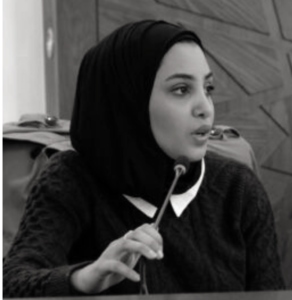
Haneen Al-Zaben
Haneen Al-Zaben is the Programme Officer of women human rights operations in Jordan for Kvinna till Kvinna foundation. Whilst actively engaged in women and gender settings in her country, Haneen worked on various projects along with civil society organizations at the grass-root level to combat current discriminatory against women and advocating for a democratic society where all are equal. Advocating and shedding lights on the vital role Jordanian women play in decision making, refreshing economic, and building peace when empowered to occupy political positions. Moreover, assisting in linking local actors with the international community through addressing women concerns using various universal human rights instruments (i.e. CEDAW, UPR…) seeking for better legislations ad gender equality.
Participant in: December 2018 Fellowship: Peacebuilding and Women’s Meaningful Participation in Peacebuilding Processes
Shatha Qteshat
Shatha Qteshat is the Director of Community Development, International Relations and Projects at the General Union of Societies in Amman, Jordan. She has coordinated multiple projects including an initiative to support women’s inclusion in community empowerment, which helps to provide better basic services for underprivileged families. She also established a safe space centres for survivors of gender and sexual based violence. Shatha has been involved with multiple projects and organisations based around humanitarian assistance, women’s empowerment and community development and has held managerial and officer positions at General Union of Charitable Associations, UNICEF and CARE International all based in Jordan. She has a Bachelor of Public Administration from Yarmouk University – Jordan.
Participant in: December 2018 Fellowship: Peacebuilding and Women’s Meaningful Participation in Peacebuilding Processes
Rita Matar
Rita Matar is a Peace Building Coordinator for the UNDP Mechanism for Social Stability Component of the Peace Building Project in Lebanon. In her work she supports local level conflict-resolution, building mechanisms for social stability and sustainable peace building. Prior to this, Rita was a Training Program Associate at Expand Your Horizons, a project funded by USAID, and a Field Coordinator at UNDP.
Participant in: December 2018 Fellowship: Peacebuilding and Women’s Meaningful Participation in Peacebuilding Processes
Naziha Arebi
Naziha Arebi is a documentary filmmaker and photographer. Her films focus on telling human stories as a tool to instigate discussion and change, often with a focus on gender. She has directed and produced a number of documentaries on a range of topics, for example the female candidates in Libya’s first election and educational shorts on the Libyan Constitution and Reconciliation process. Naziha has worked for the BBC and Aljazeera and frequently works with Oxfam, Hivos and UN Women. Her photographic work as been exhibited around the world and has been published online and in print at a range of media outlets, including Le Monde. Naziha is a member of the Libyan Women’s Platform for Peace.
Participant in: November 2016 Fellowship: Peacebuilding and Women’s Meaningful Participation in Peacebuilding Processes
Rania Ali
Rania Ali is a Syrian Journalist and Filmmaker who has been based in Vienna, Austria, since 2016. Rania worked on filming the award-winning documentary ‘Escape from Syria’, which was published by the Guardian. She has also written several articles with a focus upon refugees and host communities. She currently works with several NGOs, including Swiss NGO Terre Des Hommes, as a journalist and advocate. She also presented at TEDxParis in 2017, and the annual TechFugees event.
Participant in: December 2018 Fellowship: Peacebuilding and Women’s Meaningful Participation in Peacebuilding Processes
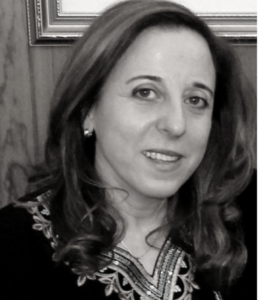
Huda Nassar
Huda Nassar is the Director for the Middle East at the Awareness Foundation, a Christian charity founded under the patronage of the Archbishop of Canterbury in 2003 to, among other things, build up understanding between the East and the West and strengthen and sustain Christians in the Middle East. Huda’s work involves developing bridge-building projects between the West and the Middle East. Since the conflict began in Syria, Huda has developed a ground-breaking initiative to train young people as Ambassadors for Peace in their communities. Since the launch of this project in 2014, over 100 youngSyrians have already been trained. Huda is working to extend this initiative to the rest of the Middle East. Huda is responsible for the development and implementation of all Awareness Foundation initiatives in Syria, Lebanon, Jordan and Palestine, assisted by a highly qualified group of consultants. Previously, Huda studied at Birmingham University where she earned her MA in Pastoral Theology.
Participant in: December 2018 Fellowship: Peacebuilding and Women’s Meaningful Participation in Peacebuilding Processes
Sana Kikhia
Sana Kikhia is the Co-Founder and Executive Director of Sanad Group for Aid and Development, an NGO that helps support Syrians by economically empowering men and women by offering zero-interest loans, contributing to the economic recovery of the country by supporting local investments, decreasing aid dependency, increasing opportunities for Syrians to find a sustainable source of income and reducing the number of civilians engaged in armed conflict by offering an alternative source of income. Sana is involved in activist and volunteer based initiatives in London, she co-founded Diaspora Exchange Initiative which brings together Syrians living in the UK and connects them with activists from other countries affected by conflicts – which runs in partnership with Amnesty International and Common Purpose. She also is a strong advocate of Syrian rights and supports and organises events with Syria Solidarity UK, APPG Friends of Syria among other organisations. Sana has an MSc in Global Project Management from the University of Essex, UK and a BSc in Communications and Electronics Engineering from the University of Al-Ba’ath, Syria.
Participant in: December 2018 Fellowship: Peacebuilding and Women’s Meaningful Participation in Peacebuilding Processes
Sonia Ben Miled
Sonia Ben Miled is the Women, Peace and Security Programme Manager at the Tunisian NGO Aswat Nissa, whose mission is to integrate gender into public policy in Tunisia. Through her work with Aswat Nissa, Sonia has participated in all the stages of the preparation of the Tunisian 1325 National Action Plan. Sonia was previously involved in an advocacy campaign on the equal representation of women in political parties and in political parties’ electoral lists for the municipal elections. Sonia is part of the program Young leaders by the German Foundation Friderich Ebert. She took part in many trainings on women’s political participation led by Aswat Nissa and other organizations, namely a journalistic training on legal issues and the functioning of State institutions given by Barr Al Aman in partnership with CFI – Agence de coopération des medias, a communication training led by BBC Media Action, and a UN Women training on result-based management. Sonia published articles on women’s political participation in the HuffPost Tunisia and on Aswat Nissa’s website. Sonia holds a degree in English Civilization and Literature and a Master in Communication from l’Institut Supérieur des Langues de Tunis.
Participant in: December 2018 Fellowship: Peacebuilding and Women’s Meaningful Participation in Peacebuilding Processes
Shahrazad Magrabi
Shahrazad Magrabi is the Executive Director of Libyan Women Forum (LWF), a local Libyan civil society organization for women’s empowerment. Shahrazad is a passionate advocate for the active engagement of women in both public and private spheres, and gender equality. She has implemented several political and economic empowerment training programs through LWF. LWF’s first project dealt with the issue of the disarmament, demobilization and reintegration (DDR) of militia fighters in Libya. Shahrazad was among the 13 women selected for the National Preparatory Dialogue Commission established by the government of Prime Minister Ali Zeidan in January 2014. She also collaborated with the UN Mission in Libya in preparing for the conference of women’s agenda for peace in 2015.
Participant in: August 2016 Fellowship: Peacebuilding and Women’s Meaningful Participation in Peacebuilding Processes
Weaam Youssef
Weaam Youssef, Researcher and Syrian human rights Activist, who holds an MA in Applied Human Rights from the University of York as a chevening scholar, had done several fellowships on issues related to forced migration and refugee studies at the University of Oxford, Migration policy at the European University Institute. She also holds and BA in English Literature from Damascus University and currently pursuing her degree in Humanitarian Diplomacy. Prior to joining Gulf Centre for Human Rights as a Human Rights Officer, she worked for the Arab League in Egypt, United Nations and United Nations Development Programme in Syria. She was also Syria country coordinator for Follow the Women for peace and women empowerment in MENA conflict areas. She has extensive experience in migration and human rights, having worked for intergovernmental organisations such as the UN, the Arab League, cooperating with the African Union Commission as well as civil society organisations. She has also spoken and presented at meetings such as the Global Forum for Migration and Development and the UN Migration Coordination Annual Meeting at the UN HQ, and has contributed to the Global Migration Group CMG thematic report on youth and migration and been acknowledged for coordinating the section on Arab youth for the UN Youth Annual Report. Her research focuses on issues related to human rights, humanitarianism and displacement post-conflict.
Participant in: August 2016 Fellowship: Peacebuilding and Women’s Meaningful Participation in Peacebuilding Processes
Jela Keyany
Jela Keyany is a programme coordinator at the Erbil office of Bahar Organisation. She is responsible for the organisation’s response strategy in Iraq. Prior to this Jela was a protection associate at the UNHCR Coordination Office in Erbil, a cooperation and capabilities analyst at the Joint Crisis Coordination Centre in Erbil, a programme manager and developer at Emma Organisation for Human Development. She holds an LLM in International Public Law from the University of Amsterdam and a LLB from the University of Utrecht. Her areas of expertise are in genocide prevention, international humanitarian law, sexual and gender based violence and community protection.
Participant in: December 2018 Fellowship: Peacebuilding and Women’s Meaningful Participation in Peacebuilding Processes
Taban Shoresh
Taban Shoreshis the founder and CEO of the NGO the Lotus Flower which she founded in 2016. Her organisation offers support to displaced female victims of conflict in the Middle East. The organisation has three centre in Kurdistan which help vulnerable females access education and helps them with their wellbeing and mental health, which in turn helps refugee women reintegrate back into their communities.
Participant in: December 2018 Fellowship: Peacebuilding and Women’s Meaningful Participation in Peacebuilding Processes
Pascale Warda
Pascale Warda is the president of the Hammurabi Human Rights Organization, which won the U.S. Department of State’s 2012 Human Rights Defenders Award. She was the minister of migration and displacement in the Iraqi Interim Government and one of only six women in the 32 member interim Iraqi Council of Ministers, which operated following the transfer of power from the Coalition Provisional Authority in 2004. A Chaldean Catholic and ethnic Assyrian, she was born in Dahuk but later exiled to France; there and later in Syria she worked with the Assyrian Democratic Movement. After returning to Iraq in 2001, she served for three years as the head of the Assyrian Women’s Union. She has also served as external affairs manager for the Assyrian Aid Society-Iraq and co-founded the Iraqi Women’s Centre for Development in Baghdad. She holds an M.A. in human rights studies from the Catholic University of Lyon.
Participant in: December 2018 Fellowship: Peacebuilding and Women’s Meaningful Participation in Peacebuilding Processes
Sarah Hasan
Sarah Hasan is a Project Coordinator on the Women Voices project at Internews, she is based in Erbil, Iraq. She has 10 years of experience working as a social worker, case manager and mediator working with women, refugees and vulnerable and minority groups. Prior to her current position at Internews, she has worked at a number of organisations including; FHI 360, Almesella Organisation and Heartland Alliance and IRC, all based in Erbil, Iraq. She holds a BA Hons in Sociology from the University of Salahaddin.
Participant in: December 2018 Fellowship: Peacebuilding and Women’s Meaningful Participation in Peacebuilding Processes
Talar Demirdjian
Talar Demirdjian was born in an Armenian family, in Beirut, Lebanon, and has lived there most of her life, with brief stints in London and Cairo, respectively. She’s a graduate of King’s College London, with an MA in Terrorism, Security, & Society. She’s worked in various organizations, on topics ranging from Migrant Domestic Worker Rights, Digital Security, LGBTIQ+ Rights, and Gender Based Violence. Some of her experiences include monitoring and evaluation, project management, research and report writing, business development, youth-involved community development, as well as working in start-up environments.
Participant in: December 2018 Fellowship: Peacebuilding and Women’s Meaningful Participation in Peacebuilding Processes
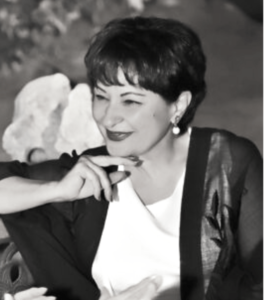
Dr. Guita Hourani
Dr. Guita Hourani is the Director of the Lebanese Emigration Research Centre (LERC) and Assistant Professor at the Faculty of Law and Political Science at Notre Dame University. She is also Co-Founder, Director of the International Campaign, and the Secretary-General of Lebanon Dialogue Initiative. She has a Ph.D. from the Graduate School of Global Studies, Tokyo University of Foreign Studies in Japan. She is presently Country of Origin Information Expert on Lebanon for the Fahamu Refugee Programme Oxford, England and Member of the Committee for Women Political Empowerment, Lebanon among others.
She was a Fellow of the Civic Education and Leadership Fellowship program at the Maxwell School of Citizenship and Public Affairs of Syracuse University in New York and a Fellow at the Institute of Christian Oriental Research at the Catholic University of America in Washington, D.C, USA. She also served as a member of the Migration Expert Committee of the Directorate of Migrants at the Lebanese Ministry of Foreign Affairs and a member of the UNDP National Academic Working Group on Migration in Lebanon. She was an International Development Consultant at the World Bank in Washington, D.C. While in the USA, she pioneered a course on the role of women in war, peace and conflict resolution and lectured on it in various universities and institutions.
She co-edited and published with Dr. Rita Stephan and Dr. Cornelia Horn a memorial volume dedicated to the late Professor Rita Sabat (1974 – 2013) entitled “In Lin with the Divine”: the Struggle for Gender Equality in Lebanon (2015). She is the author of Understanding Socioeconomic and Political Mobility of Naturalized Kurds in Lebanon (2018) and The Impact of the Summer 2006 War on Migration in Lebanon: Emigration, Re-Migration, Evacuation, and Returning (2006). She co-edited with Mario Najm and Jasmin Lilian Diab Proceedings of the Dialogue and Best Practice Forum: Peace, Stability, and Prosperity–The Case of Serbia and Kosovo (2017) and co-edited with Jasmin Lilian Diab Dialogue and Best Practice International Forum: History, Geography, Reconciliation–The Case of Northern Ireland (2019).
Dr. Hourani has conceptualized, designed methodologies, implemented and written final reports on projects related to migration, refugees, socioeconomic mobility, political participation, human insecurity, integration policies, dialogue, and access to information.
Among her current research projects a study on Lebanese women migrant returnees and their political participation and a study on the role of the Lebanese political parties in the diaspora.
Participant in: December 2018 Fellowship: Peacebuilding and Women’s Meaningful Participation in Peacebuilding Processes
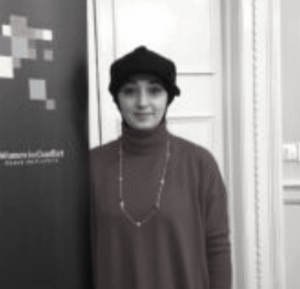
Muzhda Azeez
Muzhda Azeez teaches at Salahddin Univesity in the Social Work Department, focussing on topics such as gender equality, child and family law, and social work. Muzhda is also a member of the committee working to establish gender equality research at the University. Prior to this, Muzhda was a Programme Officer at the Kvinna till Kvinna Foundation in Erbil, Iraq, where she worked on projects with a focus on gender-based violence, UNSCR 1325, peace-building, and community-level capacity-building. Muzhda also monitored activities aimed at building knowledge and capacity around financial independence, and social and legal support.
Participant in: December 2018 Fellowship: Peacebuilding and Women’s Meaningful Participation in Peacebuilding Processes
Narmen Salahi
Narmen Salahi is the Government Coordinator for INMAA for Development, an NGO based in Kirkuk. She works directly with parliamentarians in this role and has coordinated and attended a round table discussion with parliamentarians and academics on the conflict in the region, and how to build peace. Prior to this Narmen was a Monitoring and Evaluation Officer for International for Monitoring and Evaluation. Narmen obtained a diploma in Islamic Studies and German as a foreign language at the Ruprecht University Heidelberg, in Heidelberg, Germany.
Participant in: November 2016 Fellowship: Peacebuilding and Women’s Meaningful Participation in Peacebuilding Processes
Elsa Saade
Elsa Saade is a social and political activist working in the fields of humanitarian assistance and capacity building. Elsa is a Human Rights Officer at the Gulf Centre for Human Rights, where she works to support women human rights defenders and promotes freedom of expression and peaceful assembly. She is active in Lebanese civil society movements, engaging in campaigns specifically related to women’s rights, war reconciliation, observing elections, youth leadership, and peace building.
Participant in: March 2017 Fellowship: Peacebuilding and Women’s Meaningful Participation in Peacebuilding Processes
Maha Nassar
Maha Nassar spent four years studying Arabic literature in Syria and later moved to Egypt to study theology at the Evangelical Theology Seminary in Cairo. She received a degree in theology, the first woman ever to receive one there. She is am responsible for the provision of humanitarian aid for the National Evangelical church in Lattakia, Syria, where she is the first female Elder. She is also a volunteer for the Awareness Foundation, and has played a significant role in the establishment of their “Ambassadors for Peace” programme.
Participant in: August 2016 Fellowship: Peacebuilding and Women’s Meaningful Participation in Peacebuilding Processes
Shahrazad Odeh
Shahrazad Odeh is a human rights defender and researcher. She currently works with the Public Committee Against Torture in Israel as a freelance attorney and lecturer. Whilst working there, she has introduced a gender sensitive approach to the documentation of torture, which is now used throughout the organisation’s work. Shahrazad also provides legal consultation for families with disabled children; and holds a research position at the Hebrew University of Jerusalem. Here, she obtained her LLM in Public International Law and Gender Studies in 2015. Shahrazad’s research focuses on the legal rights of children and the status of Palestinian women; topics that she has been working on with a number of institutions, such as MAKAN, the Palestinian Rights Studies Centre, in London, UK. Shahrazad has testified in front of the Israeli parliament and the European Union on human rights violations during the 2014 military operations, and violations of due process and the excessive use of force by the Israeli military and police in the arrest and detention of Palestinian youth. In addition, Shahrazad is legal advisor and spokeswomen for Taita Leila, an organisation that aims to empower Palestinian women.
Participant in: November 2016 Fellowship: Peacebuilding and Women’s Meaningful Participation in Peacebuilding Processes
Majeda Korbane
Majeda Korbane is a social worker and women’s rights activist. She was a member of Ornamo Organisation for Justice and Human Rights and conducted research documenting cases of hostages with a particular focus on women and children. She was also a member of Musawa Women’s Studies Center, which works with female Syrian refugees on economic empowerment, their rights and developing their capacity to participate in peace building efforts. Majeda is also a member of the Syrian Women’s Initiative for Peace and Democracy.
Participant in: June 2017 Fellowship: Peacebuilding and Women’s Meaningful Participation in Peacebuilding Processes
Jihan Sindi
Jihan Sindi is an advisor to the Presidency of the Council of Ministers of Kurdistan Regional Government, Iraq. She obtained a Master’s in International Peace and Conflict Resolution in 2003, and took part in the Leaders in Development programme at Harvard University in 2009. Jihan is a Member of the KRG’s High Commission for Revitalisation, as well as a Member of the Board of Directors for ITV (Iraq Satellite TV). She has acted as the contact and coordinator person between the Council of Ministers of KRG and a number of foreign representations in the region, such as the Korean Army and US Regional Reconstruction Team. Jihan has also assisted in the supervising and organising of capacity building programmes for employees of the KRG.
Participant in: November 2016 Fellowship: Peacebuilding and Women’s Meaningful Participation in Peacebuilding Processes
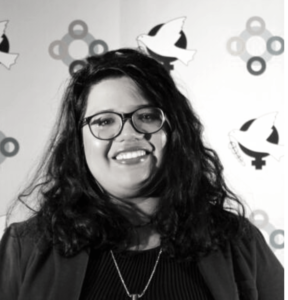
Inas Miloud
Inas Miloud is an activist and researcher focusing on indigenous rights and the involvement of women in peace and political processes. She currently works as project manager and research coordinator for a policy brief on “Women, Peace and Security from Libyan Women’s Perspective”, for the 1325 Network in Libya and the Together we build it Initiative. The report aims to identify the security priorities through the lens of women’s lived realities. Inas is also the lead coordinator for the 1325 Network in Libya, where she worked amongst others on projects relating to violence against women during conflict. Further, Inas is the co-founder and director of Tamazight Women’s Movement, an organisation dealing with the intersection of gender, race and ethnicity amongst indigenous populations. Prior to this, Inas has worked as Protection Officer in Dhyba Refugee Camp, Tunisia; has engaged with displaced people communities as a Vulnerable Case Support Officer at Mercy Corps Libya; and has provided consultancy to a number of organisations including the UNDP. Inas has recently obtained a Master’s in North African Feminism from the Minnesota State University in Mankato, MN, US, and has obtained an undergraduate degree in English Literature from the University of Nafusa Mountains, Yefren, Libya.
Participant in: November 2016 Fellowship: Peacebuilding and Women’s Meaningful Participation in Peacebuilding Processes
Mariela Shaker
Mariela Shaker is a violinist, and is currently studying towards a Masters degree in music at DePaul University in Chicago. She started playing the violin at the age of 10, when she joined the Arabic Institute of Music in Aleppo in 1999, graduating with distinctions in 2004. She took part in many concerts and festivals in Syria, including at the St Ephrem Syriac Orthodox Cathedral. In 2013, she received a scholarship to study at Monmouth College in Illinois, where she went on to receive a bachelors in Music Performance, and also served as concert master for the Monmouth College Chamber Orchestra. In 2015, she gave a recital at the Kennedy Centre, and has has also performed at the White House, the Pentagon, the United Nations, and the Arab American Institute.
Participant in:
August 2016 Fellowship: Peacebuilding and Women’s Meaningful Participation in Peacebuilding Processes
August 2019 Fellowship: The Arts as a Tool for Peacebuilding
Kholoud Htewash
Kholoud Htewash is the communications director and executive board member of The Voice of Libyan Women, a youth-led organisation that aims to improve the political participation and the economic empowerment of women in Libya and advocates against gender-based violence. Kholoud is responsible for managing all media and communication pertaining to the organisation, and supports the staff and board members in their activities. In 2013, Kholoud obtained an undergraduate degree in Web Design and Development from Abertay University in Dundee, UK, and is currently reading for an MSc in Strategic Communication and Public Relations at Queen Margaret University in Edinburgh, UK.
Participant in: November 2016 Fellowship: Peacebuilding and Women’s Meaningful Participation in Peacebuilding Processes
Abida Kakar
Abida Kakar is a team leader at Women for Peace and Participation (WPP) based in Kabul. She has extensive experience working with a number of national and international NGOs and organisations including USAID and the UNDP. At the UNDP office in Kabul, she was the first female “National Professional Officer”. Under her management she always ensures women are treated equally. Her expertise and interests are in international development programme design and implementation, human resources management, women and youth empowerment, capacity building and gender equality. Her aim is to provide support to women and youth at all levels to step up and express their rights for the betterment of themselves, families, societies and at the end for their country.
Participant in: August 2018 Fellowship: Peacebuilding and Women’s Meaningful Participation in Peacebuilding Processes
Ayse Bingol
Ayse Bingol is a lawyer and human rights defender. She has brought a number of cases before the Constitutional and Supreme Court of Turkey, as well as the European Court of Human Rights. Ayse also works with internally displaced persons in Turkey and provides pro-bono legal assistance to survivors of gender-based violence. In 2011, she obtained a LLM in Human Rights at Queen Mary University in London, UK, and obtained an undergraduate degree from the Faculty of Law at Istanbul University in Istanbul, Turkey, in 2002. In addition to her legal work, Ayse has carried out consultancy work for institutions such as Open Society Justice Initiative, Economic and Social Research Centre and Democratic Progress Institute, and is a founding member of the Peace Foundation (Baris Vakfi), which advocates for a peaceful resolution of the Kurdish question.
Participant in: November 2016 Fellowship: Peacebuilding and Women’s Meaningful Participation in Peacebuilding Processes
Esra Elmas
Esra Elmas is the Turkey Programme Co-ordinator at the Democratic Progress Institute. Esra is the co-founder of Istanbul Bilgi University for Conflict Resolution Studies and Research. She is also a PhD student in Political Science at Écoles des Hautes Études en Sciences Sociales. She has an MA degree in Cultural Studies, and her publications cover areas such as Turkish modernization, internal migration, civil-military relations, and the history of Turkish media.
Participant in: August 2016 Fellowship: Peacebuilding and Women’s Meaningful Participation in Peacebuilding Processes
Nadine Gerges
Nadine Gerges works for Youth with a Mission (YWAM) in Northern Ireland, working with young refugees on forgiveness and reconciliation. She has assisted in the organisation of faith and conflict conferences in Lebanon with NGOs working with refugees. Prior to this, she worked with young Syrians, Lebanese and Palestinians in Lebanon and as a Facilitator and translator for Humedica International Aid in the Syrian refugee camp in the Bekaa Valley, Lebanon.
Participant in: August 2016 Fellowship: Peacebuilding and Women’s Meaningful Participation in Peacebuilding Processes
Razan Ghazzawi
Razan Ghazzawi is a freelance researcher and journalist. Razan received a Chevening scholarship to complete a Master’s degree in Gender, Sexuality and the Body at the University of Leeds. Her research focuses on sexuality politics in the context of the ‘refugee crisis’ in the West. She will be commencing a PhD at the Centre for Gender Studies at Sussex University in 2017 on a similar topic. Razan has co-authored several research reports, amongst other things on the role of women’s peace activism in Syria. Further to her work as a researcher, Razan has been a freelance journalist and blogger since 2007. She has produced several reports for a number of media outlets such as Now Lebanon and ARTE. She worked as a Media Officer at the Syrian Center for Media and Freedom of Expression in Damascus, Syria, and has worked with the Institute for War and Peace Reporting in Gaziantep, Turkey. In addition, Razan is currently working with the US based foundation Free Syria.
Participant in: November 2016 Fellowship: Peacebuilding and Women’s Meaningful Participation in Peacebuilding Processes
Dr. Sanaa Alsarghali
Dr. Sanaa Alsarghali is the co-founder and director of the Constitutional Studies Center. She is the 9th member of the Palestinian drafting committee appointed by the Palestine Liberation Organization legislative arm; the Palestinian National Council in 2019. In July 2020 UNESCO approved the appointment of Dr. Alsarghali as the new holder of UNESCO Chair on Human Rights, Democracy and Peace hosted by An-Najah University. Sanaa Alsarghali was previously a Lecturer at An-Najah Law School in Palestine. She was awarded a full scholarship from An-Najah University to study for a PhD in Constitutional Law in order to participate in constitutional building in Palestine. Sanaa’s PhD thesis focused on the presidential concentration of powers within the Palestinian Basic Law. In 2016 Sanaa was elected as the Chairwoman of TAM, an NGO that intends to change the stereotypical image of the Palestinian women in the Media. She is the youngest Chairwoman of an active NGO in Palestine. Previously, she worked as a TV presenter on Al Fajer TV. Her social and political talk show ‘Tam Time’ was screened on the Palestinian National TV for two years. Sanaa also helped in producing several documentary movies that focused on the protection of social rights.
Participant in: August 2016 Fellowship: Peacebuilding and Women’s Meaningful Participation in Peacebuilding Processes
Atiaf Alwazir
Atiaf Alwazir is a researcher, human rights activist, citizen journalist and blogger, and co-founder of the media advocacy group Support Yemen. She has a Master in International Relations from American University, and her dissertation focussed on women in prison in Yemen. Since 2011, she has chronicled the revolution in Yemen on her blog, ‘Woman from Yemen’. She also has many years of experience of campaigning for social justice programmes in the Middle East and North Africa. She was born in Sana’a and grew up in the USA, and in Egypt. Her father is Zaid Ali Alwazir, a Yemeni scholar, who produced a large number of publications on political Islam. Atiaf additionally has several years of experience in research and education and is currently an Instructor and Academic Advisor at American University.
Participant in: August 2016 Fellowship: Peacebuilding and Women’s Meaningful Participation in Peacebuilding Processes
Reem Assil
Reem Assil is the Co-Founder of Makani Cambridge and Managing Director of Reem Assil LTD. She previously served as Chair of the Syrian Platform for Peace, an open platform aiming to promote and build peace among Syrians. She is a member of several Syrian opposition bodies and has worked on the coverage of and communication with Syrian activists on the ground. Since early 2016, Reem has been a PhD candidate at the Centre of Religions for Reconciliation and Peacebuilding at the University of Winchester, UK, studying peace education and religious reconciliation. Previously, she obtained a Master’s in biotechnology from the University of Damascus, Syria, and was a PhD candidate in immune-parasitology at the University of Montpellier, France – a study, which was interrupted due to the conflict in Syria. Further, Reem is working as a translator and is co-founder and manager of Free Syrian Translators.
Participant in: November 2016 Fellowship: Peacebuilding and Women’s Meaningful Participation in Peacebuilding Processes
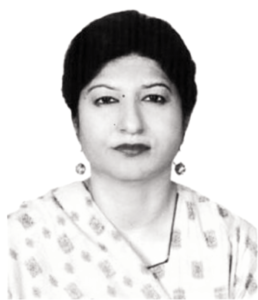
Dr. Shaheen Akhtar
Dr. Shaheen Akhtar is a Professor in International Relations and Editor of Journal of Contemporary Studies at the Faculty of Contemporary Studies, National Defence University in Islamabad. Her areas of expertise are conflict resolution and peacebuilding in South Asia, foreign policy of major powers, and non-traditional security: energy, water, climate change and gender issues in South Asia. She has published a number of papers regarding peacebuilding and Kashmir. She is also part of the Kashmir Initiative Group (KIG) which aims to bridge the gap between local communities and policy makers.
Participant in: August 2018 Fellowship: Peacebuilding and Women’s Meaningful Participation in Peacebuilding Processes
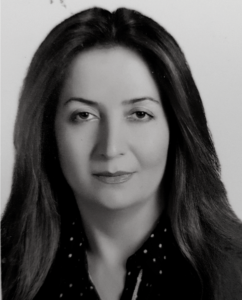
Asmaa Al Ameen
Asmaa Al Ameen is the General Director and Project Manager at INMAA Organization for Development. INMAA is a civil society organization that implements different programs at grassroots level aimed at attaining sustainable development. Prior to this, Asmaa was a Co-ordinator at the UN Iraq Operations Centre (UNOPS), where she was involved in a series of projects related to the National Dialogue and Reconciliation Programme and general civil society development initiatives in Iraq. An expert in capacity building and organisational development, Asmaa has advised over 15 regional and national Iraqi NGOs working to combat torture and human rights violations. She is also an accomplished trainer having run courses on project management, conflict resolution and the protection of human rights for the non-profit sector and the police forces in Iraq.
Participant in: August 2016 Fellowship: Peacebuilding and Women’s Meaningful Participation in Peacebuilding Processes
Dr. Sawsan Al Refai
Dr. Sawsan Al Refai is an expert in Public Policy and Advocacy. She managed and provided support to government, civil society organizations, United Nations and international organizations in the Arab region and East Europe in areas of gender/Human rights based policy and advocacy. She has extensive experience working in humanitarian settings and emergencies. Dr. Al-Refaei is founding member of the Arab Network for Civic Education in the Arab region. She is also a member of the Yemen Pact for Peace and Security, a Yemeni women movement working on women & security issues. Dr. Al Refai holds a Master’s degree in health policy, planning and financing, from London School of Economics, a diploma in population and gender studies from University of Costa Rica, and she is a qualified trainer in human rights and gender mainstreaming and gender auditing.
Participant in: May 2018 Fellowship: Peacebuilding and Women’s Meaningful Participation in Peacebuilding Processes
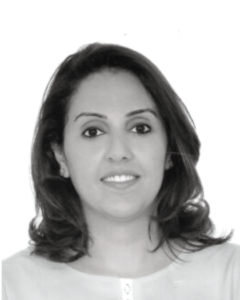
Khulood Al Saidi
Khulood Al Saidi has over 12 years of experience in managing and coordinating sustainable and humanitarian projects in the Middle East and North Africa, with a focus on peace-building, conflict transformation, and reconciliation. She is currently a Team Leader at Peace Paradigms. She has served as Women, Peace and Security Programme Manager at Beyond Borders Scotland and as a programme officer at Interpeace in Tunisia where her work focuses on peace building and reconciliation in Libya. Her previous work has focused on managing and coordinating sustainable and humanitarian projects in the realm of reconciliation and peacebuilding, media, health, capacity building, and women’s empowerment. She has a range of experience working for local and international NGOs and CSO including, Interpeace, UNDP – Libya, DCA Libya, BBC Media Action – Tunisia, Tamkeen for Development, Progressio and USAID.
Participant in: May 2018 Fellowship: Peacebuilding and Women’s Meaningful Participation in Peacebuilding Processes
Roua Al Taweel
Roua Al Taweel is a PhD candidate at Ulster University specializing in transformative/transitional justice in Syria, with dual MA degree in Women’s and Gender Studies at the University of Hull. Her MA thesis was on ‘Critically Reading the Dominant Human Rights Discourses: Freedom of Movement in the Context of Syria Forced Displacement’. Human Rights in relation to forced displacement is an issue of concern on personal, academic, and professional levels. Roua has been in a direct contact with refugees and IDPs since 2006. It started in Damascus with Lebanese and Iraqis refugees as well as Syrian IDPs (as a result of the drought) and continued in Sudan where she worked with IDPs from Darfur. Another key experience was working with Syrian forced migrants in the hosting communities of Egypt and Turkey as well as the IDPs in northern Syria. Her scope of work varied from providing humanitarian aid and first-aid services, administration work, conducting surveys, facilitating youth and women empowerment programs and workshops, and working on project proposals. She was a Project Manager at the Syrian Women’s Network, and a Youth Empowerment Program Consultant at the International Medical Corps. She has also formerly worked as an aid work at the Syrian Arab Red Crescent, and a Peer Educator at Y-PEER.
Participant in: August 2016 Fellowship: Peacebuilding and Women’s Meaningful Participation in Peacebuilding Processes
Noha Al-Eryani
Noha Al-Eryani is the Executive Manager for the Humanitarian Forum – Yemen, which supports and develops civil society organisations, responding to disasters and emergencies and implementing humanitarian and development projects in areas such as health, education, and gender. Prior to joining the Humanitarian Forum – Yemen in 2011, Noha worked for the Yemeni Women’s Union on projects relating to women’s income generation and social accountability.
Participant in: March 2017 Fellowship: Peacebuilding and Women’s Meaningful Participation in Peacebuilding Processes
Mona Al-Maghafi
Mona Al-Maghafi is an experienced Human Rights and Development Professional with a demonstrated history of working in international human rights and humanitarian law, gender and health. She was a Human Rights Officer at the Office of the High Commissioner for Human Rights. Mona has contributed to the reporting portfolio of the country office, with a special focus on women and girls in armed conflict. She has also investigated allegations of human rights violations, and made contributions to regular international reporting. Mona recently drafted the women and child rights sections of the HRC report update on the situation of human rights in Yemen, pursuant to Resolution A/HRC/RES/30/18 (2015). Mona also was communications focal at OHCHR in Yemen, where she led the organization of a youth talent competition, where over 3,000 youth entered their videography, photography, and poetic works highlighting key human rights issues in Yemen as well as a Yemen Researcher at Amnesty International.
Participant in: August 2016 Fellowship: Peacebuilding and Women’s Meaningful Participation in Peacebuilding Processes
Beyond Borders Scotland Ltd. A Ltd company SC440453
ContactPrivacy Overview
| Cookie | Duration | Description |
|---|---|---|
| cookielawinfo-checkbox-analytics | 11 months | This cookie is set by GDPR Cookie Consent plugin. The cookie is used to store the user consent for the cookies in the category "Analytics". |
| cookielawinfo-checkbox-functional | 11 months | The cookie is set by GDPR cookie consent to record the user consent for the cookies in the category "Functional". |
| cookielawinfo-checkbox-necessary | 11 months | This cookie is set by GDPR Cookie Consent plugin. The cookies is used to store the user consent for the cookies in the category "Necessary". |
| cookielawinfo-checkbox-others | 11 months | This cookie is set by GDPR Cookie Consent plugin. The cookie is used to store the user consent for the cookies in the category "Other. |
| cookielawinfo-checkbox-performance | 11 months | This cookie is set by GDPR Cookie Consent plugin. The cookie is used to store the user consent for the cookies in the category "Performance". |
| viewed_cookie_policy | 11 months | The cookie is set by the GDPR Cookie Consent plugin and is used to store whether or not user has consented to the use of cookies. It does not store any personal data. |
